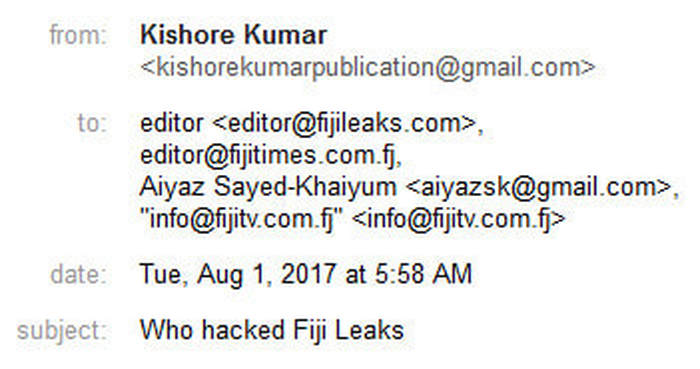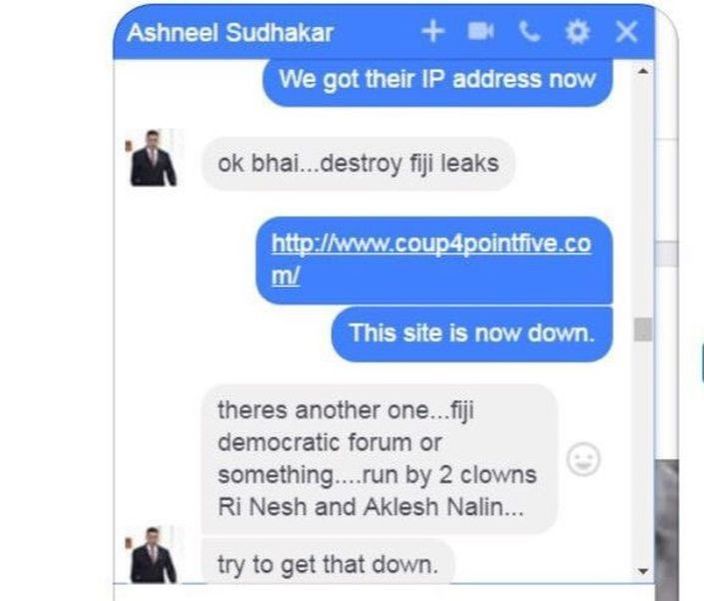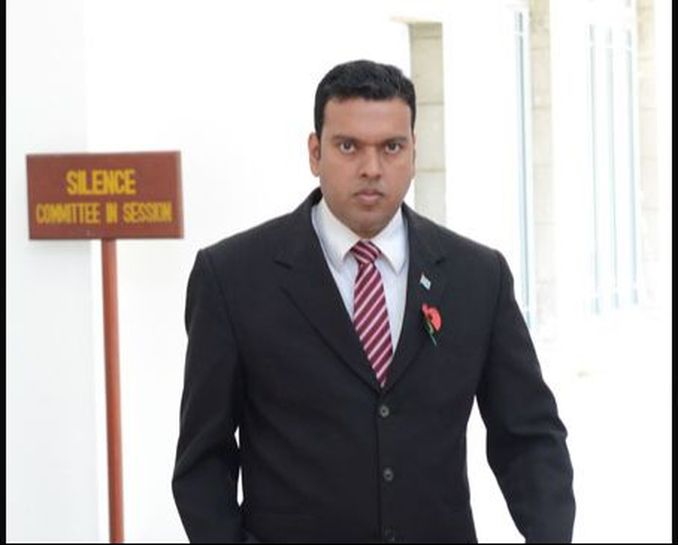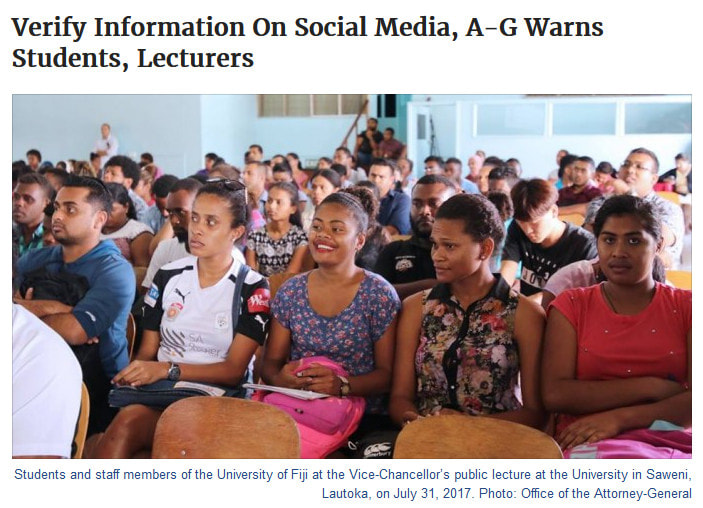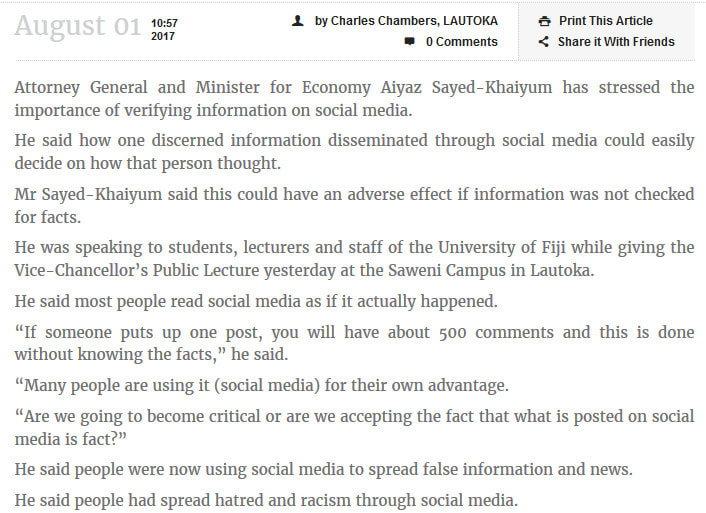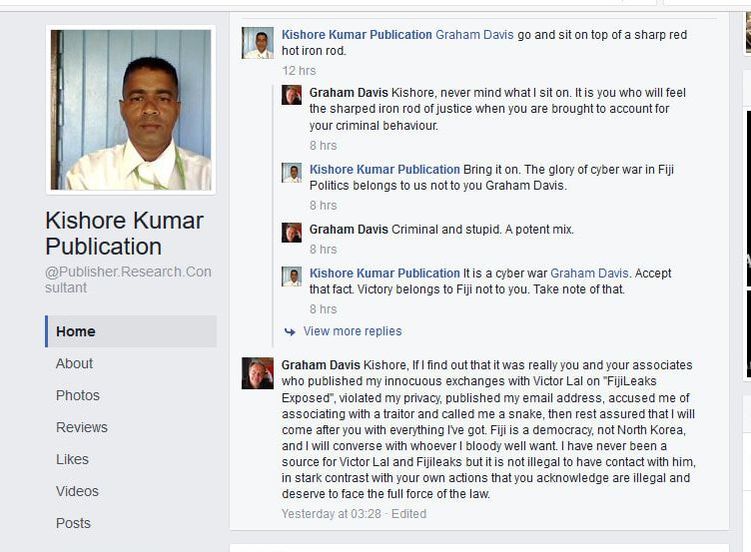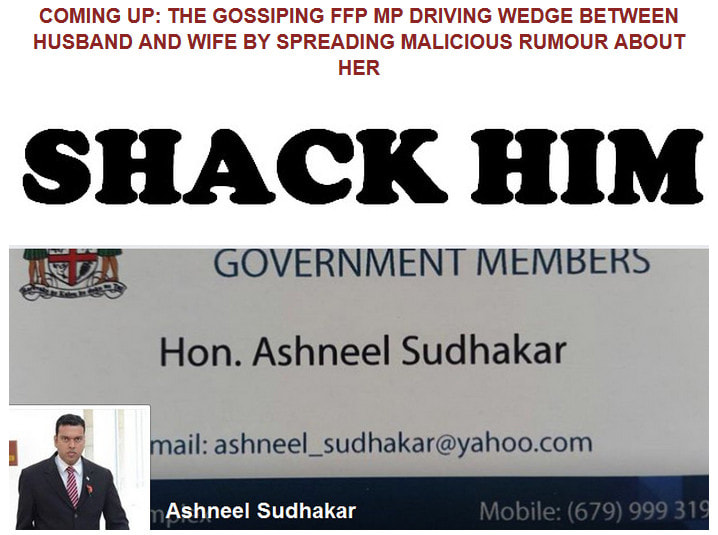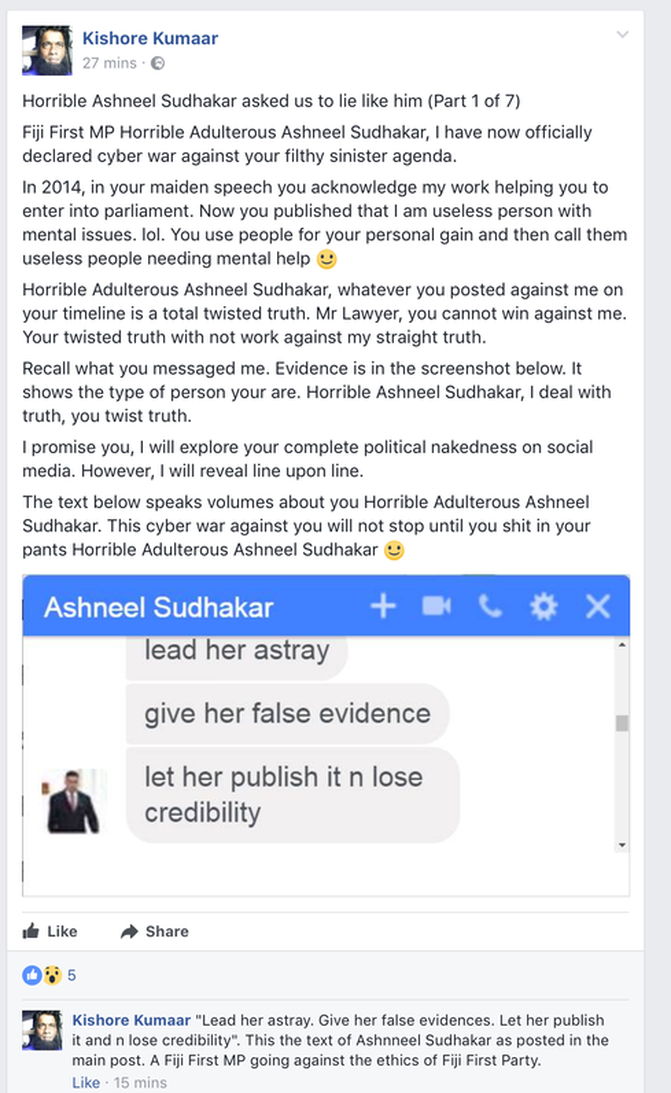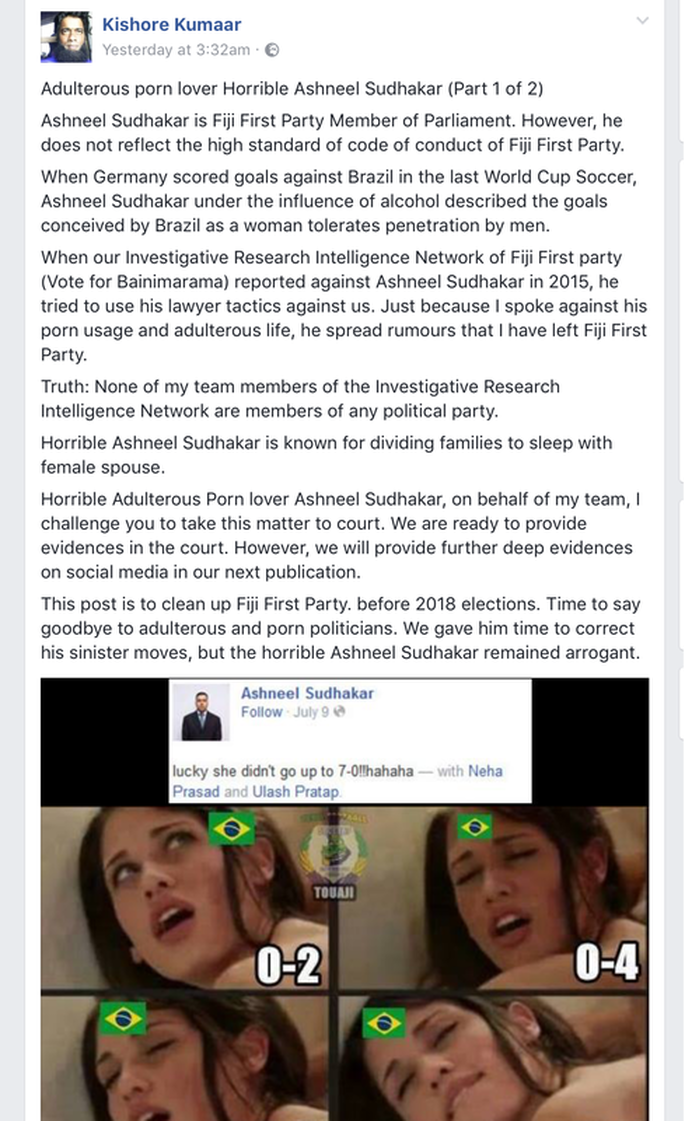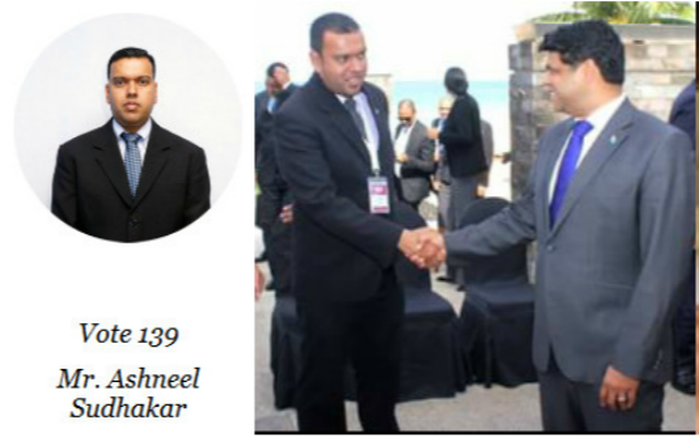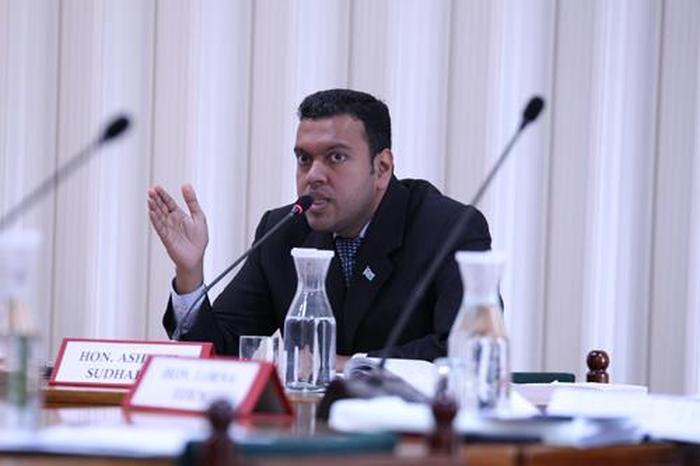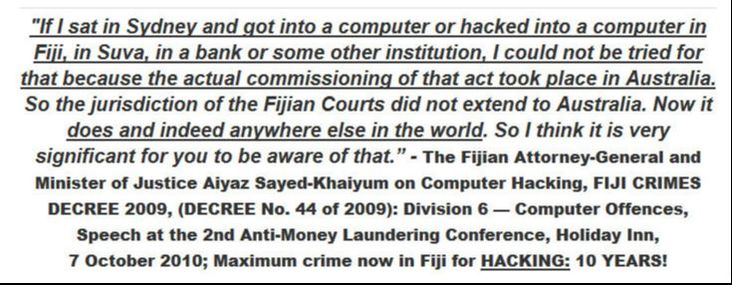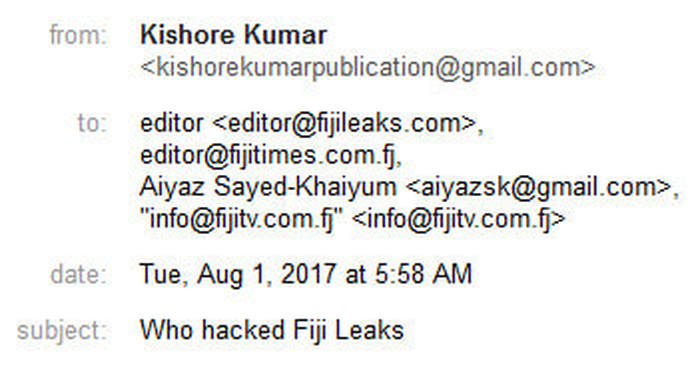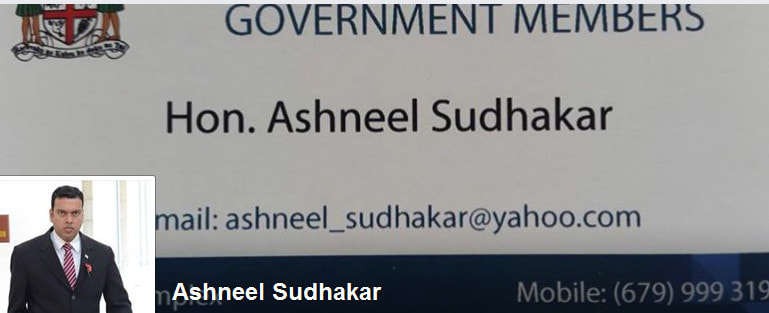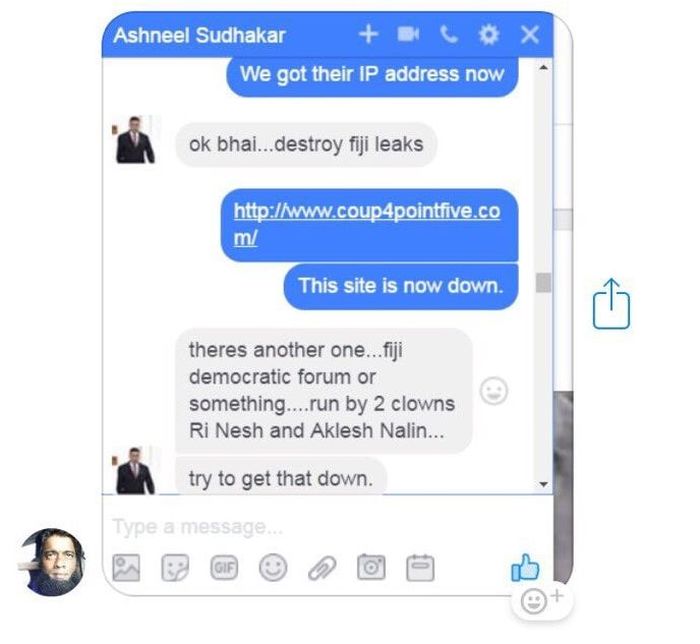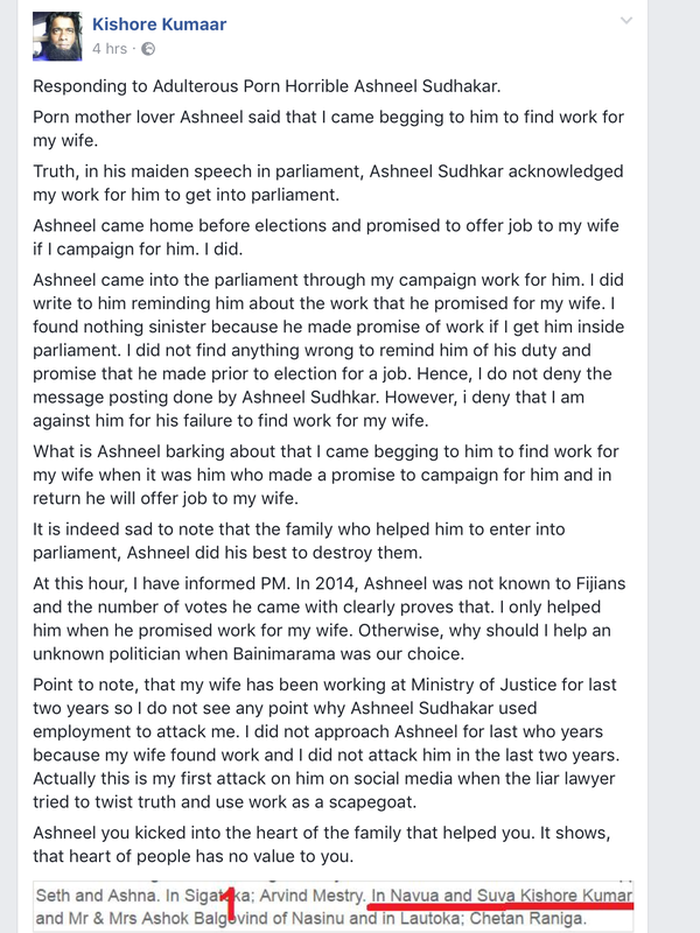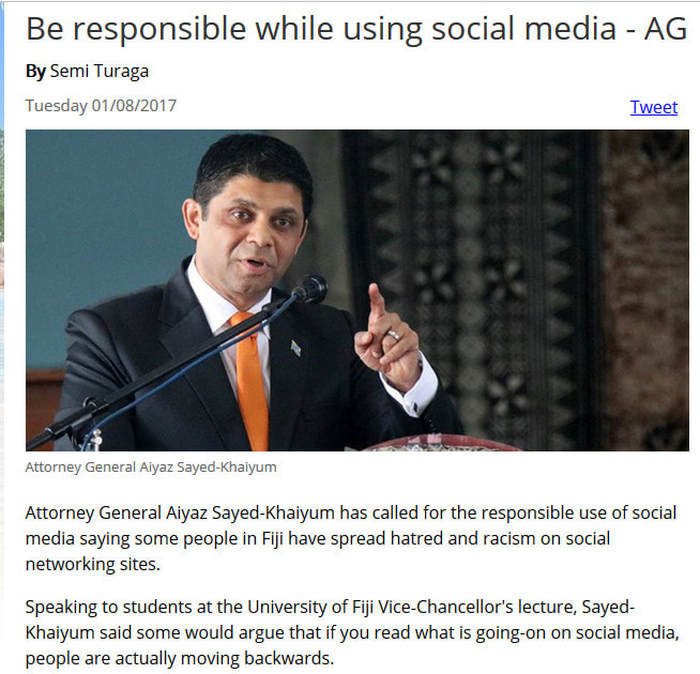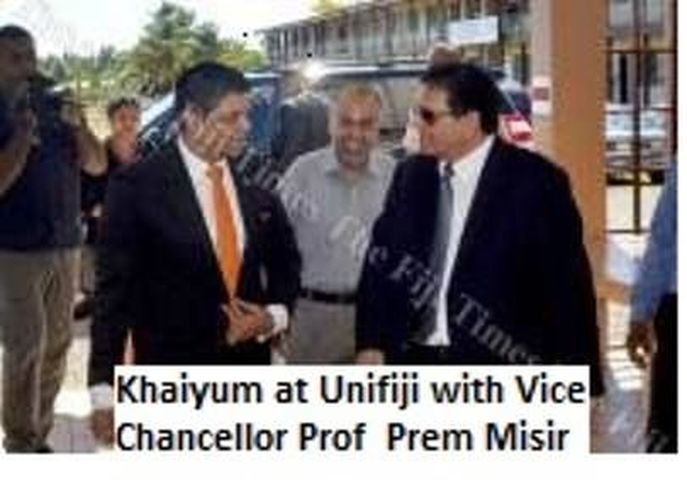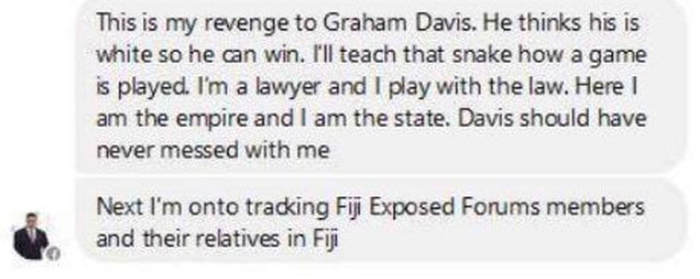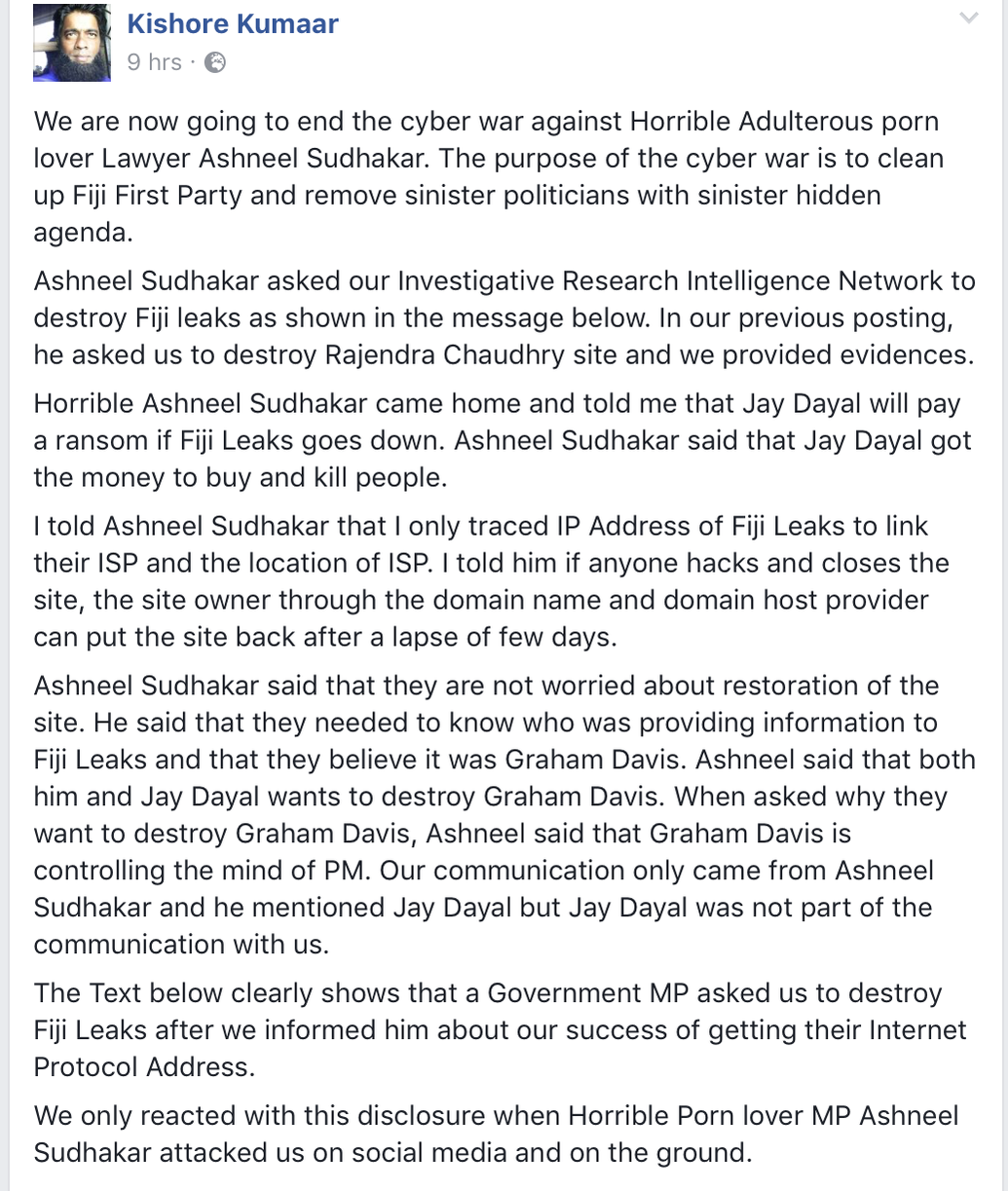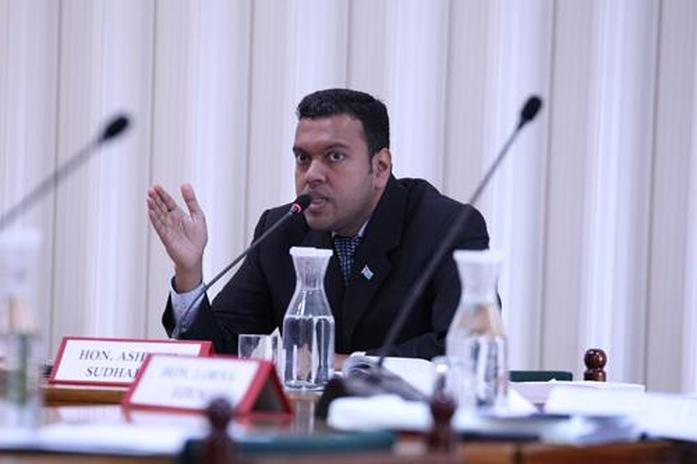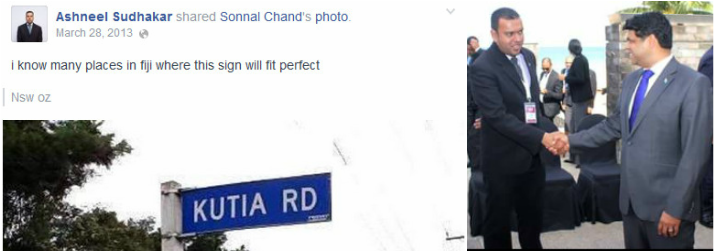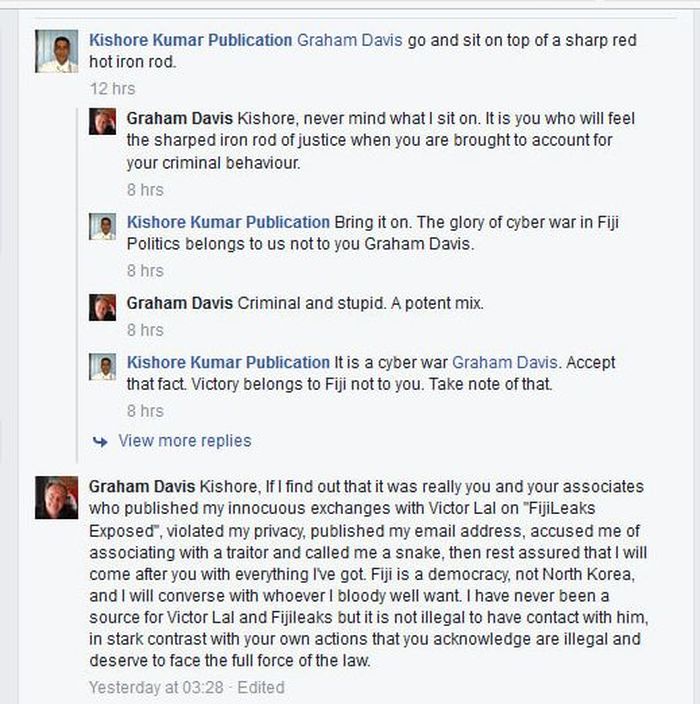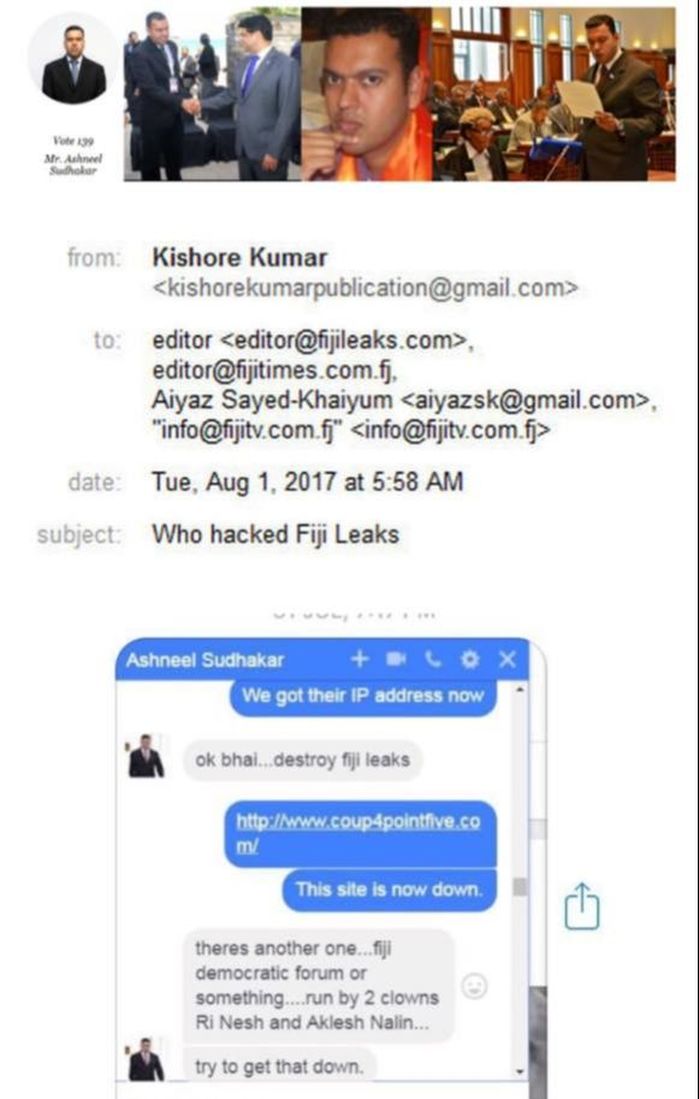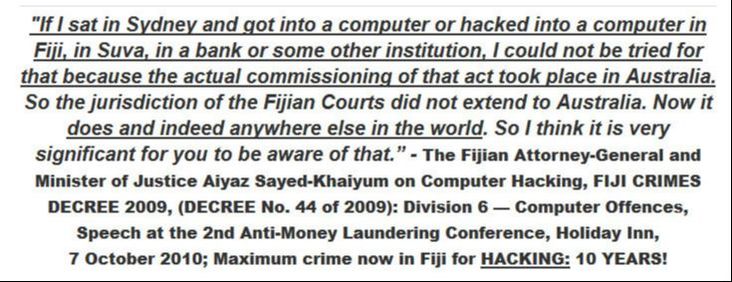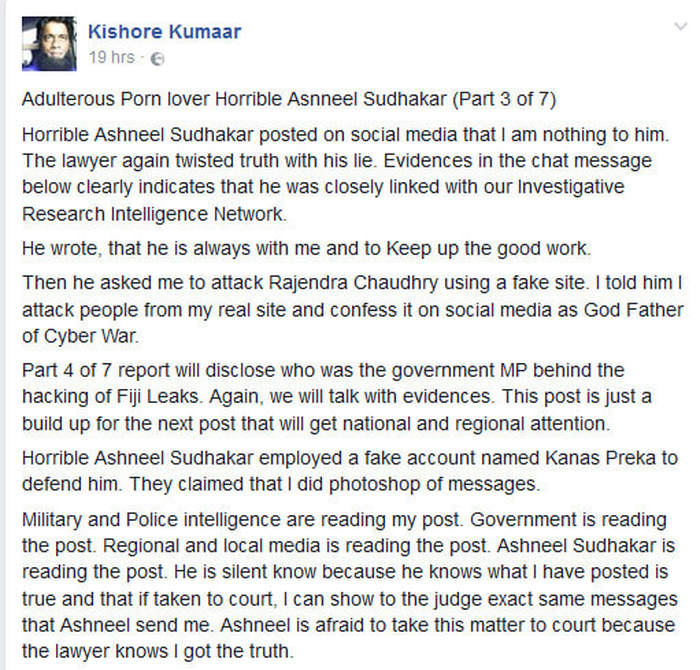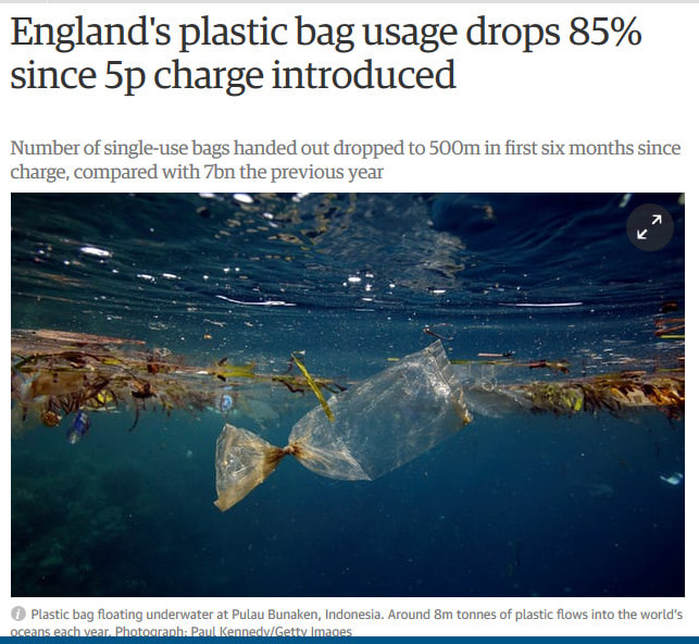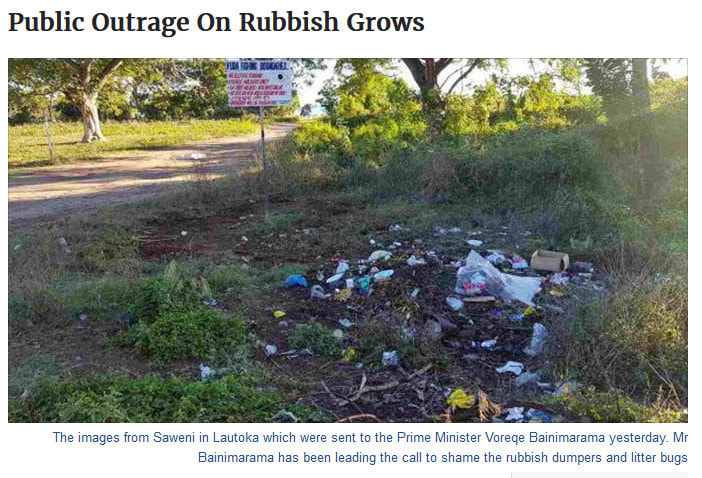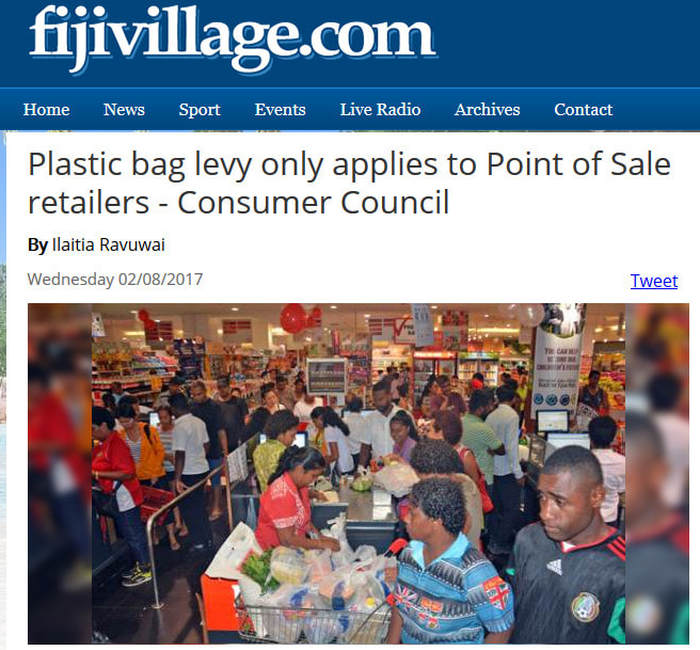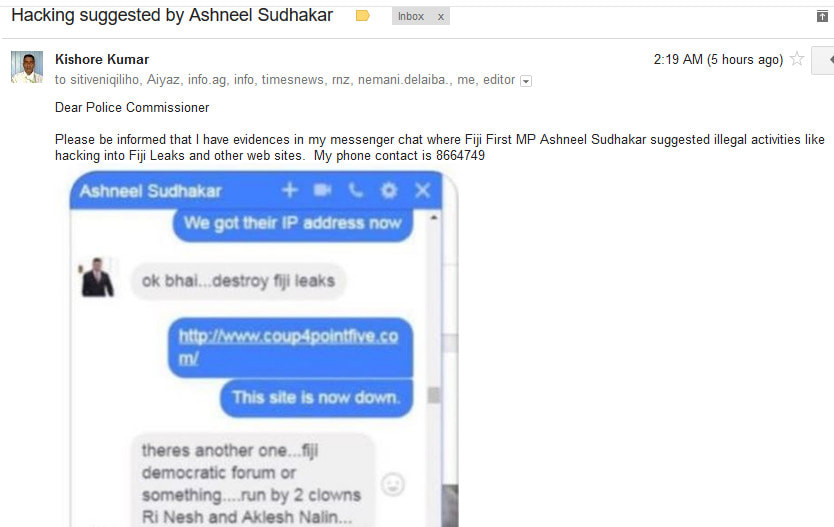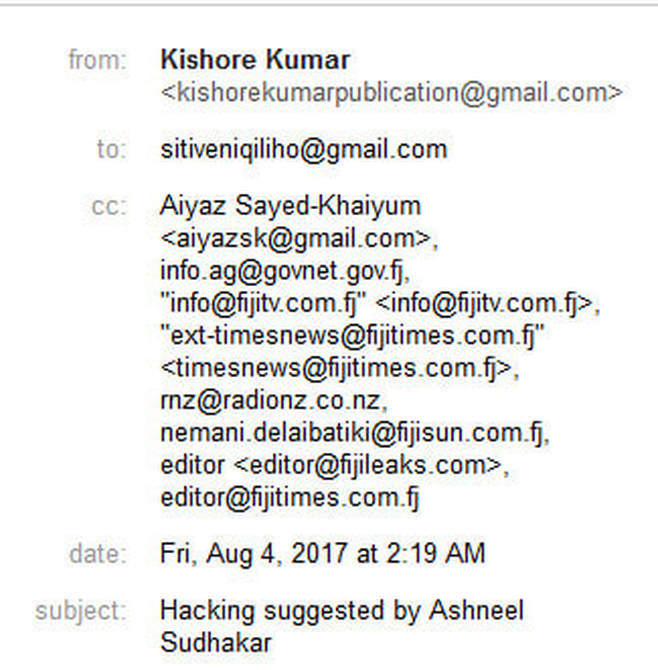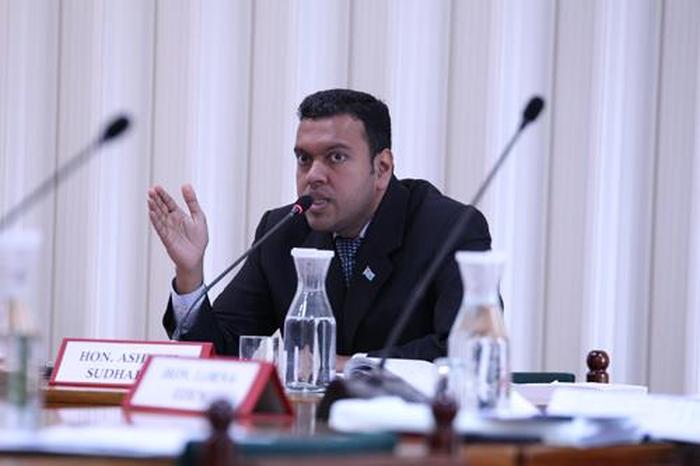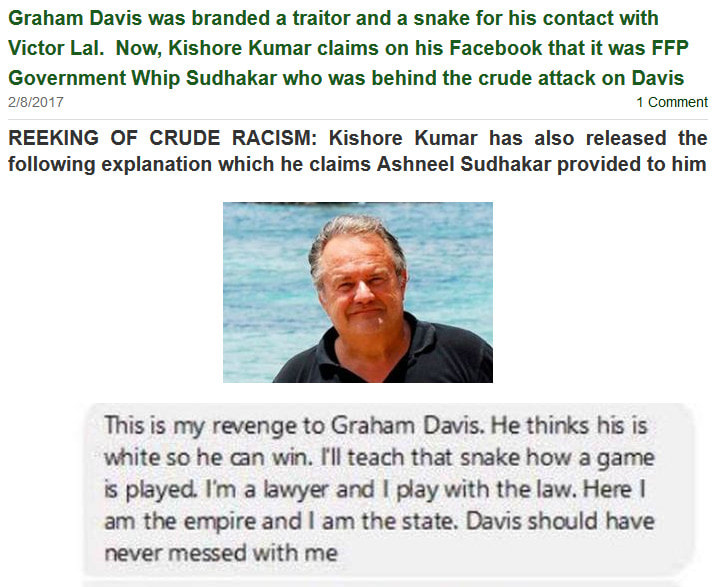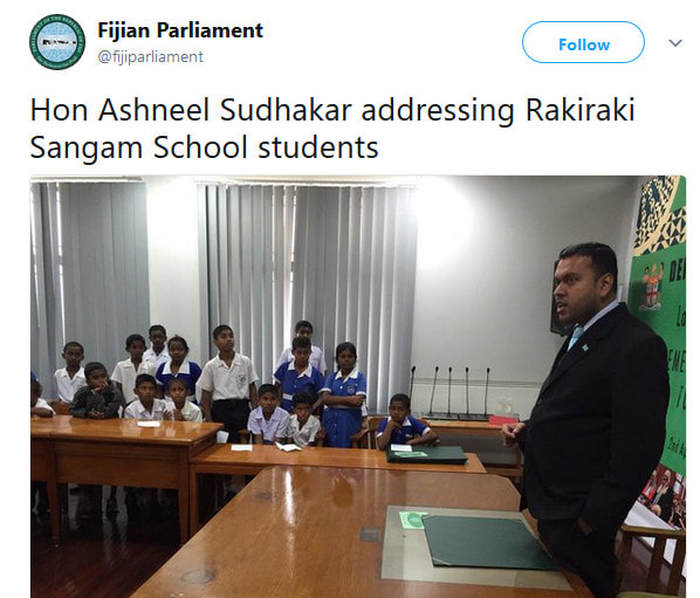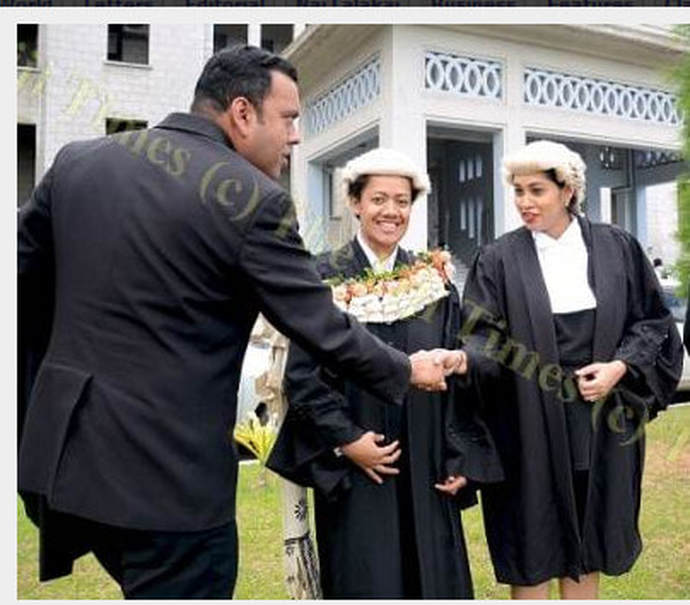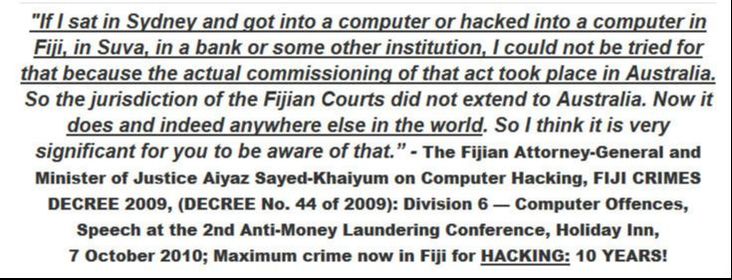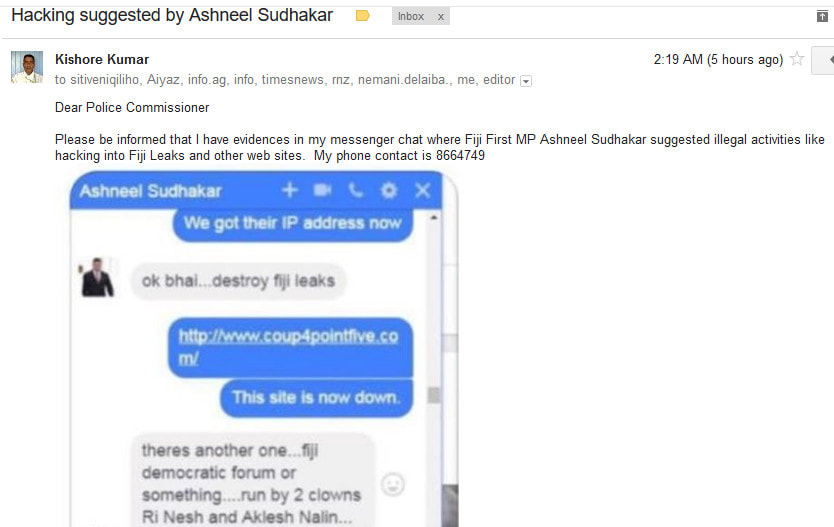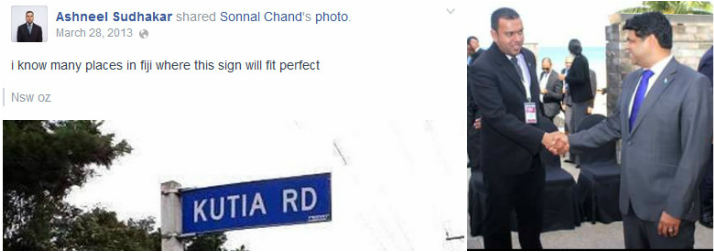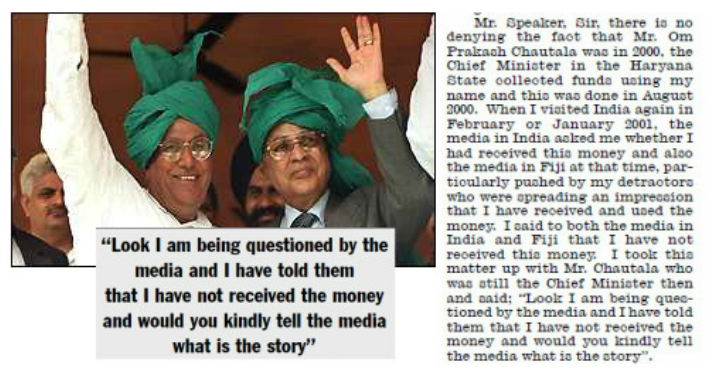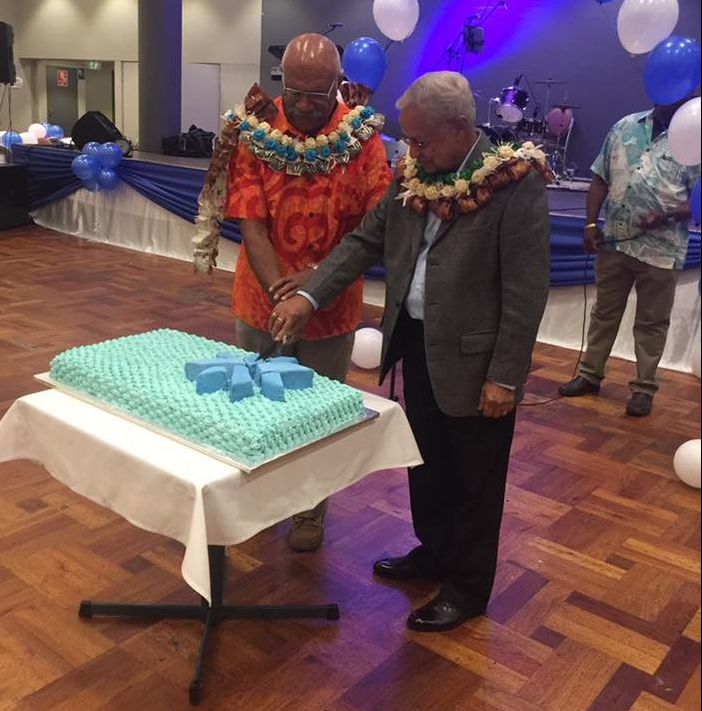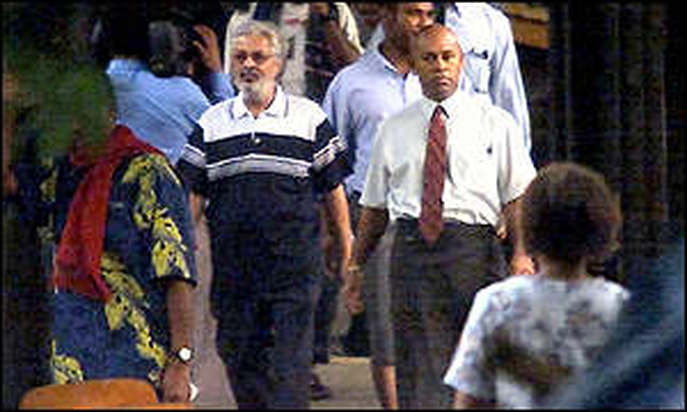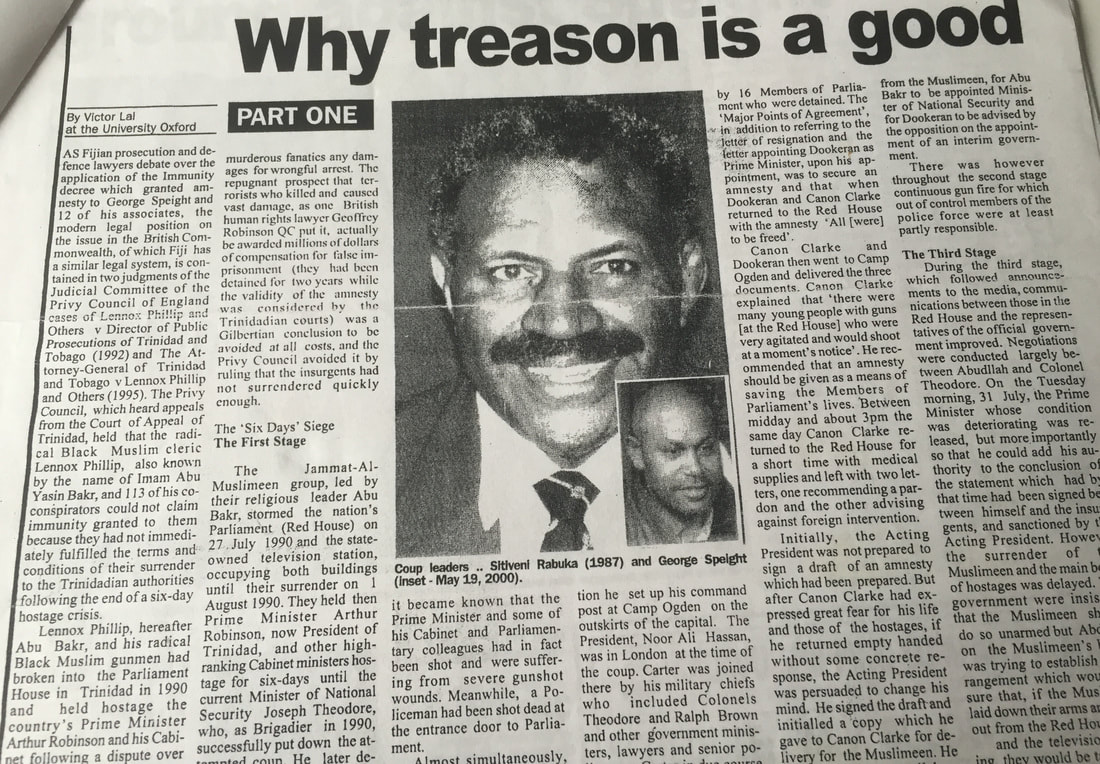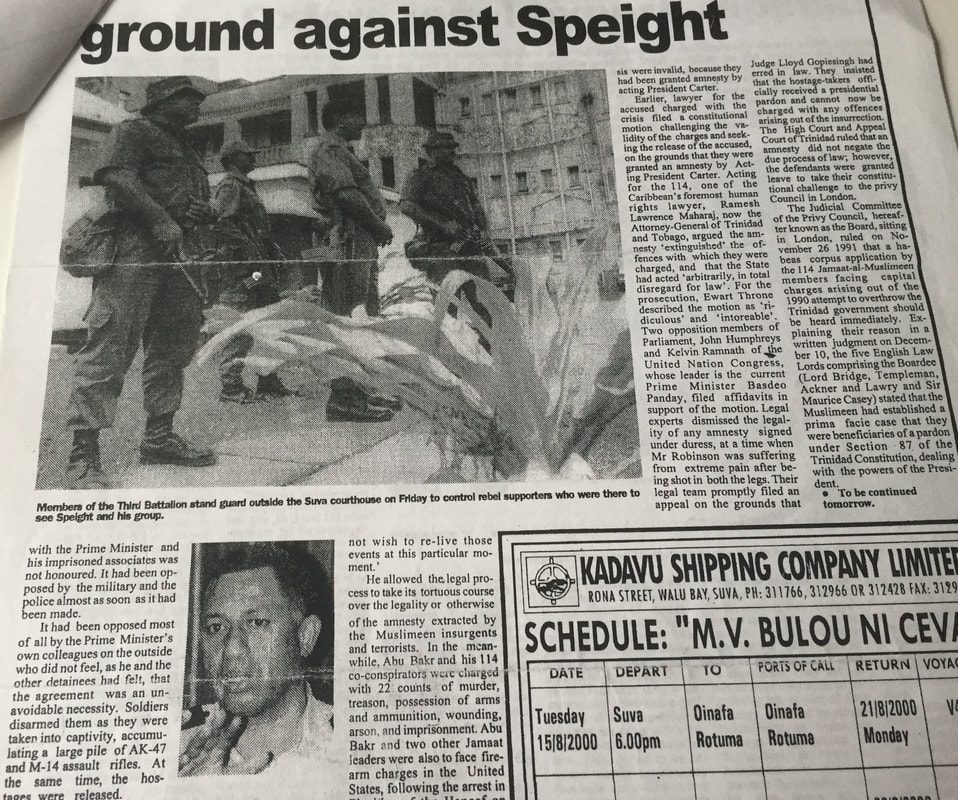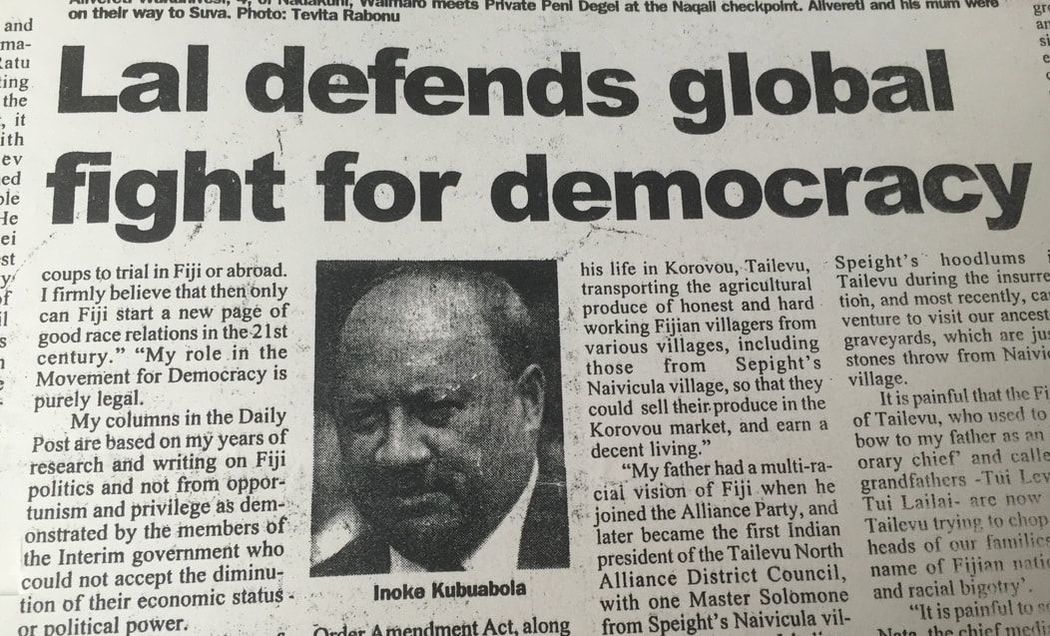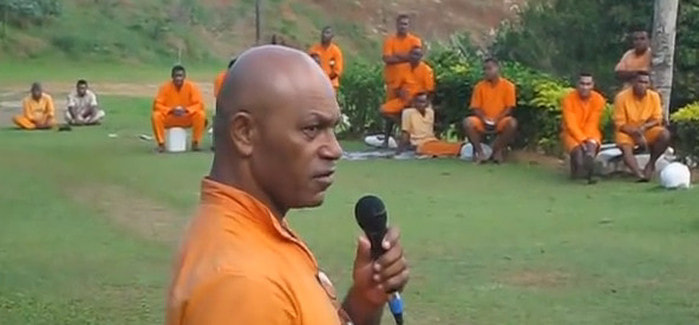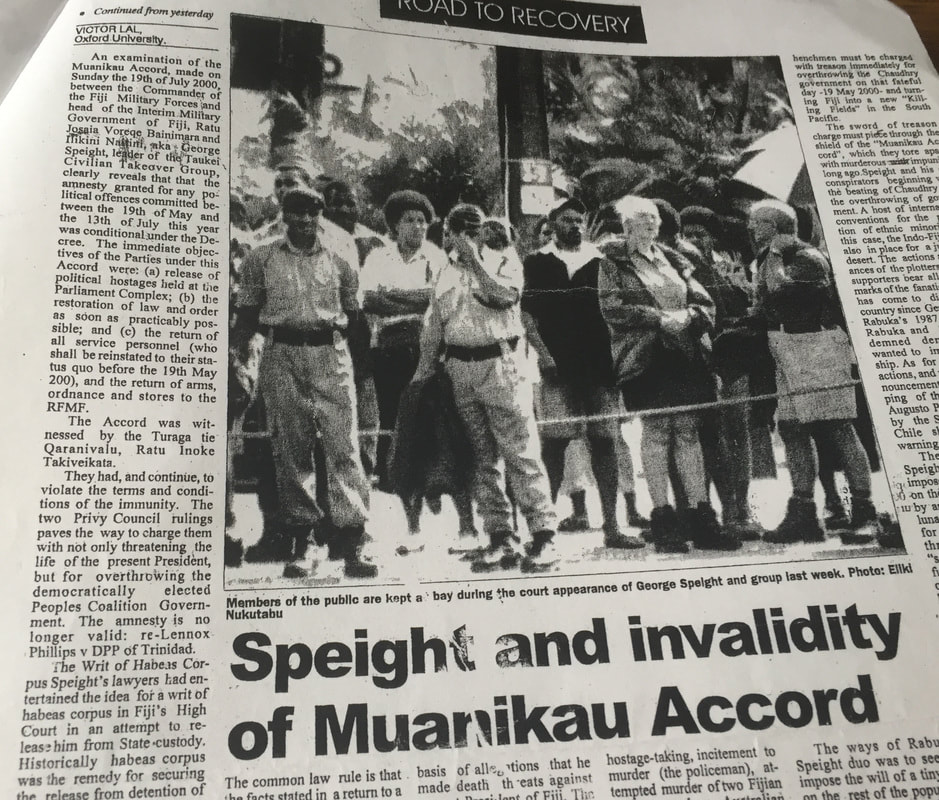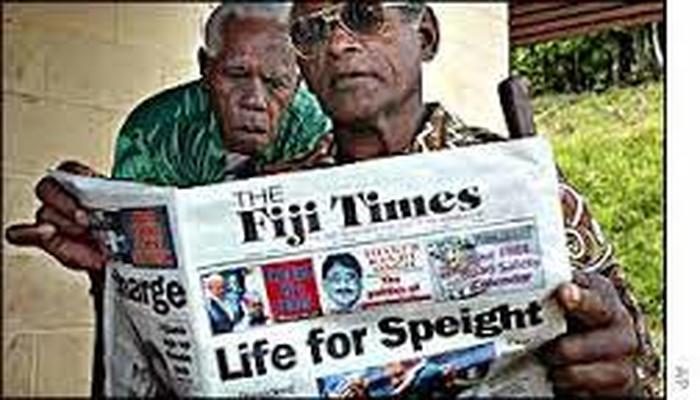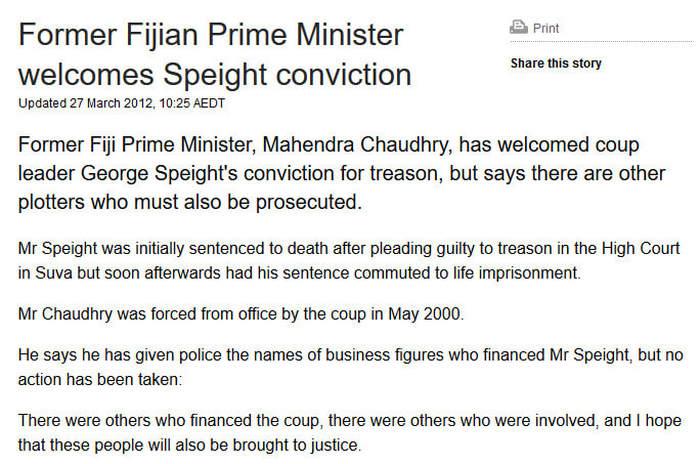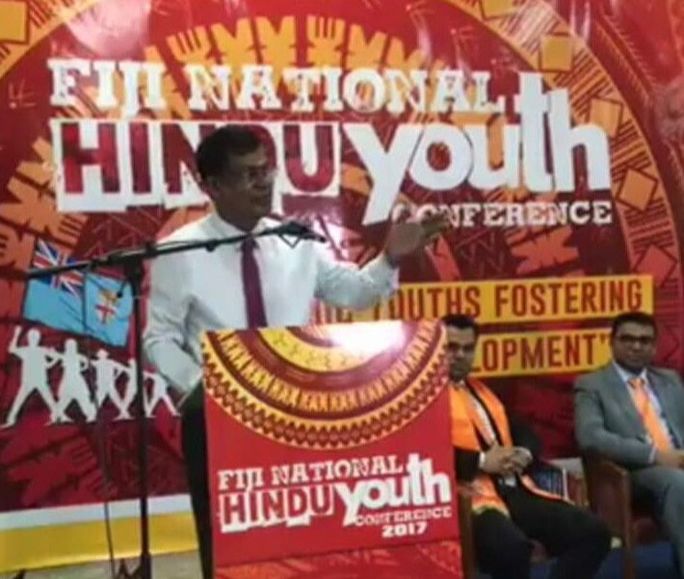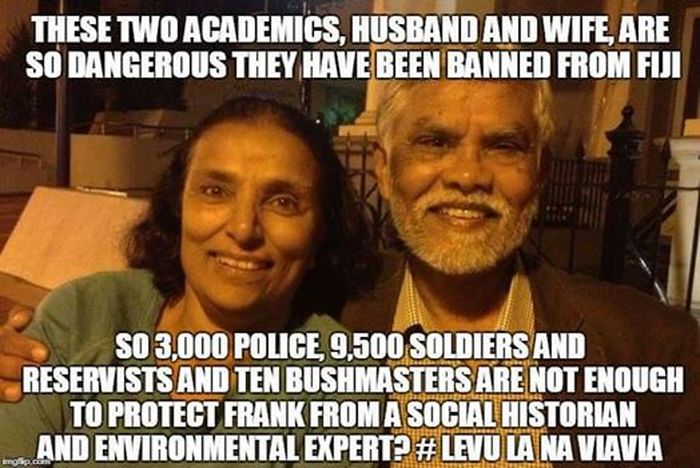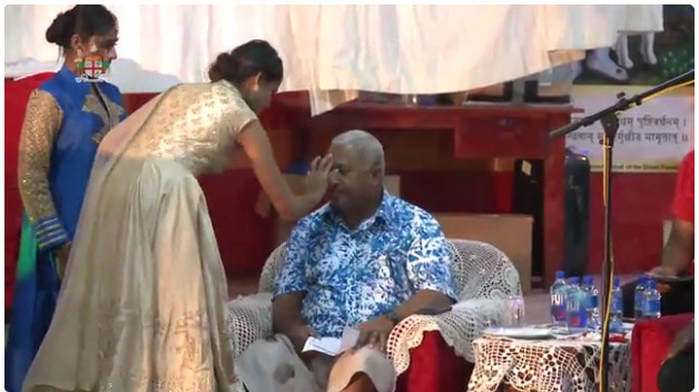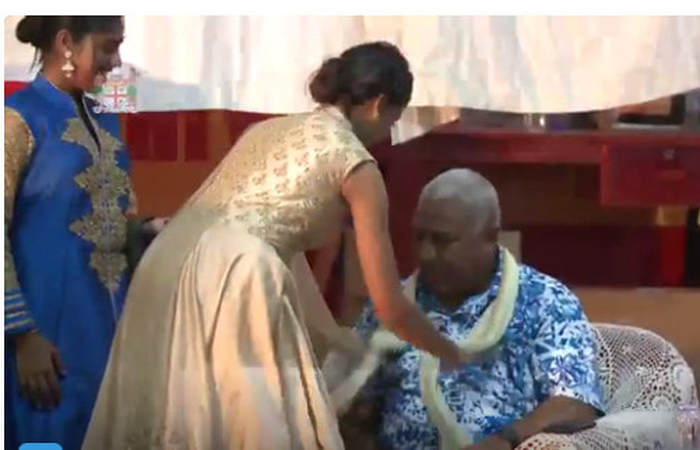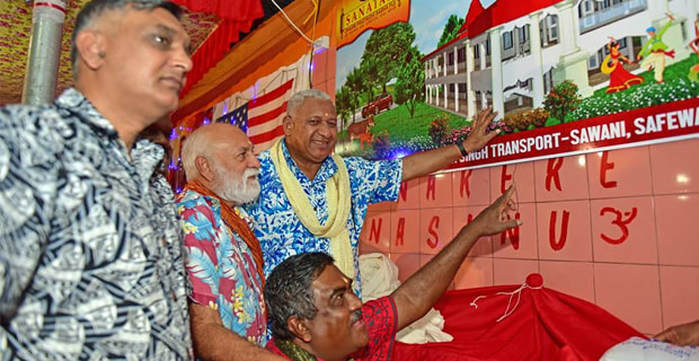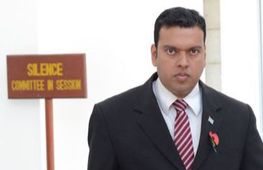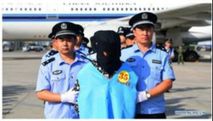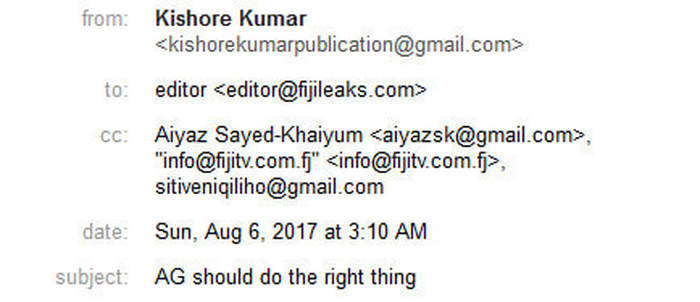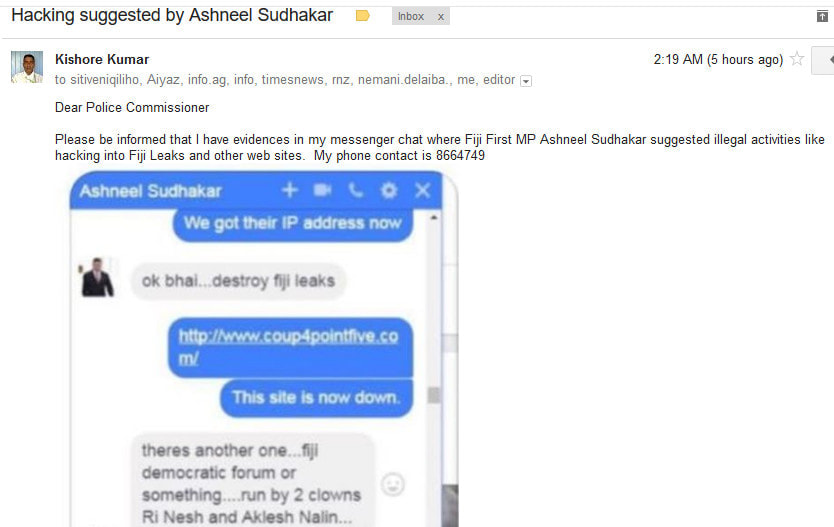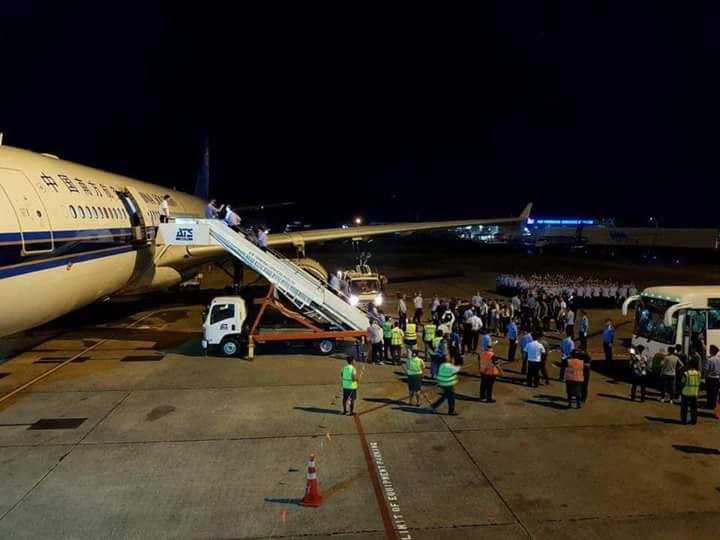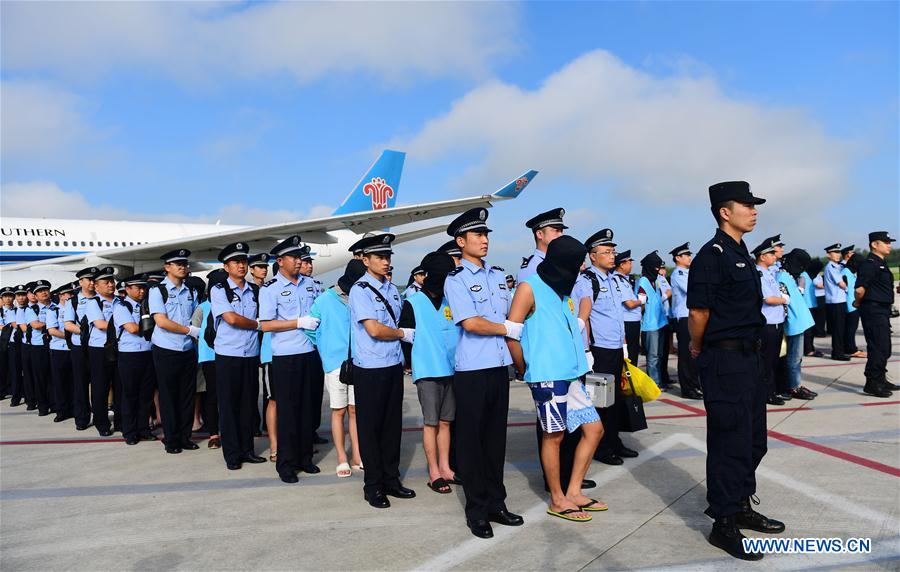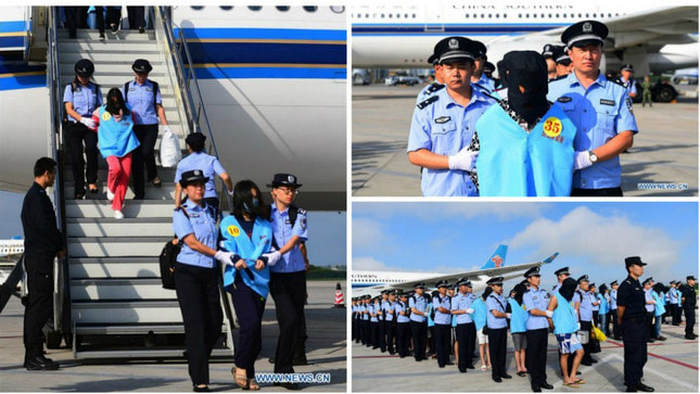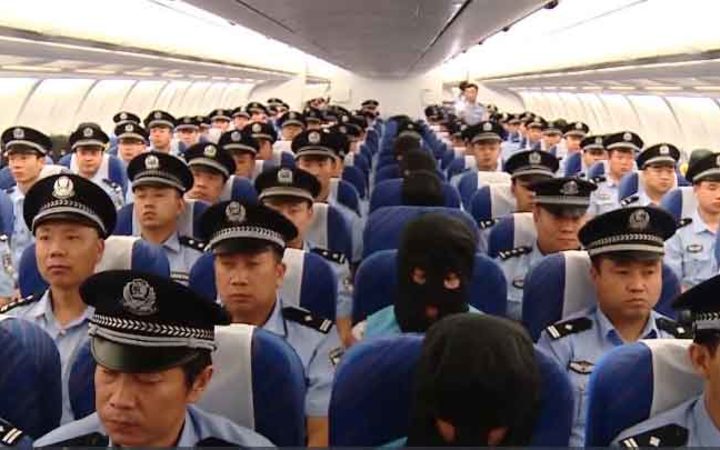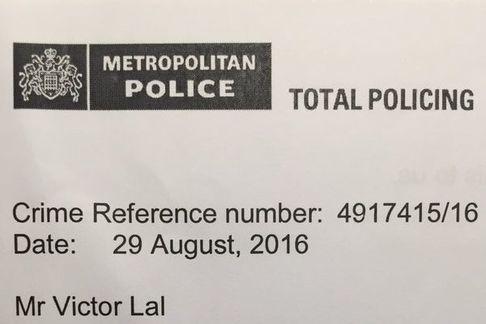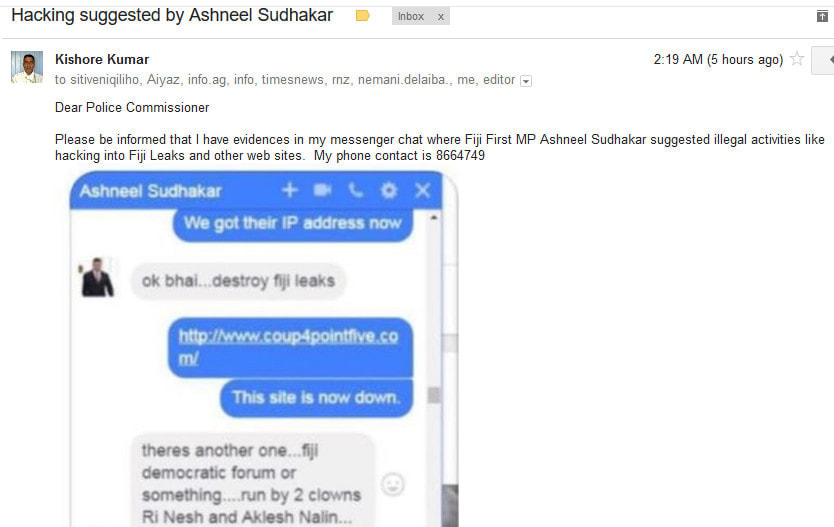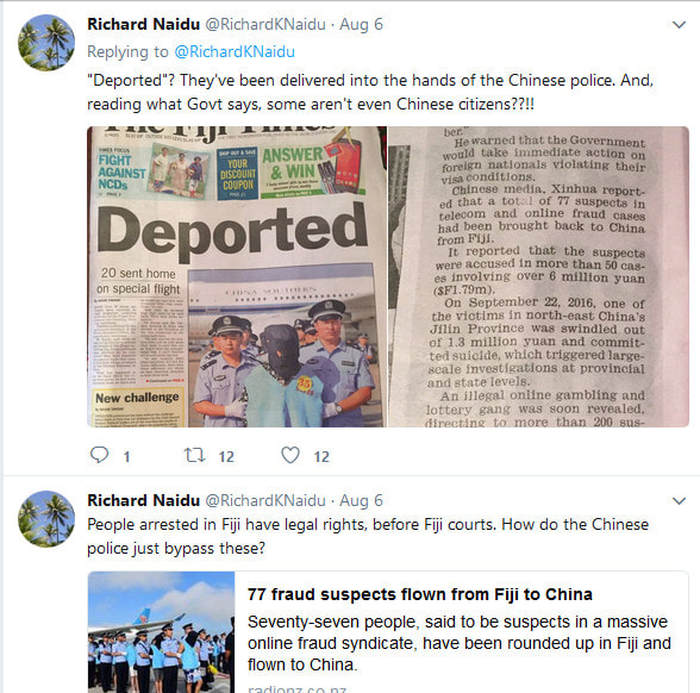↧
Se Plaindre: The French Embassy had lodged over a dozen démarches with Ministry of Foreign Affairs during Robin Nair's reign and received a response to only two - both from the military. The rest went unanswered
“La barbe ne fait pas le philosophe”
He was overheard foul-mouthing Bainimarama to Foreign Diplomats so his position became untenable as Permanent Secretary, Foreign Affairs, after one of the diplomats reported him. We will reveal, later, how his alleged aggressive bullying tone towards the French government scuppered French funding for COP presidency. He is accused of running the Fiji Foreign Ministry as his "Arab Fiefdom". The MOFA is one institution where, every day, they have Christian prayer meetings in defiance of the secular state provision in the Constitution. They also have a formal morning tea for the staff, with mountains of cake and sandwiches paid for by the taxpayer. Nowhere else does this happen in the Fiji Civil Service, and Nair failed to rein into this 'feast and prayer'
We congratulate the Dubai based SARAH CONRAD who recently tied the knot in the tropical island of Seychelles:
↧
ASK SITI: Rabuka, tell us, why were you hiding since the 2006 coup, only to emerge now, surrounded by a ratbag of ethno-nationalists from the 1987 coups, declaring they will be contesting election under SODELPA?
WE ASK YOU, SITI, TO TELL US:
* Who were the real masterminds behind the 1987 coups?
* Were you involved in the 2000 failed Speight coup that overthrew the Chaudhry government, as claimed by the late President Ratu Sir Kamisese Mara? Deposed Prime Minister Chaudhry, after being released, said he had been told of your complicity by the leader of the CRW unit in parliament, Ilisoni Ligairi. In talks with Chaudhry, Ligairi had claimed he was very angry with you because you had ditched them at the last minute.
* Will you and your debtors pay back millions for bankrupting the National Bank of Fiji under the bogus affirmative action policy for native Fijians?
* Why are you and your co-conspirators hiding behind the 1990 Immunity (continued in 1997 and 2013 Constitutions)?
* Will Indo-Fijians again be subjected to rapes, beatings, reduced to second class citizenship, and even expelled from Fiji if you and your ultra ethno-nationalists come to power in 2018?
* And if the Indo-Fijians stay, will you force Hindus and Muslims to convert to Christianity because they are PAGANS in Fiji?
* The last time you contested the election was in 1999, which you lost to the Peoples Coalition government, led by Mahendra Chaudhry. On the eve of the polling, the Fiji Labour Party laid bare your [the Rabuka government's] track record of scandals:
(1) NBF - which will cost the taxpayers around $500million;
(2) CDF - $69million;
(3) Cupit Farm - $7million;
(4) PAFCO - $5million;
(5) Public Trustees - $3million;
(6) Rabi Trust Fund - $8.25million
The FLP told the VOTERS: "SVT will not fulfil promise"
The country has been brought to the bring of destruction by the Rabuka Government, says Fiji Labour Party president Jokapeci Koroi. "While the Prime Minister and his merry men and women have been enjoying themselves the poor people became poorer and they did not bother," Ms Koroi said while addressing supporters at the last Fiji Labour Party rally in Suva yesterday.
"The Rabuka government has not bothered to look after you, the ordinary people. You may again ask why - like many of my Fijian brothers and sisters who probably voted for the SVT in the 1992 and the 1994 elections - has the Rabuka government not delivered the goods that it promised you in 1992 and 1994."
Koroi told the voters that since 1992 when Rabuka first took over our public debt has gone from $700million to $1.5billion as it stands today - that is an increase of around $700million in the last seven years. Our public debt in the last seven years, Ms Koroi said has increased an average of $100million each year.
"Can you believe that? Well I certainly can as these are from official government statistics," she said. Last year, the debt service fee paid by the taxpayers was $118million. This works out at $323,000 a day or $13,500 an hour, 224 a minute or $3.74 a second.
"For every breath we take we are paying $3.74 - thanks to the Rabuka government's abysmal management of our public finances."
"Our social indicators show that almost:
* 40 percent of our people live below the poverty line;
* 25 per cent of our youths are unemployed and;
* crime has increased by 130 per cent in the last five years."
Ms Koroi said that with the SVT Government's track record, they would not fulfil what they had promised. She said that People's Coalition was ready to form a Government for the people. Ms Koroi said the People's Coalition now had the support from all races and they were confident they would have the number to form a new Government after the general election. Fijileaks: As history records, People's Coalition did oust Rabuka from power in 1999 but a year later was overthrown by the George Speight putsch. The Chaudhry government was held hostage for 56 days, prompting Ratu Mara to accuse Rabuka of having a hand in the putsch.
On Thursday 27 July 2017, the SODELPA Youth are presenting this Coup Daddy and political loser, who was banished into political wilderness in 1999, in the Wesley City Hall Mission Hall in Suva, and the theme is
ASK SITI:
http://www.fijileaks.com/home/the-lying-coupist-the-former-chief-of-staff-lt-colonel-jim-sanday-says-sitiveni-rabuka-is-a-liar-for-claiming-that-he-sanday-asked-him-rabuka-to-carry-out-1987-coups-because-he-sanday-was-kai-loma
http://www.fijileaks.com/home/shifting-blame-rabuka-either-you-or-the-commander-have-got-to-do-this-i-cant-do-it-im-kai-loma-im-a-white-european-jim-sandy-rabuka-also-claims-it-was-ratu-mara-who-told-him-to-destroy-constitution
"Deposed Prime Minister Chaudhry, after being released, said he had been told of Rabuka's complicity by the leader of the CRW unit in parliament, Ilisoni Ligairi. In talks with Chaudhry, Ligairi had claimed he was very angry with Rabuka because he had ditched them at the last minute."
Speight not real coup mastermind - minister
21 August 2000
Suva
As an uneasy calm settles in Fiji after the storm of the past couple of months, the search is underway for the real mastermind behind George Speight's failed May 19 coup.
Poseci Bune, minister for agriculture in the deposed government of Prime Minister Mahendra Chaudhry, set the rumour mill turning with his disclosure that Speight had revealed, minutes after taking the government hostage, that he was not the real leader of the coup.
Speight told the hostages as he tied them up that they would be surprised to learn the identity of the coup leader, claimed Bune.
"So we had to wait about 40 minutes as he was making calls ... and telling us that we will be surprised that he is not the real leader, as the real leader will arrive for us to see him".
Finally, Speight realised the man would not surface and he would have to brave it out. "I think he is going to be late. Well, I have to take it on from here," he told his captives.
Rumours are rife in the Pacific nation that the coup mastermind remains at large while the 17 people closely identified with Speight during the coup now face treason and conspiracy to treason charges on the island prison of Nukulau, just east of the capital.
Two-time coup leader and former prime minister Sitiveni Rabuka has not been above suspicion.
Seven of the special forces men who stormed into parliament that day and held members of the government hostage for 56 days were from the counter revolutionary warfare unit (CRW).
Just a few weeks earlier, they were training on Rabuka's estate on Vanua Levu. The former prime minister has denied giving them permission to do so.
On May 14, the anniversary of his 1987 coup and four days before Speight's coup, Rabuka officiated at a church service with the CRW men where he reportedly told them they would be called on to protect indigenous rights.
Bune said they were told by CRW officers that Rabuka had indicated they would be called on to do something from which some of them might not return.
As in 1987, the elite team was not told beforehand of the exact nature of their May 19 assignment.
"A few of them jumped off the van when they realised where they were going," said army spokesperson Major Howard Politini later.
Rabuka, himself, has always vehemently denied any involvement with Speight's coup.
However, deposed Prime Minister Chaudhry, after being released, said he had been told of Rabuka's complicity by the leader of the CRW unit in parliament, Ilisoni Ligairi.
In talks with Chaudhry, Ligairi had claimed he was very angry with Rabuka because he had ditched them at the last minute.
Within an hour or so of the coup, Rabuka had turned up at parliament, ostensibly as the mediator in negotiations between the hostage-takers and President Sir Kamisese Mara.
According to diplomatic sources, Mara at the time expressed his distrust of Rabuka, although he later appointed him as official negotiator. But two days later, the hostage-takers rejected Rabuka in the role saying they no longer trusted him.
Bune believes the failure of the "real leader" to turn up was "a big hiccup" in the coup attempt: "When the army was not in a position to support the coup, the 'man' backed out immediately and left these guys in limbo."
He also revealed the names of the people who turned up to see Speight in parliament on that fateful Friday "to give their moral support because they sympathised with the cause".
Three of those who turned up to attend Speight's first meeting are now ministers in the interim administration: Tuakitau Cokanauto, minister for local government and urban development, Inoke Kubuabola, information minister and formerly opposition leader during the Chaudhry administration, and Apisai Tora, minister for agriculture.
The army intends to hold its own court martial to deal with the conspirators and interim President Josefa Iloilo has promised the appointment of a commission of inquiry into the coup.
But whether these inquiries will reveal the real face of the man behind the May 19 coup, is a moot point.
Nevertheless, some are wondering whether Speight, facing trial for treason, might even reveal in court the identity of the man who failed to turn up at one of the defining moments in the country's history. - Sapa-AFP
21 August 2000
Suva
As an uneasy calm settles in Fiji after the storm of the past couple of months, the search is underway for the real mastermind behind George Speight's failed May 19 coup.
Poseci Bune, minister for agriculture in the deposed government of Prime Minister Mahendra Chaudhry, set the rumour mill turning with his disclosure that Speight had revealed, minutes after taking the government hostage, that he was not the real leader of the coup.
Speight told the hostages as he tied them up that they would be surprised to learn the identity of the coup leader, claimed Bune.
"So we had to wait about 40 minutes as he was making calls ... and telling us that we will be surprised that he is not the real leader, as the real leader will arrive for us to see him".
Finally, Speight realised the man would not surface and he would have to brave it out. "I think he is going to be late. Well, I have to take it on from here," he told his captives.
Rumours are rife in the Pacific nation that the coup mastermind remains at large while the 17 people closely identified with Speight during the coup now face treason and conspiracy to treason charges on the island prison of Nukulau, just east of the capital.
Two-time coup leader and former prime minister Sitiveni Rabuka has not been above suspicion.
Seven of the special forces men who stormed into parliament that day and held members of the government hostage for 56 days were from the counter revolutionary warfare unit (CRW).
Just a few weeks earlier, they were training on Rabuka's estate on Vanua Levu. The former prime minister has denied giving them permission to do so.
On May 14, the anniversary of his 1987 coup and four days before Speight's coup, Rabuka officiated at a church service with the CRW men where he reportedly told them they would be called on to protect indigenous rights.
Bune said they were told by CRW officers that Rabuka had indicated they would be called on to do something from which some of them might not return.
As in 1987, the elite team was not told beforehand of the exact nature of their May 19 assignment.
"A few of them jumped off the van when they realised where they were going," said army spokesperson Major Howard Politini later.
Rabuka, himself, has always vehemently denied any involvement with Speight's coup.
However, deposed Prime Minister Chaudhry, after being released, said he had been told of Rabuka's complicity by the leader of the CRW unit in parliament, Ilisoni Ligairi.
In talks with Chaudhry, Ligairi had claimed he was very angry with Rabuka because he had ditched them at the last minute.
Within an hour or so of the coup, Rabuka had turned up at parliament, ostensibly as the mediator in negotiations between the hostage-takers and President Sir Kamisese Mara.
According to diplomatic sources, Mara at the time expressed his distrust of Rabuka, although he later appointed him as official negotiator. But two days later, the hostage-takers rejected Rabuka in the role saying they no longer trusted him.
Bune believes the failure of the "real leader" to turn up was "a big hiccup" in the coup attempt: "When the army was not in a position to support the coup, the 'man' backed out immediately and left these guys in limbo."
He also revealed the names of the people who turned up to see Speight in parliament on that fateful Friday "to give their moral support because they sympathised with the cause".
Three of those who turned up to attend Speight's first meeting are now ministers in the interim administration: Tuakitau Cokanauto, minister for local government and urban development, Inoke Kubuabola, information minister and formerly opposition leader during the Chaudhry administration, and Apisai Tora, minister for agriculture.
The army intends to hold its own court martial to deal with the conspirators and interim President Josefa Iloilo has promised the appointment of a commission of inquiry into the coup.
But whether these inquiries will reveal the real face of the man behind the May 19 coup, is a moot point.
Nevertheless, some are wondering whether Speight, facing trial for treason, might even reveal in court the identity of the man who failed to turn up at one of the defining moments in the country's history. - Sapa-AFP
Fijileaks to 'Ask Siti': Was CRW Unit leader Ligairi telling the truth to Chaudhry?
↧
↧
IN FIJI TREASON IS OK. Mahendra Chaudhry slams Bainimarama and Khaiyum as his attempt to contest election ends in failure in High court
“It is an anathema that those who have committed the most heinous crime of treason – not once but several times – and have granted themselves immunity under a tailor-made constitution are free to contest the elections while barring others who they perceive a threat to their hold on power. ” - FLP leader Mahendra Chaudhry |
Fijileaks: When did Frank Bainimarama's coup become TREASON? Was it after Chaudhry left as Bainimarama's Interim Minister of Finance, Sugar Industry and National Infrastructure?
And what about his new found coalition partner and SODELPA leader Sitiveni Rabuka? Rabuka carried out not one but two coups and gave himself and other conspirators IMMUNITY in his tailor-made 1990 Constitution and which was carried forward into 1997 and 2013 Constitutions

In Fiji #treason is ok...Fiji Labour Party
Labour Leader Mahendra Chaudhry and trade unionist Karam Bidesi today withdrew their application to the High Court challenging the constitutional provisions which bar them from contesting the 2018 general elections.
The defendants in the action (the State and the Attorney General) had filed an application to have the action struck down.
The decision to withdraw the matter was taken when the Judge declined to grant an adjournment to the plaintiffs to enable them to file amended summons.
Commenting on the proceedings, Mr Chaudhry said he was disappointed that their request for an adjournment was denied.
Under Section 56 of the imposed 2013 Constitution, anyone convicted of an offence punishable by a term of imprisonment of 12 months or more, is barred from contesting the elections for 8 years ( two parliamentary terms).
Section 57 defines Trade unionists as holders of public office and bars them forever. Under no stretch of the imagination can trade unionists be described as holders of public office.
Section 56 is peculiar in that no previous constitution carried any such provision. Even the Electoral Commission in its 2014 annual report recommended that this provision be amended as it was too severe. However, the government has taken no action in the matter.
It is clear to all that Section 56 was deliberately inserted to bar former Prime Ministers Mahendra Chaudhry and Laisenia Qarase from contesting future elections. It was a pre-meditated “dirty tricks” plan hatched by Bainimarama and Khaiyum.
Readers may recall Bainimarama's oft-repeated public pronouncements that neither Chaudhry nor Qarase will be in parliament in 2014.
In 2012 Mr Qarase was convicted on a matter that went back 20 years and sentenced to one year imprisonment.
In Mr Chaudhry’s case, he was charged for a matter that he had been completely cleared off by an independent inquiry in 2008. He was not jailed, but the offence under the Exchange Control Act carried a sentence of more than a one year jail term.
Speaking on the injustice of the situation, Mr Chaudhry said, “It is an anathema that those who have committed the most heinous crime of treason – not once but several times – and have granted themselves immunity under a tailor-made constitution are free to contest the elections while barring others who they perceive a threat to their hold on power. ”
“As far as I am concerned, the matter is still very much in the public domain. The constitutional provisions in question constitute a violation of our fundamental rights and were decreed by a group of people simply to protect their political interests,” he said.
Labour Leader Mahendra Chaudhry and trade unionist Karam Bidesi today withdrew their application to the High Court challenging the constitutional provisions which bar them from contesting the 2018 general elections.
The defendants in the action (the State and the Attorney General) had filed an application to have the action struck down.
The decision to withdraw the matter was taken when the Judge declined to grant an adjournment to the plaintiffs to enable them to file amended summons.
Commenting on the proceedings, Mr Chaudhry said he was disappointed that their request for an adjournment was denied.
Under Section 56 of the imposed 2013 Constitution, anyone convicted of an offence punishable by a term of imprisonment of 12 months or more, is barred from contesting the elections for 8 years ( two parliamentary terms).
Section 57 defines Trade unionists as holders of public office and bars them forever. Under no stretch of the imagination can trade unionists be described as holders of public office.
Section 56 is peculiar in that no previous constitution carried any such provision. Even the Electoral Commission in its 2014 annual report recommended that this provision be amended as it was too severe. However, the government has taken no action in the matter.
It is clear to all that Section 56 was deliberately inserted to bar former Prime Ministers Mahendra Chaudhry and Laisenia Qarase from contesting future elections. It was a pre-meditated “dirty tricks” plan hatched by Bainimarama and Khaiyum.
Readers may recall Bainimarama's oft-repeated public pronouncements that neither Chaudhry nor Qarase will be in parliament in 2014.
In 2012 Mr Qarase was convicted on a matter that went back 20 years and sentenced to one year imprisonment.
In Mr Chaudhry’s case, he was charged for a matter that he had been completely cleared off by an independent inquiry in 2008. He was not jailed, but the offence under the Exchange Control Act carried a sentence of more than a one year jail term.
Speaking on the injustice of the situation, Mr Chaudhry said, “It is an anathema that those who have committed the most heinous crime of treason – not once but several times – and have granted themselves immunity under a tailor-made constitution are free to contest the elections while barring others who they perceive a threat to their hold on power. ”
“As far as I am concerned, the matter is still very much in the public domain. The constitutional provisions in question constitute a violation of our fundamental rights and were decreed by a group of people simply to protect their political interests,” he said.
Rajendra Chaudhry: "Alfred J[udge] was said to be overly rude, argumentative and discourtsous at time to Anand Singh during the proceedings."
Says alot of the Judiciary in Fiji doesn't it folks?
And Chaudhry's challenge to the draconian provisions of the unmandated 2013 CONstitution has only just begun folks.
And Chaudhry's challenge to the draconian provisions of the unmandated 2013 CONstitution has only just begun folks.
VICTOR LAL:
Chaudhry and Qarase: Strange Political Bedfellows
"In 2008, after a lengthy investigation, I was ready to expose Mahendra Chaudhry's $2million that he was hiding from the taxpayers of Fiji. I gave the then deposed Prime Minister Laisenia Qarase the option to go public with my findings. After some exchanges, it was agreed that I should go ahead with the revelation in the Fiji Sun. I did which, as we know, resulted in the abduction, detention, and deportation of Fiji Sun publisher Russell Hunter out of Fiji. The morning the revelation appeared in the Fiji Sun, Sitiveni Rabuka was among the many who congratulated the paper for exposing Chaudhry. Today the trio - Chaudhry, Qarase and Rabuka - have bandied together to challenge Bainimarama. Politics, hypocrisy, and opportunism make strange bedfellows. The biggest shock was when Anand Singh, FLP's former Attorney-General, who had filled me with some very vital missing details, turned up as Chaudhry's lawyer after the FLP leader was charged with foreign currency offences. Today Singh is back in court on behalf of Mahendra Chaudhry!
Cry the Beloved Country!
↧
SHUFFLING THE DECK FOR 2018 ELECTION: Former Chief Executive of the Sugar Cane Growers Council Jagannath Sami is the new General Secretary of the National Federation Party. He replaces BALA DASS
July 21, 2017
Media Release: NFP Names New General Secretary; $5M for Dialysis Under NFP Government
Former Chief Executive of the Sugar Cane Growers Council Mr Jagannath Sami is the new General Secretary of the National Federation Party.
Mr Sami replaces Mr Bala Dass who has resigned to concentrate fully on his role as General Secretary of Fiji Cane Growers Association, having served as the Party’s chief administrator and organiser for the last two years.
Mr Sami has been appointed by the NFP Management Board, in conformity to a resolution unanimously adopted by delegates at the Party’s Annual General Meeting on 3rd June 2017.
The AGM had authorised the Management Board to appoint a full-time General Secretary to play an integral role in the preparations, implementation of strategies and ensuring compliance with the electoral laws in the lead up to the next general elections scheduled for 2018. Under the NFP Constitution the President and General Secretary are extremely important positions. We are confident that our President Mr Pio Tikoduadua and Mr Sami will form a formidable combination and complement the work of the Party Leader in ensuring success in 2018.
Mr Sami brings to his new role a wealth of political and administrative experience. He has always lived ad served ordinary citizens of Fiji, particularly the cane growers through his role in the Fiji Sugar Corporation, Fiji Cane Growers Association and Sugar Cane Growers Council.
Mr Sami served the FSC for 21 years as Field Officer, Traffic Officer and Estate Officer. He resigned in 1992 to join the Sugar Cane Growers Council as District Manager and later in 2000 was appointed as Chief Executive Officer. It was his dream to champion the course of the farmers. During his 6 year tenure, many services were provided to the cane farmers of Fiji namely legal services, medical insurance, good will grants, farm inputs etc.
Mr Sami was unlawfully and brutally removed by the military regime in January 2007 after warning that the impasse that eventually led to the 4th military coup, would result in the loss of the $350m European Union grant earmarked to reform the Fiji Sugar Industry. Mr Sami was then terminated by the President of the Republic of Fiji through Decree No. 1 of 2007. This action was followed his second termination by the newly appointed Sugar Cane Growers Council Board, on the directive of the then Interim Minister for Sugar. That grant was lost because of the coup. So was the chance to advance our sugar industry. The rest is history.
Mr Sami has been an active and integral member of the NFP and FCGA for the last 23 years. He was the founder President of the NFP Youth Movement in 1994 as well as the General Secretary of the FCGA two years after its formation in 1992. Therefore, he is a person with a wealth of experience, energy and vigour together with Mr Tikoduadua to direct the operations and activities of the Party during these significantly important times.
The Party wishes to sincerely thank Mr Bala Dass for his voluntary service for the last two years. It will indeed be a massive boost for growers now that Mr Dass can concentrate fulltime on looking after the welfare and interest of growers who are the largest and most important stakeholders of our sugar industry.
In the absence of a legitimate voice for growers due to the abolition of the elected Sugar Cane Growers Council, Mr Dass has and will continue to be their legitimate voice as he understands grower issues perfectly well having served as FCGA General Secretary for over 16 years.
POLICY ANNOUNCEMENTS
We feel the winds of change blowing across Fiji. We have announced several initiatives many of which will be a priority if NFP forms government after the elections. All policies are oriented towards providing lasting solutions, alleviating the plight of all our people and enhancing their livelihood.
It is worth repeating some of them: -
Implementing a minimum guaranteed price of $100 per tonne of cane and building a new mill in Penang, Rairaki. The minimum guaranteed price will be far greater than the value of subsidies for fertilizer and weedicide announced by the current Fiji First Government. Honourable Prem Singh very eloquently dissected the issue in Parliament on 11th July and I quote, “For a grower producing 20 tonnes in an acre, the savings from fertilizer subsidies equate to $3.45 per tonne of cane. For a grower producing 30 tonnes in an acre, the subsidy equates to $2.30 per tonne. And if you add the weedicide subsidy of $1 per tonne, the total savings per tonne is $4.45 per tonne for a 20 tonne per acre producer and $3.30 per tonne for a 30 tonne producer.
Even if we are producing 2 million tonnes of cane annually, the total value of the fertilizer and weedicide subsidy will be $6.6 million to $8.9 million.
What growers need is a meaningful increase to the price of cane. And this can only happen if a minimum guaranteed price of $100 per tonne is implemented with an annual subsidy of $50 million that will cover both the subsidy and the guaranteed cane price.
At the current average cost of production of $45 per tonne, growers will earn a net income of $55 per tonne minus cultivation, production, harvesting and delivery expenses. This plan to be implemented as a priority by NFP will mean growers receive between $50.55 and $51.70 more per tonne of cane as net income, rather than the monetary value of subsidies provided by the current government”. – unquote
We will implement a living wage of $5 an hour instead of the new meagre minimum rate of $2.68 an hour
We will zero-rate or make VAT free 15 basic food items. This list used to be of 7 items until the Fiji First Government betrayed its pre-election promise and re-imposed VAT on them from 1st January 2016
An NFP Government will reduce the salaries of the Prime Minister and Cabinet Ministers by 25% from the current levels and for the salaries to be determined by an independent Emoluments Committee
The i-Taukei Village by-laws and the Rotuma Land Bill will be abolished if enacted into Law
A National Health Service will be established to reform and rejuvenate our public health and medical services that has deteriorated rapidly under the current Government
Today we announce that further to the establishment of a National Health
Service, an NFP Government after the elections will: -
1. Allocate $5 million annually towards dialysis costs of our kidney patients. The Motion to increase the allocation from $300,000 by NFP was defeated by Fiji First on July 12 in Parliament during the Budget debate.
2. Yet the Fiji First Government sees it fit to give away $18 million in marketing grant to Fiji Airways, $9 million for golf, $11 million to Fiji Broadcasting Commission, millions of dollars for consultancies, to name a few. Not forgetting the fact that the per diem or allowances for Prime Minister, Cabinet Ministers and Members of Parliament have increased substantially. In the case of PM, it has increased by 300% with the PM entitled to $3000 a day even to our nearest destination of New Zealand. So why cannot $5 million be allocated for dialysis which is a matter of life and death? Aren’t the lives of our kidney patients precious?
3. An NFP Government will build a Hospice to ensure the best of care and comfort for our cancer patients. Currently our cancer patients, even in the last days of their lives are left to die in hospitals or family members are being forced to take them home and provide care at their own expense. This is unacceptable and inhumane. An example of the pain and suffering of or cancer patients was witnessed first hand by one of our Vice Presidents at CWM Hospital two weeks ago. Women acutely suffering from various forms of cancer were yelling and crying for assistance. There was no morphine – the common painkiller drug - to provide them relief. This suffering has to end and it will under an NFP Government. A well resourced and fully equipped Hospice with nurses trained in the care of patients suffering from terminal diseases will be constructed in Suva.
4. And during the term of an NFP Government similar facilities will be built in the Western and Northern Divisions.
The NFP is in all likelihood not only Fiji’s but South Pacific’s oldest political party. We are 54 years old. The fact that we have survived all pitfalls including four military coups and three politically annihilating defeats in general elections between 1999 and 2006, re-enter parliament after more than seven and a half years of dictatorship, speaks volumes about our resolve and our principles.
We have survived because of our achievements that have become permanent milestones in Fiji’s history. And we achieved them by being in parliamentary opposition, never shirking our principles, never indulging in political expediency.
After almost 3 years as a minority but highly effective parliamentary opposition party, we are now offering ourselves for judgment by all our people. Above all, we are offering ourselves as a truly credible alternative to the current Government.
Change is coming. Change is inevitable. And together as a mighty collective force, ably marshalled by our President and General Secretary, we shall prevail.
Authorised by:
Professor Biman Prasad
NFP Leader
Media Release: NFP Names New General Secretary; $5M for Dialysis Under NFP Government
Former Chief Executive of the Sugar Cane Growers Council Mr Jagannath Sami is the new General Secretary of the National Federation Party.
Mr Sami replaces Mr Bala Dass who has resigned to concentrate fully on his role as General Secretary of Fiji Cane Growers Association, having served as the Party’s chief administrator and organiser for the last two years.
Mr Sami has been appointed by the NFP Management Board, in conformity to a resolution unanimously adopted by delegates at the Party’s Annual General Meeting on 3rd June 2017.
The AGM had authorised the Management Board to appoint a full-time General Secretary to play an integral role in the preparations, implementation of strategies and ensuring compliance with the electoral laws in the lead up to the next general elections scheduled for 2018. Under the NFP Constitution the President and General Secretary are extremely important positions. We are confident that our President Mr Pio Tikoduadua and Mr Sami will form a formidable combination and complement the work of the Party Leader in ensuring success in 2018.
Mr Sami brings to his new role a wealth of political and administrative experience. He has always lived ad served ordinary citizens of Fiji, particularly the cane growers through his role in the Fiji Sugar Corporation, Fiji Cane Growers Association and Sugar Cane Growers Council.
Mr Sami served the FSC for 21 years as Field Officer, Traffic Officer and Estate Officer. He resigned in 1992 to join the Sugar Cane Growers Council as District Manager and later in 2000 was appointed as Chief Executive Officer. It was his dream to champion the course of the farmers. During his 6 year tenure, many services were provided to the cane farmers of Fiji namely legal services, medical insurance, good will grants, farm inputs etc.
Mr Sami was unlawfully and brutally removed by the military regime in January 2007 after warning that the impasse that eventually led to the 4th military coup, would result in the loss of the $350m European Union grant earmarked to reform the Fiji Sugar Industry. Mr Sami was then terminated by the President of the Republic of Fiji through Decree No. 1 of 2007. This action was followed his second termination by the newly appointed Sugar Cane Growers Council Board, on the directive of the then Interim Minister for Sugar. That grant was lost because of the coup. So was the chance to advance our sugar industry. The rest is history.
Mr Sami has been an active and integral member of the NFP and FCGA for the last 23 years. He was the founder President of the NFP Youth Movement in 1994 as well as the General Secretary of the FCGA two years after its formation in 1992. Therefore, he is a person with a wealth of experience, energy and vigour together with Mr Tikoduadua to direct the operations and activities of the Party during these significantly important times.
The Party wishes to sincerely thank Mr Bala Dass for his voluntary service for the last two years. It will indeed be a massive boost for growers now that Mr Dass can concentrate fulltime on looking after the welfare and interest of growers who are the largest and most important stakeholders of our sugar industry.
In the absence of a legitimate voice for growers due to the abolition of the elected Sugar Cane Growers Council, Mr Dass has and will continue to be their legitimate voice as he understands grower issues perfectly well having served as FCGA General Secretary for over 16 years.
POLICY ANNOUNCEMENTS
We feel the winds of change blowing across Fiji. We have announced several initiatives many of which will be a priority if NFP forms government after the elections. All policies are oriented towards providing lasting solutions, alleviating the plight of all our people and enhancing their livelihood.
It is worth repeating some of them: -
Implementing a minimum guaranteed price of $100 per tonne of cane and building a new mill in Penang, Rairaki. The minimum guaranteed price will be far greater than the value of subsidies for fertilizer and weedicide announced by the current Fiji First Government. Honourable Prem Singh very eloquently dissected the issue in Parliament on 11th July and I quote, “For a grower producing 20 tonnes in an acre, the savings from fertilizer subsidies equate to $3.45 per tonne of cane. For a grower producing 30 tonnes in an acre, the subsidy equates to $2.30 per tonne. And if you add the weedicide subsidy of $1 per tonne, the total savings per tonne is $4.45 per tonne for a 20 tonne per acre producer and $3.30 per tonne for a 30 tonne producer.
Even if we are producing 2 million tonnes of cane annually, the total value of the fertilizer and weedicide subsidy will be $6.6 million to $8.9 million.
What growers need is a meaningful increase to the price of cane. And this can only happen if a minimum guaranteed price of $100 per tonne is implemented with an annual subsidy of $50 million that will cover both the subsidy and the guaranteed cane price.
At the current average cost of production of $45 per tonne, growers will earn a net income of $55 per tonne minus cultivation, production, harvesting and delivery expenses. This plan to be implemented as a priority by NFP will mean growers receive between $50.55 and $51.70 more per tonne of cane as net income, rather than the monetary value of subsidies provided by the current government”. – unquote
We will implement a living wage of $5 an hour instead of the new meagre minimum rate of $2.68 an hour
We will zero-rate or make VAT free 15 basic food items. This list used to be of 7 items until the Fiji First Government betrayed its pre-election promise and re-imposed VAT on them from 1st January 2016
An NFP Government will reduce the salaries of the Prime Minister and Cabinet Ministers by 25% from the current levels and for the salaries to be determined by an independent Emoluments Committee
The i-Taukei Village by-laws and the Rotuma Land Bill will be abolished if enacted into Law
A National Health Service will be established to reform and rejuvenate our public health and medical services that has deteriorated rapidly under the current Government
Today we announce that further to the establishment of a National Health
Service, an NFP Government after the elections will: -
1. Allocate $5 million annually towards dialysis costs of our kidney patients. The Motion to increase the allocation from $300,000 by NFP was defeated by Fiji First on July 12 in Parliament during the Budget debate.
2. Yet the Fiji First Government sees it fit to give away $18 million in marketing grant to Fiji Airways, $9 million for golf, $11 million to Fiji Broadcasting Commission, millions of dollars for consultancies, to name a few. Not forgetting the fact that the per diem or allowances for Prime Minister, Cabinet Ministers and Members of Parliament have increased substantially. In the case of PM, it has increased by 300% with the PM entitled to $3000 a day even to our nearest destination of New Zealand. So why cannot $5 million be allocated for dialysis which is a matter of life and death? Aren’t the lives of our kidney patients precious?
3. An NFP Government will build a Hospice to ensure the best of care and comfort for our cancer patients. Currently our cancer patients, even in the last days of their lives are left to die in hospitals or family members are being forced to take them home and provide care at their own expense. This is unacceptable and inhumane. An example of the pain and suffering of or cancer patients was witnessed first hand by one of our Vice Presidents at CWM Hospital two weeks ago. Women acutely suffering from various forms of cancer were yelling and crying for assistance. There was no morphine – the common painkiller drug - to provide them relief. This suffering has to end and it will under an NFP Government. A well resourced and fully equipped Hospice with nurses trained in the care of patients suffering from terminal diseases will be constructed in Suva.
4. And during the term of an NFP Government similar facilities will be built in the Western and Northern Divisions.
The NFP is in all likelihood not only Fiji’s but South Pacific’s oldest political party. We are 54 years old. The fact that we have survived all pitfalls including four military coups and three politically annihilating defeats in general elections between 1999 and 2006, re-enter parliament after more than seven and a half years of dictatorship, speaks volumes about our resolve and our principles.
We have survived because of our achievements that have become permanent milestones in Fiji’s history. And we achieved them by being in parliamentary opposition, never shirking our principles, never indulging in political expediency.
After almost 3 years as a minority but highly effective parliamentary opposition party, we are now offering ourselves for judgment by all our people. Above all, we are offering ourselves as a truly credible alternative to the current Government.
Change is coming. Change is inevitable. And together as a mighty collective force, ably marshalled by our President and General Secretary, we shall prevail.
Authorised by:
Professor Biman Prasad
NFP Leader
↧
The Auditor-General's Reports reveal that not much has changed since the REPORTS began - whether under Chaudhry, Qarase or Bainimarama governments. One wonders if millions spent compiling them is wasteful?
From The Fiji Times, 28 September 2000 on the Audtior-General's 1999 REPORTS
No approval for home renovations, says Auditor's Report
DEPOSED prime minister Mahendra Chaudhry failed to get Cabinet approval to renovate his private residence nor was there proper documentation to assist auditors during the investigation.
In his report released yesterday, Auditor-General Eroni Vatuloka said $28,381.55 was spent on the home at Suva Point.
Of this, $14,225.51 was spent on wages, $13,289.67 on materials and $866.37 for the hiring of equipment.
During the investigation, the Government auditors noted four discrepancies:
(1) There was no specific Cabinet decision relating to the renovations at Mr Chaudhry's home. The report quoted a speech made in Parliament last June by former deputy prime minister Doctor Tupeni Baba who pointed out that Cabinet approval must be sought on the issue. As a result, the report said costs incurred by Finance, Public Works and the Prime Minister's Office were unauthorised;
(2) The director of buildings and Government architect had no authority to decide on the renovations;
(3) There were no regulations allowing the prime minister to stay at his private home although the parliamentary emoluments and benefits report did allow for the incumbent to live in a rent-free furnished residence with all the proper facilities; and
(4) Decisions and approvals relating to the renovations were not fully documented.
When The Fiji Times first published the story last September, the amount spent on Mr Chaudhry¹s home at that time was $24,503. There was also a request from the Public Works Department for an extra $87,320 to complete all renovations to the home.
Mr Chaudhry accused this newspaper of distorting facts and twisting the story, saying only that a maximum of $15,000 was spent on his home. This was supported by the then works minister, Shiu Sharan Sharma.
However, the deposed prime minister¹s son and former private secretary Rajendra Chaudhry contradicted him, saying that $24,503 was spent on renovations. The building director and Government architect then, Cama Tuiloma, said Mr Chaudhry had directed that repairs to his home be carried out. Neither Mr Chaudhry, who is in Canada, nor his son, residing in Australia, could be reached for comment last night.
The Auditor-General's report revealed Mr Chaudhry opted to stay at home because it would have been more expensive living in rented quarters which would have cost $5000 a month plus the cost of security measures.
Mr Chaudhry had offered the official prime minister's residence on Ratu Sukuna Road to the then vice-president, Ratu Josefa lloilo. Mr Vatuloka recommended that:
(1) The director of buildings and Government architect reveal who ordered him to direct the Public Works Department to carry out the renovations;
(2) The prime minister's office explain why the issue was not discussed and approved by Cabinet; and
(3) The Government review the housing eligibility of the prime minister and any decision made must be added to the emoluments report.
Son's appointment breaks service rules
FORMER prime minister Mahendra Chaudhry breached public service rules by appointing his son, Rajendra, as private secretary without advertising the position.
Also, the Auditor-General, Eroni Vatuloka, revealed that Rajendra Chaudhry did not undergo a medical examination nor did he produce a satisfactory police record before he took on the job. , Following his appointment on May 19, Rajendra's salary increased from $17 ,034 as administrative officer to $37,478 as private secretary.
"Before a letter of appointment is issued, a candidate selected for appointment must undergo a medical examination and should be passed physically and mentally fit by an authorised medical officer," Mr Vatuloka said.
"The candidate must also have a satisfactory police record. The private secretary did not undergo a medical examination nor did the police department clear him.
"The police vetting which was not received until August 8, 1999 indicated four counts of adverse criminal record but Mr Rajendra Chaudhry was appointed on May 19, 1999."
At the time of his appointment, Rajendra told the press he was the best person for the job, having worked alongside his father as administrative officer for the Fiji Labour Party.
Mr Vatuloka recommended that all public service appointments be made in accordance with PSC regulations.
Spending disturbs auditor
$49 million in unpresented cheques at end of 1999
AUDITOR-GENERAL Eroni Vatuloka has highlighted what he calls a disturbing trend amongst ministries or huge spending at year's end, indicating an attempt to spend all budgetary allocations.
In his 1999 report, Mr Vatuloka said as a result of this spending, the Government had $49 million worth of unpresented cheques at the end of last year.
"These high balances indicate that ministries and departments use the balance or funds available in their expenditure allocations towards the end of the year," the report said.
"Such procurements could only result in uneconomic expenditures and in most instances not within the requirements of the budget estimates approved by Parliament."
Mr Vatuloka recommended that the Ministry of Finance ensure strict measures are put in place to discourage ministries from huge commitments of public funds towards the end of the financial year.
At December 31, the departments with the biggest unpresented cheques were:
- Works and Energy (PWD), $15.9 million;
- Education, $10 million;
- Agriculture $5 million;
- Health $2 million;
- Fiji Military Forces $1.9 million;
- Police $1.7 million;
- Tourism $1.5 million;
- Regional Development $1.3 million;
- Government Supplies $1.2 million;
- Public Service Commission $605,068;
- ITC Services $563,768;
- Marine. $557,286;
- Lands $512,861;
- Fijian Affairs $510,326
- Foreign Affairs $463,765
- Labour $449,214
- Energy $448,840;
- Housing and Local Government $447,277;
- and Crown Law $423,334.
Ministries bust spending by $18.4m
GOVERNMENT ministries and departments exceeded authorised limits placed on the Revolving Fund Account by $18.4 million last year, according to auditor-general, Eroni Vatuloka. In his 1999 report, Mr Vatuloka said stringent control measures had to be put in place so nobody could operate over the authorised ceilings.
"It is obvious proper procedures were not followed," he said. A sum of $17,222 had been set aside for the operation of 22 revolving accounts to make, buy or produce goods and services and other Government activities.
"The Revolving Fund balance at 31 December 1999 was $34.8 million indicating that ministries and departments failed to operate within the approved financial ceiling and in defiance of the limits set by the Minister of Finance," Mr Vatuloka said.
The Finance Minister is empowered to set aside not more than $18 million for the operation of the Revolving Fund Account and sets limit on these account for individual commercial undertakings in various ministries and departments.
Revenue drop cause for concern
SOME government departments had alarming increases in arrears of revenue, which helped increase the total government figure to $148.5 million uncollected last year.
Auditor-general Eroni Vatuloka highlighted the problem in his 1999 annual report.
Of the total arrears or revenue last year. the Inland Revenue Department had $65.9 million; the VAT Unit $22 million; UNIFIL $17 million; and Public Works and Infrastructure $11 million.
Lands Crown Rent had not collected $8 million; Judicial $5 million while Meteorological Services, Agriculture, Loans, and Government Supplies all had arrears or revenue or around $3 million.
"While some ministries and departments have taken positive recovery actions to collect dues to the Government, the arrears of revenue position for other entities have deteriorated to an alarming level warranting urgent remedial action," he said.
Mr Vatuloka highlighted revenue arrears for the Customs and Excise Department, which increased by an alarming 753.3 per cent last year. He said the Treasury Department's figure increased by 345.76 per cent, with the Meteorological Department's up by 171.6 per cent.
Additionally, Mr Vatuloka said ministries that overspent their budgets every year were Agriculture, Fisheries and Forests, Communication, Works and Transport, Health, FMF and the Police. He said this reflected poor budgetary preparation by these ministries and departments.
Trust funds overdrawn
TWELVE trust fund accounts within the Government were overdrawn by $10.5 million at the end of last year, says auditor-general Eroni Vatuloka.
Mr Vatuloka said in the annual report for 1999 that this was despite a circular warning that trust fund accounts should not, at any time, be overdrawn.
He said the chief accounting officers responsible for the overdrawn trust accounts should be asked to explain the reasons for allowing such action to take place.
Mr Vatuloka said the ministry should ensure that accounting officers comply with regulations.
Of the total amount overdrawn, $10.1 million or 96 percent, was for customs, and $214,465 was for finance management reform. The next largest amount was for the Fiji Military Forces' overseas remittances, which were overdrawn by $85,587.
The AG's report said that on numerous occasions, official government vehicles housed at various officials' residences without the proper approval of the Permanent Secretary for Finance and that there were many instances of unofficial vehicle runs.
No approval for home renovations, says Auditor's Report
DEPOSED prime minister Mahendra Chaudhry failed to get Cabinet approval to renovate his private residence nor was there proper documentation to assist auditors during the investigation.
In his report released yesterday, Auditor-General Eroni Vatuloka said $28,381.55 was spent on the home at Suva Point.
Of this, $14,225.51 was spent on wages, $13,289.67 on materials and $866.37 for the hiring of equipment.
During the investigation, the Government auditors noted four discrepancies:
(1) There was no specific Cabinet decision relating to the renovations at Mr Chaudhry's home. The report quoted a speech made in Parliament last June by former deputy prime minister Doctor Tupeni Baba who pointed out that Cabinet approval must be sought on the issue. As a result, the report said costs incurred by Finance, Public Works and the Prime Minister's Office were unauthorised;
(2) The director of buildings and Government architect had no authority to decide on the renovations;
(3) There were no regulations allowing the prime minister to stay at his private home although the parliamentary emoluments and benefits report did allow for the incumbent to live in a rent-free furnished residence with all the proper facilities; and
(4) Decisions and approvals relating to the renovations were not fully documented.
When The Fiji Times first published the story last September, the amount spent on Mr Chaudhry¹s home at that time was $24,503. There was also a request from the Public Works Department for an extra $87,320 to complete all renovations to the home.
Mr Chaudhry accused this newspaper of distorting facts and twisting the story, saying only that a maximum of $15,000 was spent on his home. This was supported by the then works minister, Shiu Sharan Sharma.
However, the deposed prime minister¹s son and former private secretary Rajendra Chaudhry contradicted him, saying that $24,503 was spent on renovations. The building director and Government architect then, Cama Tuiloma, said Mr Chaudhry had directed that repairs to his home be carried out. Neither Mr Chaudhry, who is in Canada, nor his son, residing in Australia, could be reached for comment last night.
The Auditor-General's report revealed Mr Chaudhry opted to stay at home because it would have been more expensive living in rented quarters which would have cost $5000 a month plus the cost of security measures.
Mr Chaudhry had offered the official prime minister's residence on Ratu Sukuna Road to the then vice-president, Ratu Josefa lloilo. Mr Vatuloka recommended that:
(1) The director of buildings and Government architect reveal who ordered him to direct the Public Works Department to carry out the renovations;
(2) The prime minister's office explain why the issue was not discussed and approved by Cabinet; and
(3) The Government review the housing eligibility of the prime minister and any decision made must be added to the emoluments report.
Son's appointment breaks service rules
FORMER prime minister Mahendra Chaudhry breached public service rules by appointing his son, Rajendra, as private secretary without advertising the position.
Also, the Auditor-General, Eroni Vatuloka, revealed that Rajendra Chaudhry did not undergo a medical examination nor did he produce a satisfactory police record before he took on the job. , Following his appointment on May 19, Rajendra's salary increased from $17 ,034 as administrative officer to $37,478 as private secretary.
"Before a letter of appointment is issued, a candidate selected for appointment must undergo a medical examination and should be passed physically and mentally fit by an authorised medical officer," Mr Vatuloka said.
"The candidate must also have a satisfactory police record. The private secretary did not undergo a medical examination nor did the police department clear him.
"The police vetting which was not received until August 8, 1999 indicated four counts of adverse criminal record but Mr Rajendra Chaudhry was appointed on May 19, 1999."
At the time of his appointment, Rajendra told the press he was the best person for the job, having worked alongside his father as administrative officer for the Fiji Labour Party.
Mr Vatuloka recommended that all public service appointments be made in accordance with PSC regulations.
Spending disturbs auditor
$49 million in unpresented cheques at end of 1999
AUDITOR-GENERAL Eroni Vatuloka has highlighted what he calls a disturbing trend amongst ministries or huge spending at year's end, indicating an attempt to spend all budgetary allocations.
In his 1999 report, Mr Vatuloka said as a result of this spending, the Government had $49 million worth of unpresented cheques at the end of last year.
"These high balances indicate that ministries and departments use the balance or funds available in their expenditure allocations towards the end of the year," the report said.
"Such procurements could only result in uneconomic expenditures and in most instances not within the requirements of the budget estimates approved by Parliament."
Mr Vatuloka recommended that the Ministry of Finance ensure strict measures are put in place to discourage ministries from huge commitments of public funds towards the end of the financial year.
At December 31, the departments with the biggest unpresented cheques were:
- Works and Energy (PWD), $15.9 million;
- Education, $10 million;
- Agriculture $5 million;
- Health $2 million;
- Fiji Military Forces $1.9 million;
- Police $1.7 million;
- Tourism $1.5 million;
- Regional Development $1.3 million;
- Government Supplies $1.2 million;
- Public Service Commission $605,068;
- ITC Services $563,768;
- Marine. $557,286;
- Lands $512,861;
- Fijian Affairs $510,326
- Foreign Affairs $463,765
- Labour $449,214
- Energy $448,840;
- Housing and Local Government $447,277;
- and Crown Law $423,334.
Ministries bust spending by $18.4m
GOVERNMENT ministries and departments exceeded authorised limits placed on the Revolving Fund Account by $18.4 million last year, according to auditor-general, Eroni Vatuloka. In his 1999 report, Mr Vatuloka said stringent control measures had to be put in place so nobody could operate over the authorised ceilings.
"It is obvious proper procedures were not followed," he said. A sum of $17,222 had been set aside for the operation of 22 revolving accounts to make, buy or produce goods and services and other Government activities.
"The Revolving Fund balance at 31 December 1999 was $34.8 million indicating that ministries and departments failed to operate within the approved financial ceiling and in defiance of the limits set by the Minister of Finance," Mr Vatuloka said.
The Finance Minister is empowered to set aside not more than $18 million for the operation of the Revolving Fund Account and sets limit on these account for individual commercial undertakings in various ministries and departments.
Revenue drop cause for concern
SOME government departments had alarming increases in arrears of revenue, which helped increase the total government figure to $148.5 million uncollected last year.
Auditor-general Eroni Vatuloka highlighted the problem in his 1999 annual report.
Of the total arrears or revenue last year. the Inland Revenue Department had $65.9 million; the VAT Unit $22 million; UNIFIL $17 million; and Public Works and Infrastructure $11 million.
Lands Crown Rent had not collected $8 million; Judicial $5 million while Meteorological Services, Agriculture, Loans, and Government Supplies all had arrears or revenue or around $3 million.
"While some ministries and departments have taken positive recovery actions to collect dues to the Government, the arrears of revenue position for other entities have deteriorated to an alarming level warranting urgent remedial action," he said.
Mr Vatuloka highlighted revenue arrears for the Customs and Excise Department, which increased by an alarming 753.3 per cent last year. He said the Treasury Department's figure increased by 345.76 per cent, with the Meteorological Department's up by 171.6 per cent.
Additionally, Mr Vatuloka said ministries that overspent their budgets every year were Agriculture, Fisheries and Forests, Communication, Works and Transport, Health, FMF and the Police. He said this reflected poor budgetary preparation by these ministries and departments.
Trust funds overdrawn
TWELVE trust fund accounts within the Government were overdrawn by $10.5 million at the end of last year, says auditor-general Eroni Vatuloka.
Mr Vatuloka said in the annual report for 1999 that this was despite a circular warning that trust fund accounts should not, at any time, be overdrawn.
He said the chief accounting officers responsible for the overdrawn trust accounts should be asked to explain the reasons for allowing such action to take place.
Mr Vatuloka said the ministry should ensure that accounting officers comply with regulations.
Of the total amount overdrawn, $10.1 million or 96 percent, was for customs, and $214,465 was for finance management reform. The next largest amount was for the Fiji Military Forces' overseas remittances, which were overdrawn by $85,587.
The AG's report said that on numerous occasions, official government vehicles housed at various officials' residences without the proper approval of the Permanent Secretary for Finance and that there were many instances of unofficial vehicle runs.
AUDITOR-GENERAL queries Adi Kuini's medical travel ticket bills
The AG said that the purchase of air travel tickets for two of former Minister for Fijian Affairs, Adi Kuini Speed's children who accompanied her abroad for medical treatment was "inappropriate, illegal and should not have been allowed" and that the cost of airfares should have been reimbursed to the Ministry of Fijian Affairs.
The Ministry said that Adi Kuini's two children accompanied her because she was incapable of travelling on her own due to her medical condition. Adi Kuini said from her home last night that the expenditure of purchasing two airline tickets for her two children to accompany her on medical trip to Australia was justified by the "Fijian Affairs Secretariat.
"I was told that I was entitled to have two people travel with her when I went abroad for medical treatment. All my children came with me but only two was paid for by the Ministry," she said.
She added that it was unfortunate that such allegations were leveled at her Government.
"It¹s very petty. One only has to compare the trip that I took which was for medical treatment of an elected member of Government and Deputy Prime Minister, to the $28,000 trip taken by the interim Prime Minister and his cronies who are unelected and using Government funds to travel to New York and justify treason to the rest of the world. It does nothing for the taukei," she said.
The AG said that the purchase of air travel tickets for two of former Minister for Fijian Affairs, Adi Kuini Speed's children who accompanied her abroad for medical treatment was "inappropriate, illegal and should not have been allowed" and that the cost of airfares should have been reimbursed to the Ministry of Fijian Affairs.
The Ministry said that Adi Kuini's two children accompanied her because she was incapable of travelling on her own due to her medical condition. Adi Kuini said from her home last night that the expenditure of purchasing two airline tickets for her two children to accompany her on medical trip to Australia was justified by the "Fijian Affairs Secretariat.
"I was told that I was entitled to have two people travel with her when I went abroad for medical treatment. All my children came with me but only two was paid for by the Ministry," she said.
She added that it was unfortunate that such allegations were leveled at her Government.
"It¹s very petty. One only has to compare the trip that I took which was for medical treatment of an elected member of Government and Deputy Prime Minister, to the $28,000 trip taken by the interim Prime Minister and his cronies who are unelected and using Government funds to travel to New York and justify treason to the rest of the world. It does nothing for the taukei," she said.
Fijileaks: The late Adi Kuini was reminding us of Laisenia Qarase's trip to the UN as Interim Prime Minister after the Speight coup where he justified the violence and vandalism against the Indo-Fijians, citing i-taukei rights. When it came to his own government, Qarase attacked the A-G's Reports
"The Qarase regime has hit out at the Auditor General for investigating the abuse of state housing provisions by Laisenia Qarase. Under regulations, the country's Prime Minister is allowed a rent-free accommodation in government quarters, or an annual allowance of $10,800 if he chooses to stay out of government quarters. Qarase has been staying in a house owned by his previous employer, the Merchant Bank of Fiji for a rent of $3,000 per month. The government is made to pay the rent. The previous rent was $2,500 per month. The Auditor-General has raised queries on this abuse of the provision. Most observers believe that the abuse is fraudulent...His actions over the past few months clearly demonstrate that he treats the public funds as his own and spends these monies to advance his personal and political interests."
Issue No: 810; 30 May 2001 - People's Coalition Government
The Qarase regime has hit out at the Auditor General for investigating the abuse of state housing provisions by Laisenia Qarase.
Under regulations, the country's Prime Minister is allowed a rent-free accommodation in government quarters, or an annual allowance of $10,800 if he chooses to stay out of government quarters.
Qarase has been staying in a house owned by his previous employer, the Merchant Bank of Fiji for a rent of $3,000 per month. The government is made to pay the rent. The previous rent was $2,500 per month.
The Auditor-General has raised queries on this abuse of the provision. Most observers believe that the abuse is fraudulent.
Yesterday the PM's office hit out at the Auditor General claiming that the Auditor-General has allowed himself to be used by the Fiji Times to make comments that are inappropriate.
It is also understood that Laisenia Qarase has summoned the Auditor-General to his office for a meeting today. The Auditor-General comes under the Finance Minister's portfolio. The fact that Qarase has demanded a meeting with the Auditor-General is seen by the people of Fiji as a direct interference by the regime's Prime Minister in the working of the Auditor-General's office.
It is widely known in Fiji that Qarase has no regard for rules and regulations, and for good governance and transparency. Qarase quit the Fiji Development Bank as soon as the public began focusing its attention to the Bank's activities in light of the collapse of the National Bank of Fiji.
It was known by many in the mid 1990's that the Bank was in a bad financial position but propped up by government grants.
The People's Coalition Government had initiated a thorough review of the Bank. It is understood that Qarase was very worried about this review. Qarase has brought the same trait to the government.
His actions over the past few months clearly demonstrate that he treats the public funds as his own and spends these monies to advance his personal and political interests.
People's Coalition Government - Fiji Islands
August 27, 2001
Under regulations, the country's Prime Minister is allowed a rent-free accommodation in government quarters, or an annual allowance of $10,800 if he chooses to stay out of government quarters.
Qarase has been staying in a house owned by his previous employer, the Merchant Bank of Fiji for a rent of $3,000 per month. The government is made to pay the rent. The previous rent was $2,500 per month.
The Auditor-General has raised queries on this abuse of the provision. Most observers believe that the abuse is fraudulent.
Yesterday the PM's office hit out at the Auditor General claiming that the Auditor-General has allowed himself to be used by the Fiji Times to make comments that are inappropriate.
It is also understood that Laisenia Qarase has summoned the Auditor-General to his office for a meeting today. The Auditor-General comes under the Finance Minister's portfolio. The fact that Qarase has demanded a meeting with the Auditor-General is seen by the people of Fiji as a direct interference by the regime's Prime Minister in the working of the Auditor-General's office.
It is widely known in Fiji that Qarase has no regard for rules and regulations, and for good governance and transparency. Qarase quit the Fiji Development Bank as soon as the public began focusing its attention to the Bank's activities in light of the collapse of the National Bank of Fiji.
It was known by many in the mid 1990's that the Bank was in a bad financial position but propped up by government grants.
The People's Coalition Government had initiated a thorough review of the Bank. It is understood that Qarase was very worried about this review. Qarase has brought the same trait to the government.
His actions over the past few months clearly demonstrate that he treats the public funds as his own and spends these monies to advance his personal and political interests.
People's Coalition Government - Fiji Islands
August 27, 2001
The recent report by the Auditor General on the Accounts and Finances of the Government once again confirm that the Qarase government is incapable of managing public funds.
The report highlights what the FLP has been saying since the first day Mr. Qarase took over government: that Mr Qarase and his team have no respect for established rules, regulations and procedures for spending public money and accounting for it.
The report highlights abuses and scams in almost every department of the government. Starting from the very top – in the PM’s office – abuses and scams are found in the police department, government’s trust fund accounts, Social Welfare Ministry, Multi-ethnic Affairs, Regional Development, Finance Ministry, Health Ministry, Immigration Department, Education Ministry… and the list goes on.
Of great concern is the fact that serious questions of abuse of funds have been labelled at the Prime Minister Mr. Qarase himself. That over $54,000 of small grants funds disbursed by Mr. Qarase do not have proper records shows the degree of negligence prevalent in the highest elected office in the country. But the public can expect no better if public funds are willy-nilly used to buy political support through donations made from taxpayers’ funds.
The Prime Minister’s office, as well as the offices of the Ministers of Social Welfare, Multi-ethnic Affairs, and Regional Development are well-known for distributing public funds to purchase political support.
This is outrageous. It has set a very dangerous precedent in Fiji. Buying political support is anti-democratic and a typical example of bad governance which has plagued numerous third world nations. It also exposes the lack of courage of the senior civil servants in advising the Ministers’ against this practice. It also shows that civil servants in certain sections of the government have been totally politicized. The peak of this was seen in the Agriculture Department scam.
Then, there are cases involving a private company Vinod Patel & Co Ltd. It is a well-known fact that Mr. Qarase is very close to the principals of this company. That this company was given a tender for a sum much higher than the cheapest bid, raises questions on whether the influence of Mr. Qarase was used by this company to secure the tender. In addition, this company has been cited for breach of immigration laws in employing an accountant from India. It is well known that some local companies have been hiring accountants from India while our own accountants are going without jobs. Why would a government allow this state of affairs to continue is open to speculation. Some years ago, the same company was involved in a customs scam.
The abuse of public funds creates fundamental problems in Fiji.
First, it takes away much needed money from more useful and pressing areas of need. The revelation of the millions of dollars squandered in such abuses come only hours after the Prime Minister made a passionate speech about poverty eradication. Over the years, well over $100m of funds have been squandered by the Qarase regime. Interestingly, the Welfare minister estimates that only with $96m would Fiji be able to get rid of the problem of poverty once and for all. If that were so, the funds abused by the Qarase government would have been sufficient to eliminate poverty in the country!
Second, the cancer of abuse has seeped right through the government machinery. When junior offices see Ministers and senior civil servants abusing public funds, and when they see them continuing to prosper, junior offices also start abusing public funds. Corruption and nepotism thrive in such an environment.
It is no exaggeration that under the SDL and Qarase leadership, the fundamentals of government and governance have been destroyed. Institutions which the previous governments built over decades, and institutions which proved to be most useful in ensuring good governance, have been seriously undermined and threatened by the callous and mercenary attitude of the Prime Minister.
The abuses undermine the confidence which the people have in the institution of government. This confidence is vital for a nation to prosper. These institutions will take a long time to be reconstructed.
Third, the abuses undermine investor and consumer confidence in the country. When massive cases of abuse and corruption are noticed by potential investors, they lose confidence in the government’s ability to provide a level playing field in the country. Financial abuse and corruption is a cost to business. This further diminishes investor confidence in the country.
Fourth, the economy suffers from the abuse. When financial abuse abounds, much needed growth areas are neglected by the government. This, coupled with the excessive costs on the taxpayers to maintain a non-accountable government, and the declining in investor confidence, places a huge hurdle for economic growth.
Fifth, the continuing abuse under the Qarase regime shows that its own ministers, the Finance Minister in particular, have miserably failed to live up to the expectations of the public.
It is the responsibility of the Finance Ministry to ensure that financial abuse is nipped in the bud. Yet, during the past 3 years, Fiji has seen rising incidence of financial abuse. One can conclude that either the Minister is a party to the abuses and the scams, or that he is plainly incapable of doing his job satisfactorily.
It is indeed sad that the good work done by the Office of the Auditor-General tends to go to waste because the Minister for Finance has failed to ensure that established rules, regulations and procedures are followed strictly by officials and Ministers.
Fiji needs to rid itself of financial abuse, corruption, nepotism and bad governance if it wants to prosper. Unfortunately, the continuing cases of abuse show that this government is least concerned with the abuse of public funds. The people no longer have any confidence in the Qarase regime to manage public money. They no longer have any trust in this government’s ability to handle public money. This message comes out loud and clear from the report of the Auditor General.
Ganesh Chand
Finance Spokesperson – FLP
22 October 2003
The report highlights what the FLP has been saying since the first day Mr. Qarase took over government: that Mr Qarase and his team have no respect for established rules, regulations and procedures for spending public money and accounting for it.
The report highlights abuses and scams in almost every department of the government. Starting from the very top – in the PM’s office – abuses and scams are found in the police department, government’s trust fund accounts, Social Welfare Ministry, Multi-ethnic Affairs, Regional Development, Finance Ministry, Health Ministry, Immigration Department, Education Ministry… and the list goes on.
Of great concern is the fact that serious questions of abuse of funds have been labelled at the Prime Minister Mr. Qarase himself. That over $54,000 of small grants funds disbursed by Mr. Qarase do not have proper records shows the degree of negligence prevalent in the highest elected office in the country. But the public can expect no better if public funds are willy-nilly used to buy political support through donations made from taxpayers’ funds.
The Prime Minister’s office, as well as the offices of the Ministers of Social Welfare, Multi-ethnic Affairs, and Regional Development are well-known for distributing public funds to purchase political support.
This is outrageous. It has set a very dangerous precedent in Fiji. Buying political support is anti-democratic and a typical example of bad governance which has plagued numerous third world nations. It also exposes the lack of courage of the senior civil servants in advising the Ministers’ against this practice. It also shows that civil servants in certain sections of the government have been totally politicized. The peak of this was seen in the Agriculture Department scam.
Then, there are cases involving a private company Vinod Patel & Co Ltd. It is a well-known fact that Mr. Qarase is very close to the principals of this company. That this company was given a tender for a sum much higher than the cheapest bid, raises questions on whether the influence of Mr. Qarase was used by this company to secure the tender. In addition, this company has been cited for breach of immigration laws in employing an accountant from India. It is well known that some local companies have been hiring accountants from India while our own accountants are going without jobs. Why would a government allow this state of affairs to continue is open to speculation. Some years ago, the same company was involved in a customs scam.
The abuse of public funds creates fundamental problems in Fiji.
First, it takes away much needed money from more useful and pressing areas of need. The revelation of the millions of dollars squandered in such abuses come only hours after the Prime Minister made a passionate speech about poverty eradication. Over the years, well over $100m of funds have been squandered by the Qarase regime. Interestingly, the Welfare minister estimates that only with $96m would Fiji be able to get rid of the problem of poverty once and for all. If that were so, the funds abused by the Qarase government would have been sufficient to eliminate poverty in the country!
Second, the cancer of abuse has seeped right through the government machinery. When junior offices see Ministers and senior civil servants abusing public funds, and when they see them continuing to prosper, junior offices also start abusing public funds. Corruption and nepotism thrive in such an environment.
It is no exaggeration that under the SDL and Qarase leadership, the fundamentals of government and governance have been destroyed. Institutions which the previous governments built over decades, and institutions which proved to be most useful in ensuring good governance, have been seriously undermined and threatened by the callous and mercenary attitude of the Prime Minister.
The abuses undermine the confidence which the people have in the institution of government. This confidence is vital for a nation to prosper. These institutions will take a long time to be reconstructed.
Third, the abuses undermine investor and consumer confidence in the country. When massive cases of abuse and corruption are noticed by potential investors, they lose confidence in the government’s ability to provide a level playing field in the country. Financial abuse and corruption is a cost to business. This further diminishes investor confidence in the country.
Fourth, the economy suffers from the abuse. When financial abuse abounds, much needed growth areas are neglected by the government. This, coupled with the excessive costs on the taxpayers to maintain a non-accountable government, and the declining in investor confidence, places a huge hurdle for economic growth.
Fifth, the continuing abuse under the Qarase regime shows that its own ministers, the Finance Minister in particular, have miserably failed to live up to the expectations of the public.
It is the responsibility of the Finance Ministry to ensure that financial abuse is nipped in the bud. Yet, during the past 3 years, Fiji has seen rising incidence of financial abuse. One can conclude that either the Minister is a party to the abuses and the scams, or that he is plainly incapable of doing his job satisfactorily.
It is indeed sad that the good work done by the Office of the Auditor-General tends to go to waste because the Minister for Finance has failed to ensure that established rules, regulations and procedures are followed strictly by officials and Ministers.
Fiji needs to rid itself of financial abuse, corruption, nepotism and bad governance if it wants to prosper. Unfortunately, the continuing cases of abuse show that this government is least concerned with the abuse of public funds. The people no longer have any confidence in the Qarase regime to manage public money. They no longer have any trust in this government’s ability to handle public money. This message comes out loud and clear from the report of the Auditor General.
Ganesh Chand
Finance Spokesperson – FLP
22 October 2003
Fijileaks: Coupist Sitiveni Rabuka was no better. Among other matters, the 1997 Auditor-General's Report referred to the Regimental Funds of the Fiji Military Forces, which the Auditor General had unsuccessfully been trying to examine for some time. The then Prime Minister Rabuka said the fund was not public money, and the Auditor General had no business investigating it.
During Rabuka government’s eight year regime, the Auditor-General’s reports indicated gross financial mismanagement in the public sector.
The trend, anger, and despair has continued under the Bainimarama government, as exposed by the recent Auditor-General's reports.
They are available for viewing and/or download from here: http://www.parliament.gov.fj/auditor-generals-report/
↧
↧
PAC OF PIFFLE: Its utter nonsense for PAC chairman and FFP MP Sudhakar to accuse FIJI TIMES of sensationalizing Auditor-General's Reports; media have been reporting the same long before he was born!
AND unlike the 2014 general election, this time around the Indo-Fijian VOTERS are waiting for YOU, MR MORTEIN, to tell them of your true salary and to answer for the abuse you heaped on opponents; unfortunately, in 2014 the local media were too scared to take you on under the MEDIA DECREE, for threatening to gas your opponents, and reproducing Hitler's Nazi salutes, and pointing to KUTIA RD!
The Public Accounts Committee is deeply concerned by the recent media reports in the Fiji Times, that have sensationalized the review and recommendations contained in the Auditor General’s reports and preempted the objective assessment carried out by the Committee.
In a press conference last night, Public Accounts Committee Chairman Ashneel Sudhakar says that selective reporting on the Auditor General’s Report undermines the role of the Public Accounts Committee in determining the quality of government’s financial control by failing to consider the vital context that will emerge in the committee’s assessments.
Sudhakar says that Fiji Times reporting prior to this process is irresponsible and extremely detrimental to the effectiveness of the constitutional control that ensures transparency and accountability in government.
He says that the Auditor General’s report is an initial assessment of the government accounts and had outlined the work of the committee.
Sudhakar says he will be talking to the committee members on what steps the committee will take.
Fijivillage is trying to get comments from the Fiji Times Editor.
Fijileaks: The Fiji Times should not respond to this man; he should look at the previous posting on Fijileaks and the history of comments and responses on past Auditor-General Reports. He is yet to explain which of his two salary claims is correct
In a press conference last night, Public Accounts Committee Chairman Ashneel Sudhakar says that selective reporting on the Auditor General’s Report undermines the role of the Public Accounts Committee in determining the quality of government’s financial control by failing to consider the vital context that will emerge in the committee’s assessments.
Sudhakar says that Fiji Times reporting prior to this process is irresponsible and extremely detrimental to the effectiveness of the constitutional control that ensures transparency and accountability in government.
He says that the Auditor General’s report is an initial assessment of the government accounts and had outlined the work of the committee.
Sudhakar says he will be talking to the committee members on what steps the committee will take.
Fijivillage is trying to get comments from the Fiji Times Editor.
Fijileaks: The Fiji Times should not respond to this man; he should look at the previous posting on Fijileaks and the history of comments and responses on past Auditor-General Reports. He is yet to explain which of his two salary claims is correct
↧
The FIJI TIMES replies to FFP MP Ashneel Sudhakar's PAC OF PIFFLE
"IT is unfortunate that the chairman of the Public Accounts Committee Government MP Ashneel Sudhakar has accused The Fiji Times and other media of sensationalising the Auditor-General's reports. The Fiji Times has been reporting on the Auditor-General's annual reports for decades. The Auditor-General's Report is a parliamentary paper. It is presented to the representatives of the people in Parliament. They pay for it."
"ISA! It must be very constipating for Fiji Sun's veteran journalist Nemani Delaibatiki to "admire" the Auditor-General's 2016 Reports when in the old golden days of Fijian journalism, these Reports were like presents from Father Xmas. As a former senior sub-editor on the old Fiji Sun of the same name, we [alongside Delaibatiki] slaved into the wee hours of the morning to REVEAL without fear or favour to Fijians of all races the controversial contents of these eagerly awaited Auditor-General's Reports. But, then, we did not have Mr Mortein - Ashneel Sudhakar - to threaten us; later Sitiveni Rabuka and his crooks came with their coups to dump these Reports into the dustbin"
Fijileaks: We had reproduced excerpts from Auditor-General's Reports which were audited when the Rabuka, Chaudhry, and Qarase governments were in power - to illustrate that not much has changed, and is still continuing under the Bainimarama government, and posing the question - is millions of dollars wasted on conducting these audits when no one is held responsible for the financial crimes?
http://www.fijileaks.com/home/the-auditor-generals-reports-reveal-that-not-much-has-changed-since-the-reports-began-whether-under-chaudhry-qarase-or-bainimarama-governments-one-wonders-if-millions-spent-compiling-them-is-wasteful#comments
The 2016 Reports are available for viewing and/or download from here: http://www.parliament.gov.fj/auditor-generals-report/
↧
Chaudhry on Sudhakar's PAC of Piffle: The media has a right to report directly from Auditor General’s annual reports without having to wait for Public Accounts Committee to complete its own scrutiny of these reports
"Mr Sudhakar’s call for the Fiji Times to “respect the thorough and impartial assessment” by PAC, is open to question. The people of Fiji no longer have any confidence in PAC’s ability to “thoroughly and impartially” scrutinise the OAG reports ever since the chair of the committee was taken away from the Opposition where it traditionally, and rightly, belongs. We are, for instance, still waiting for PAC’s report on the secret salaries that were paid to the Prime Minister, the Attorney General and the rest of Cabinet by a private accounting firm between 2010 and 2013."
Criticism of Fiji Times by PAC unfair, says Labour
The Fiji Times came under sharp criticism today from Ashneel Sudhakar, Chairman of the Public Accounts Committee, for its coverage of the Auditor General's 2016 report.
He accused FT of sensationalising the report and of being irresponsible. He said the media should not pre-empt PAC's scrutiny of the reports.
BUT Labour Leader Mahendra Chaudhry says the attack on Fiji Times was "#unjustified and #unwarranted". He says:
"The media has a right to report directly from the Auditor General’s annual reports without having to wait for the Public Accounts Committee to complete its own scrutiny of these reports, says Labour Leader Mahendra Chaudhry.
“Once the AOG reports are tabled in Parliament, or any other report for that matter, the media has a right to report on them and this has been the convention under all elected governments.
“It is upholding the right of the people to know how the government is managing State finances and whether its institutions are following financial rules and regulations as a requirement of accountability and transparency ” said Mr Chaudhry.
“In fact, it is not the Fiji Times that is sensationalizing these reports. The issues raised in the AOG reports are in themselves quite alarming and worrying because it is clear that government ministries and departments have consistently failed to observe proper financial procedures in the handling of public funds. The problem has become endemic,” he said.
The Auditor General’s Office allows adequate time to all government management to respond to their queries. If they fail to do so in the time given, or choose not to do so, that is not the fault of the OAG. The Auditor General has to table his report on time. Once it is tabled in Parliament it becomes a public document.
Mr Sudhakar’s call for the Fiji Times to “respect the thorough and impartial assessment” by PAC, is open to question. The people of Fiji no longer have any confidence in PAC’s ability to “thoroughly and impartially” scrutinise the OAG reports ever since the chair of the committee was taken away from the Opposition where it traditionally, and rightly, belongs.
We are, for instance, still waiting for PAC’s report on the secret salaries that were paid to the Prime Minister, the Attorney General and the rest of Cabinet by a private accounting firm between 2010 and 2013.
PAC has so far failed to prove that it can deal with such matters in an impartial and satisfactory manner.
FLP commends the Fiji Times for keeping the public informed of such important issues,” Mr Chaudhry said.
The Fiji Times came under sharp criticism today from Ashneel Sudhakar, Chairman of the Public Accounts Committee, for its coverage of the Auditor General's 2016 report.
He accused FT of sensationalising the report and of being irresponsible. He said the media should not pre-empt PAC's scrutiny of the reports.
BUT Labour Leader Mahendra Chaudhry says the attack on Fiji Times was "#unjustified and #unwarranted". He says:
"The media has a right to report directly from the Auditor General’s annual reports without having to wait for the Public Accounts Committee to complete its own scrutiny of these reports, says Labour Leader Mahendra Chaudhry.
“Once the AOG reports are tabled in Parliament, or any other report for that matter, the media has a right to report on them and this has been the convention under all elected governments.
“It is upholding the right of the people to know how the government is managing State finances and whether its institutions are following financial rules and regulations as a requirement of accountability and transparency ” said Mr Chaudhry.
“In fact, it is not the Fiji Times that is sensationalizing these reports. The issues raised in the AOG reports are in themselves quite alarming and worrying because it is clear that government ministries and departments have consistently failed to observe proper financial procedures in the handling of public funds. The problem has become endemic,” he said.
The Auditor General’s Office allows adequate time to all government management to respond to their queries. If they fail to do so in the time given, or choose not to do so, that is not the fault of the OAG. The Auditor General has to table his report on time. Once it is tabled in Parliament it becomes a public document.
Mr Sudhakar’s call for the Fiji Times to “respect the thorough and impartial assessment” by PAC, is open to question. The people of Fiji no longer have any confidence in PAC’s ability to “thoroughly and impartially” scrutinise the OAG reports ever since the chair of the committee was taken away from the Opposition where it traditionally, and rightly, belongs.
We are, for instance, still waiting for PAC’s report on the secret salaries that were paid to the Prime Minister, the Attorney General and the rest of Cabinet by a private accounting firm between 2010 and 2013.
PAC has so far failed to prove that it can deal with such matters in an impartial and satisfactory manner.
FLP commends the Fiji Times for keeping the public informed of such important issues,” Mr Chaudhry said.
↧
NFP wades into Sudhakar's PAC of Piffle: NFP Government will change Standing Orders to ensure that practice of an Opposition Member always chairing Public Accounts Committee is restored for sake of transparency
FFP Minister Praveen Bala to be taken into custody for questioning!!!;
Also, the WHIPPY MURDER: Did Kean take blame to protect real killer?
HAVE YOU GOT LEAKS FOR US: editor@fijileaks.com
OAG Report Reaction a Pitiful Indictment of Government Reaction
Public Accounts Committee Chairman Ashneel Sudhakar’s attack on The Fiji Times and other media organisations is a pitiful indictment of Government’s reaction to any independent scrutiny that exposes their lack of transparency and accountability.
Reports of the Office of the Auditor-General (OAG), that continue to be thoroughly scrutinised by the Fiji Times, are independent audit reports, which one tabled in Parliament, are public documents.
The OAG is the most important independent institution when it comes to oversight on the use of the tax payers’ funds. Therefore, reports produced by it must be made accessible to the public in a timely manner. It is the people who ultimately judge the performance of the government in the use of their funds. The Fiji Times and other media organisations are doing justice to the people by highlighting the issues raised by the OAG,
So, Mr Sudhakar’s comments against the Fiji Times is not only baseless but unnecessary. It is a futile attempt to silence the media.
Professor Prasad was Chairman of the Public Accounts Committee (PAC) from November 2014 to May 2016, when he was removed as Chair and resigned from PAC, after Government changed the Standing Orders in February 2016.
The change removed the mandatory requirement since Independence of an Opposition Member Chairing PAC, as prevalent in about 67% of Commonwealth jurisdictions.
An NFP Government will change the Standing Orders to ensure that the practice of an Opposition Member always chairing the Public Accounts Committee is restored for the sake of transparency and accountability.
The media has always scrutinised reports of the Auditor-General in the past immediately after it has been tabled in Parliament.
The current scrutiny therefore is nothing new. It was also done when reports for 7 years from 2007 to 2013 were tabled in Parliament after resumption of parliamentary democracy in October 2014.
The scrutiny seems intense because the Auditor-General has expressed serious concerns about lack of and maintenance of proper records, procurement procedures like medicine sitting at port of Suva for 243 days, to name a few. This leads to wastage and pilferage of public funds.
In fact, apart from the media, every person in this country including Members of Parliament are free to scrutinise and comment on Reports of the Auditor-General. This is what transparency and accountability is all about.
This in no way compromises the work of the Public Accounts Committee, which has special powers under the Parliamentary Standing Orders to summon personnel and even Ministers to appear before the Committee.
This is what Mr Sudhakar should be concentrating on instead of attacking the media because in this case, the Fiji Times and other media are doing a great service to the people of Fiji by highlighting how their tax dollar is being spent.
It is no use shooting the messenger, instead he should do what he is empowered to do and lead the thorough scrutiny of the Reports.
Professor Biman Prasad
NFP Leader
Public Accounts Committee Chairman Ashneel Sudhakar’s attack on The Fiji Times and other media organisations is a pitiful indictment of Government’s reaction to any independent scrutiny that exposes their lack of transparency and accountability.
Reports of the Office of the Auditor-General (OAG), that continue to be thoroughly scrutinised by the Fiji Times, are independent audit reports, which one tabled in Parliament, are public documents.
The OAG is the most important independent institution when it comes to oversight on the use of the tax payers’ funds. Therefore, reports produced by it must be made accessible to the public in a timely manner. It is the people who ultimately judge the performance of the government in the use of their funds. The Fiji Times and other media organisations are doing justice to the people by highlighting the issues raised by the OAG,
So, Mr Sudhakar’s comments against the Fiji Times is not only baseless but unnecessary. It is a futile attempt to silence the media.
Professor Prasad was Chairman of the Public Accounts Committee (PAC) from November 2014 to May 2016, when he was removed as Chair and resigned from PAC, after Government changed the Standing Orders in February 2016.
The change removed the mandatory requirement since Independence of an Opposition Member Chairing PAC, as prevalent in about 67% of Commonwealth jurisdictions.
An NFP Government will change the Standing Orders to ensure that the practice of an Opposition Member always chairing the Public Accounts Committee is restored for the sake of transparency and accountability.
The media has always scrutinised reports of the Auditor-General in the past immediately after it has been tabled in Parliament.
The current scrutiny therefore is nothing new. It was also done when reports for 7 years from 2007 to 2013 were tabled in Parliament after resumption of parliamentary democracy in October 2014.
The scrutiny seems intense because the Auditor-General has expressed serious concerns about lack of and maintenance of proper records, procurement procedures like medicine sitting at port of Suva for 243 days, to name a few. This leads to wastage and pilferage of public funds.
In fact, apart from the media, every person in this country including Members of Parliament are free to scrutinise and comment on Reports of the Auditor-General. This is what transparency and accountability is all about.
This in no way compromises the work of the Public Accounts Committee, which has special powers under the Parliamentary Standing Orders to summon personnel and even Ministers to appear before the Committee.
This is what Mr Sudhakar should be concentrating on instead of attacking the media because in this case, the Fiji Times and other media are doing a great service to the people of Fiji by highlighting how their tax dollar is being spent.
It is no use shooting the messenger, instead he should do what he is empowered to do and lead the thorough scrutiny of the Reports.
Professor Biman Prasad
NFP Leader
So far, OPPOSITION: 1, ASHNEEL SUDHAKAR: 0
FINANCIAL SCAM: We have noticed Fiji Times latest money making tactic, while milking public sympathy:
"For more on Prof Biman's comments, please pick up a copy of The Fiji Times newspaper or subscribe to our E-Edition." Why should we subscribe to read NFP's press release?
People will 'judge'
PUBLIC Accounts Committee chairman Ashneel Sudhakar's attack on The Fiji Times and other media organisations is a pitiful indictment of Government's reaction to any independent scrutiny that exposes its lack of transparency and accountability, claims National Federation Party (NFP) leader Professor Biman Prasad.
The former PAC chairman said reports of the Office of the Auditor-General (OAG), that continue to be thoroughly scrutinised by The Fiji Times, were independent audit reports, which once tabled in Parliament, were public documents.
Prof Prasad said the OAG was the most important independent institution when it came to oversight on the use of the taxpayers' funds. "For more on Prof Biman's comments, please pick up a copy of The Fiji Times newspaper or subscribe to our E-Edition."
PUBLIC Accounts Committee chairman Ashneel Sudhakar's attack on The Fiji Times and other media organisations is a pitiful indictment of Government's reaction to any independent scrutiny that exposes its lack of transparency and accountability, claims National Federation Party (NFP) leader Professor Biman Prasad.
The former PAC chairman said reports of the Office of the Auditor-General (OAG), that continue to be thoroughly scrutinised by The Fiji Times, were independent audit reports, which once tabled in Parliament, were public documents.
Prof Prasad said the OAG was the most important independent institution when it came to oversight on the use of the taxpayers' funds. "For more on Prof Biman's comments, please pick up a copy of The Fiji Times newspaper or subscribe to our E-Edition."
Fijileaks: We are sure many will jump to defend the Fiji Times:
Yes, but press releases from political parties are not Fiji Times property!
As we await Bala's appearance before the court, we ask FFP Minister for Education Mahendra Reddy what the hell was he thinking when he dragged two FFP Cabinet Ministers (Inoke Kubuabola and Vijay Nath), along with his smiling Corporate Services Director (in white), to the Suva Magistrates Court. Hello, the FFP government is not on trial, Reddy, but you are charged with one count of corruption by FICAC. Even if you are acquitted, you have brought Government into DISREPUTE and arrogantly displayed a gross error of political judgment
http://www.fijileaks.com/home/the-cursed-ffp-indo-fijian-mps-who-will-wreak-election-havoc-on-bainimaramas-chances-of-repeating-the-2014-general-election-win-voters-especially-indo-fijians-gave-them-a-chance-but-not-in-2018
↧
↧
THE KINGPIN behind the HACKING of FIJILEAKS REVEALED: It is FijiFirst Party Government Whip and the chairman of Justice, Law and Order, ASHNEEL SUDHAKAR; also accused of encouraging other hacks
We will also reveal the businessman who FINANCED the HACKING
We call on the Attorney-General Aiyaz Sayed Khaiyum not only to SACK Government Whip Ashneel Sudhakar from FFP Government but to hand HIM to Police, to be charged for the serious crime of HACKING or aiding and abetting HACKING
KISHORE KUMAR unmasks the MAN behind hacking of Fijileaks
"...The government MP behind the hacking of Fiji Leaks. Whole purpose of doing this is to clean up the party. That is my only aim for disclosure. I have evidences. i only speak with evidences."
In the chat messages above, Ashneel Sudhakar is informing Kishore Kumar about another website - Fiji Exposed Forum - and mentions it is run by two clowns - Rinesh and Aklesh. We only became aware of the hacking when one of them contacted us. We immediately notified Aiyaz Khaiyum and forwarded the lengthy exchanges (below) in which Ba businessman Jay Dayal was threatening one of the so-called "two clowns". Sudhakar had taken the law into his own hands and had gone with a group of soldiers looking for one of the "two clowns". We also handed the materials to Fiji Police who have not acted against Sudhakar, claiming they did not receive any criminal complaint from us.
From Fijileaks Archive, 25 May 2015. We had evidence that Sudhakar had been spreading malicious rumours about Kishore Kumar's wife, which has now resulted in exchanges between the two on social media:
"WHIPPING" Victor Lal's daughter to near INSANITY. FFP GOVERNMENT WHIP was allegedly behind these obscene photos that were sent to Lal's daughter to force him to close down Fijileaks
From our archive: 15 September 2016
We have decided not to blur the photo (below), to reveal the hackers' (mostly Indo-Fijians) depravity - and desperation - to force Victor Lal to surrender to BLACKMAIL. The Fiji Police have also been sent a copy of an e-mail from a prominent Indo-Fijian businessman (JAY DAYAL)
who told Victor Lal:
"GO F**K ******"
He was telling Victor Lal to go and have sex with (Lal's) own daughter! We have decided not to reveal her name, to spare her the indignity of being "abused" several times over by these VILE Indo-Fijians, who are claiming that they hacked into Victor Lal's e-mails and his website Fijileaks on behalf of the Bainimarama-Khaiyum FFP Government UNCENSORED AS IT WAS SENT TO VICTOR LAL'S DAUGHTER:
AND PUT HIM ON TRIAL FOR HACKING OF Fijileaks
KISHORE KUMAR unmasks the MAN behind hacking of social websites, including Fijileaks: "...The government MP behind the hacking of Fiji Leaks. Whole purpose of doing this is to clean up the party. That is my only aim for disclosure. I have evidences. i only speak with evidences."
SOCIAL MEDIA RESPONSIBILITY AND CRIMINALITY: What will happen to FFP Government Whip who is accused of hacking Fijileaks, and is also accused of encouraging the hacking of other social media sites?
http://fijivillage.com/news/Be-responsible-while-using-social-media---AG-r2sk59/
ASHNEEL SUDHAKAR has been the most serial abuser of social media:
↧
DOUBLE STANDARDS: Fiji Labour Party slams the University of Fiji for hosting Khaiyum to deliver the Vice-Chancellor's lecture on social media
The “keynote address” on the non-topic was prominently promoted by the university in a half page full colour advertisement that appeared in the classified section of Saturday’s Fiji Times, obviously paid for by the university. It must have cost the university close to $2000 for the advert. Yet barely two months ago, it #refused to allow Mr Chaudhry as general secretary of the National Farmers Union the use of its campus to welcome the visiting Government of Haryana (India) Agricultural delegation because it claimed the ceremony was “political”. “This was despite repeated assurances from me that the event was non-political. It was to be an opportunity for the visiting delegation to meet with farmers and students in the cane belt." - FLP leader Mahendra Chaudhry

Double standards by the University of Fiji
Labour Leader Mahendra Chaudhry has hit out at the University of Fiji for practicing #discriminatory #policies.
Yesterday the university hosted Attorney General Aiyaz Sayed-Khaiyum as keynote speaker to what it described in an advertisement, as the Vice Chancellor’s Public Lecture. No theme or subject matter was stated and no other speakers were mentioned.
The “keynote address” on the non-topic was prominently promoted by the university in a half page full colour advertisement that appeared in the classified section of Saturday’s Fiji Times, obviously paid for by the university. It must have cost the university close to $2000 for the advert.
Yet barely two months ago, it #refused to allow Mr Chaudhry as general secretary of the National Farmers Union the use of its campus to welcome the visiting Government of Haryana (India) Agricultural delegation because it claimed the ceremony was “political”.
“This was despite repeated assurances from me that the event was non-political. It was to be an opportunity for the visiting delegation to meet with farmers and students in the cane belt.
“Reports in today’s Fiji Times show that Mr Sayed-Khaiyum’s “keynote address” was blatantly political. He took the opportunity to launch yet another attack on the Fiji Times and the social media. According to our sources, the rest of the speech was devoted to the achievements of the Fiji First government. Clearly a campaign speech,” said Mr Chaudhry.
“We have a right to ask what is happening and whether the University of Fiji is guilty of double standards. It is very clear that the university is itself playing politics.
“Is this the Fijiuni's ’s way of paying back for its increased $1 million handout by Mr Sayed-Khaiyum in Budget 2017/18?”
As for Mr Sayed-Khaiyum’s attack on the Fiji Times, why is he not hitting out at the Fiji Sun for its blatantly pro-government bias to the point that it refuses to publish any criticism or anti-government statements.
The nation well knows that the Fiji Sun is just a propaganda arm for the FF government. But that is fine with the Attorney General although it is a violation of the media code of ethics on balance and fair play.
Labour Leader Mahendra Chaudhry has hit out at the University of Fiji for practicing #discriminatory #policies.
Yesterday the university hosted Attorney General Aiyaz Sayed-Khaiyum as keynote speaker to what it described in an advertisement, as the Vice Chancellor’s Public Lecture. No theme or subject matter was stated and no other speakers were mentioned.
The “keynote address” on the non-topic was prominently promoted by the university in a half page full colour advertisement that appeared in the classified section of Saturday’s Fiji Times, obviously paid for by the university. It must have cost the university close to $2000 for the advert.
Yet barely two months ago, it #refused to allow Mr Chaudhry as general secretary of the National Farmers Union the use of its campus to welcome the visiting Government of Haryana (India) Agricultural delegation because it claimed the ceremony was “political”.
“This was despite repeated assurances from me that the event was non-political. It was to be an opportunity for the visiting delegation to meet with farmers and students in the cane belt.
“Reports in today’s Fiji Times show that Mr Sayed-Khaiyum’s “keynote address” was blatantly political. He took the opportunity to launch yet another attack on the Fiji Times and the social media. According to our sources, the rest of the speech was devoted to the achievements of the Fiji First government. Clearly a campaign speech,” said Mr Chaudhry.
“We have a right to ask what is happening and whether the University of Fiji is guilty of double standards. It is very clear that the university is itself playing politics.
“Is this the Fijiuni's ’s way of paying back for its increased $1 million handout by Mr Sayed-Khaiyum in Budget 2017/18?”
As for Mr Sayed-Khaiyum’s attack on the Fiji Times, why is he not hitting out at the Fiji Sun for its blatantly pro-government bias to the point that it refuses to publish any criticism or anti-government statements.
The nation well knows that the Fiji Sun is just a propaganda arm for the FF government. But that is fine with the Attorney General although it is a violation of the media code of ethics on balance and fair play.
↧
Graham Davis was branded a traitor and a snake for his contact with Victor Lal. Now, Kishore Kumar claims on his Facebook that it was FFP Government Whip Sudhakar who was behind the crude attack on Davis
REEKING OF CRUDE RACISM: Kishore Kumar has also released the following explanation which he claims Ashneel Sudhakar provided to him
Now, Kishore Kumar has revealed more details on the hacking and who allegedly financed it, including the attack on Graham Davis, which borders on nothing but crude racism
FIJI CRIMES DECREE 2009(DECREE No. 44 of 2009):
Division 6 — Computer Offences
Definitions
336.—(1)
In this Division--
“access to data held in a computer” means--
(a)
the display of the data by the computer or any other output of the data from the computer; or
(b)
the copying or moving of the data to any other place in the computer or to a data storage device;
or
(c)
in the case of a program—the execution of the program.
“electronic communication” means a communication of information in any form by means of guided or unguided electromagnetic energy.
“impairment of electronic communication to or from a computer” includes--
(a)
the prevention of any such communication; or
(b)
the impairment of any such communication on an electronic link or network used by the
computer--
but does not include a mere interception of any such communication.
“modification”, in respect of data held in a computer, means -
(a)
the alteration or removal of the data; or
(b)
an addition to the data.
“unauthorised” access, modification or impairment has the meaning given in section 337.
(2)
In this Division, a reference to--
(a)
access to data held in a computer; or
(b)
modification of data held in a computer; or
(c)
the impairment of electronic communication to or from a computer--
is limited
to such access,
modification
or impairment
caused
(whether
directly
or indirectly)
by the
execution of a function of a computer.
Meaning of unauthorised access, modification or impairment
337.—(1) In this Division--
(a)
access to data held in a computer; or
(b)
modification of data held in a computer; or
1132
(c)
the impairment of electronic communication to or from a computer; or
(d)
the impairment of the reliability, security or operation of any data held on a computer disk, credit card
or other device used to store data by electronic means--
by
a person is unauthorised
if the person is not entitled
to cause that access,
modification
or
impairment.
(2)
Any such access, modification or impairment caused by the person
is not unauthorised
merely because he or she has an ulterior purpose for causing it.
(3) For the purposes
of an offence
under this Division,
a person causes any such unauthorised
access, modification
or impairment if the person’s conduct substantially contributes to it.
(4) for the purposes of sub-section (1), if--
(a)
a person
causes
any access,
modification
or impairment
of a kind mentioned
in that sub-section;
and
(b)
the person does so under a warrant issued under any law for the purpose of authorising such an
action--
the person is entitled to cause that access, modification or impairment.
Geographical jurisdiction
338.
A person commits an offence against all sections of this Division--
(a)
whether or not the conduct constituting the alleged offence occurs in fiji; and
(b)
whether or not a result of the conduct constituting the alleged offence occurs on fiji.
Saving of other laws
339.
This Division is not intended to exclude or limit the operation of any other law.
Serious computer offences
340.—(1)
A person commits an offence if he or she--
(a)
causes--
(i)
any unauthorised access to data held in a computer; or
(ii) any unauthorised modification of data held in a computer; or
(iii)
any unauthorised impairment of electronic communication to or from a computer; and
(b)
knows the access, modification or impairment is unauthorised; and
(c)
intends to commit, or facilitate the commission of, a serious offence against a law (whether by that
person or another person) by the access, modification or impairment.
(2)
In a prosecution for an offence against sub-section (1), it is not necessary to prove that the defendant knew
that the offence was--
(a)
an offence against a law; or
(b)
a serious offence.
(3)
A person who commits an offence against this section is punishable by a penalty not exceeding the penalty
applicable to the serious offence.
(4)
A person may be found guilty of an offence against this section even if committing the serious offence is
impossible.
(5)
It is not an offence to attempt to commit an offence against this section.
(6)
In this section--
“serious offence” means an offence that is punishable by imprisonment for life or a period of 5 or more
years.
1133
Unauthorised modification of data to cause impairment
341.—(1)
A person commits a summary offence if he or she--
(a)
causes any unauthorised modification of data held in a computer; and
(b)
knows the modification is unauthorised; and
(c)
is reckless as to whether the modification impairs or will impair--
(i)
access to that or any other data held in any computer; or
(ii)
the reliability, security or operation, of any such data.
Penalty — Imprisonment for 10 years.
(2)
A person may be guilty of an offence against this section even if there is or will be no actual impairment
to--
(a)
access to data held in a computer; or
(b)
the reliability, security or operation, of any such data.
(3)
A conviction for an offence against this section is an alternative verdict to a charge for an offence against
section 342 (unauthorised impairment of electronic communication).
Unauthorised impairment of electronic communication
342.—(1)
A person commits a summary offence if he or she--
(a)
causes any unauthorised impairment of electronic communication to or from a computer; and
(b)
knows that the impairment is unauthorised.
Penalty — Imprisonment for 10 years.
(2)
A conviction for an offence against this section is an alternative verdict to a charge for an offence against
section 341 (unauthorised modification of data to cause impairment).
Unauthorised access to, or modification of, restricted data
343.—(1)
A person commits a summary offence if he or she--
(a)
causes any unauthorised access to, or modification of, restricted data; and
(b)
intends to cause the access or modification; and
(c)
knows that the access or modification is unauthorised.
Penalty — Imprisonment for 2 years.
(2)
In this section--
“restricted data” means data--
(a)
held in a computer; and
(b)
to which access is restricted by an access control system associated with a function of the
computer.
Unauthorised impairment of data held on a computer disk, etc.
344.
A person commits a summary offence if he or she--
(a)
causes any unauthorised impairment of the reliability, security or operation of data held on--
(i)
a computer disk; or
(ii)
a credit card; or
(iii)
another device used to store data by electronic means; and
(b)
intends to cause the impairment; and
(c)
knows that the impairment is unauthorised.
Penalty — Imprisonment for 2 years.
Division 6 — Computer Offences
Definitions
336.—(1)
In this Division--
“access to data held in a computer” means--
(a)
the display of the data by the computer or any other output of the data from the computer; or
(b)
the copying or moving of the data to any other place in the computer or to a data storage device;
or
(c)
in the case of a program—the execution of the program.
“electronic communication” means a communication of information in any form by means of guided or unguided electromagnetic energy.
“impairment of electronic communication to or from a computer” includes--
(a)
the prevention of any such communication; or
(b)
the impairment of any such communication on an electronic link or network used by the
computer--
but does not include a mere interception of any such communication.
“modification”, in respect of data held in a computer, means -
(a)
the alteration or removal of the data; or
(b)
an addition to the data.
“unauthorised” access, modification or impairment has the meaning given in section 337.
(2)
In this Division, a reference to--
(a)
access to data held in a computer; or
(b)
modification of data held in a computer; or
(c)
the impairment of electronic communication to or from a computer--
is limited
to such access,
modification
or impairment
caused
(whether
directly
or indirectly)
by the
execution of a function of a computer.
Meaning of unauthorised access, modification or impairment
337.—(1) In this Division--
(a)
access to data held in a computer; or
(b)
modification of data held in a computer; or
1132
(c)
the impairment of electronic communication to or from a computer; or
(d)
the impairment of the reliability, security or operation of any data held on a computer disk, credit card
or other device used to store data by electronic means--
by
a person is unauthorised
if the person is not entitled
to cause that access,
modification
or
impairment.
(2)
Any such access, modification or impairment caused by the person
is not unauthorised
merely because he or she has an ulterior purpose for causing it.
(3) For the purposes
of an offence
under this Division,
a person causes any such unauthorised
access, modification
or impairment if the person’s conduct substantially contributes to it.
(4) for the purposes of sub-section (1), if--
(a)
a person
causes
any access,
modification
or impairment
of a kind mentioned
in that sub-section;
and
(b)
the person does so under a warrant issued under any law for the purpose of authorising such an
action--
the person is entitled to cause that access, modification or impairment.
Geographical jurisdiction
338.
A person commits an offence against all sections of this Division--
(a)
whether or not the conduct constituting the alleged offence occurs in fiji; and
(b)
whether or not a result of the conduct constituting the alleged offence occurs on fiji.
Saving of other laws
339.
This Division is not intended to exclude or limit the operation of any other law.
Serious computer offences
340.—(1)
A person commits an offence if he or she--
(a)
causes--
(i)
any unauthorised access to data held in a computer; or
(ii) any unauthorised modification of data held in a computer; or
(iii)
any unauthorised impairment of electronic communication to or from a computer; and
(b)
knows the access, modification or impairment is unauthorised; and
(c)
intends to commit, or facilitate the commission of, a serious offence against a law (whether by that
person or another person) by the access, modification or impairment.
(2)
In a prosecution for an offence against sub-section (1), it is not necessary to prove that the defendant knew
that the offence was--
(a)
an offence against a law; or
(b)
a serious offence.
(3)
A person who commits an offence against this section is punishable by a penalty not exceeding the penalty
applicable to the serious offence.
(4)
A person may be found guilty of an offence against this section even if committing the serious offence is
impossible.
(5)
It is not an offence to attempt to commit an offence against this section.
(6)
In this section--
“serious offence” means an offence that is punishable by imprisonment for life or a period of 5 or more
years.
1133
Unauthorised modification of data to cause impairment
341.—(1)
A person commits a summary offence if he or she--
(a)
causes any unauthorised modification of data held in a computer; and
(b)
knows the modification is unauthorised; and
(c)
is reckless as to whether the modification impairs or will impair--
(i)
access to that or any other data held in any computer; or
(ii)
the reliability, security or operation, of any such data.
Penalty — Imprisonment for 10 years.
(2)
A person may be guilty of an offence against this section even if there is or will be no actual impairment
to--
(a)
access to data held in a computer; or
(b)
the reliability, security or operation, of any such data.
(3)
A conviction for an offence against this section is an alternative verdict to a charge for an offence against
section 342 (unauthorised impairment of electronic communication).
Unauthorised impairment of electronic communication
342.—(1)
A person commits a summary offence if he or she--
(a)
causes any unauthorised impairment of electronic communication to or from a computer; and
(b)
knows that the impairment is unauthorised.
Penalty — Imprisonment for 10 years.
(2)
A conviction for an offence against this section is an alternative verdict to a charge for an offence against
section 341 (unauthorised modification of data to cause impairment).
Unauthorised access to, or modification of, restricted data
343.—(1)
A person commits a summary offence if he or she--
(a)
causes any unauthorised access to, or modification of, restricted data; and
(b)
intends to cause the access or modification; and
(c)
knows that the access or modification is unauthorised.
Penalty — Imprisonment for 2 years.
(2)
In this section--
“restricted data” means data--
(a)
held in a computer; and
(b)
to which access is restricted by an access control system associated with a function of the
computer.
Unauthorised impairment of data held on a computer disk, etc.
344.
A person commits a summary offence if he or she--
(a)
causes any unauthorised impairment of the reliability, security or operation of data held on--
(i)
a computer disk; or
(ii)
a credit card; or
(iii)
another device used to store data by electronic means; and
(b)
intends to cause the impairment; and
(c)
knows that the impairment is unauthorised.
Penalty — Imprisonment for 2 years.
↧
PLASTIC BAG CHARGE is good for ENVIRONMENT but let us hope that unscrupulous businessmen and market traders won't rip consumers off
ROBINGATE SACKING UPDATE: We will bring more on COP23 and Nair
As a life-long environmental campaigner and card carrying member of the United Kingdom GREEN PARTY, we welcome Fiji Government effort to clean up Fiji. We need to get into the habit of carrying BAGS:
From the BBC:
A new 5p charge for plastic bags was introduced in England on 5 October 2015. Here's what you need to know.
How does the levy work?
Shoppers are charged 5p for every new plastic bag they use at large stores in England. The charge applies only to shops or chains with 250 or more full-time employees. Plastic bags at airport shops or on board trains, planes or ships, are not included, and neither are paper bags. England was the last country in the UK to start charging for plastic bags.
Why do this?
The number of plastic bags handed out by supermarkets in England in 2014 rose to 7.64 billion - 200 million more than in 2013. Figures collected by waste-reduction body Wrap, on behalf of the Department for Environment, Food and Rural Affairs (Defra), show that the figure has steadily increased for the past four years. In 2010 almost 6.3 billion were used.
Campaigners argue that the bags blight streets, spoil the countryside, and damage wildlife, seas and coastline. Ministers think introducing a 5p charge will stop shoppers using as many new bags, and encourage people to re-use old ones. The government hopes to see an 80% reduction in plastic bag use in supermarkets, and a 50% fall on the high street.
Over the next decade it hopes the charge will create: £60m savings in litter clean-up costs £13m in carbon savings The charge was a policy championed by the Liberal Democrats in the previous coalition government.
Where will the money go?
Initially to the supermarkets. This is not a tax and the money raised by the levy will not go to the government. Retailers can choose what to do with the proceeds of the charge, but they are expected to donate it to good causes. Over the next 10 years the government hopes the charge will raise £730m for such causes. Retailers will need to report to ministers about what they do with the money, and the government will publish this information each year.
Read more here: http://www.bbc.co.uk/news/uk-34346309
http://fijisun.com.fj/2017/08/02/public-outrage-on-rubbish-grows/
http://fijivillage.com/news/Plastic-bag-levy-only-applies-to-Point-of-Sale-retailers---Consumer-Council-srk295
↧
↧
HACKING UPDATE: Kishore Kumar to Police Commissioner Sitiveni Qiliho: 'Hacking [of Fijileaks] suggested by FFP MP Ashneel Sudhakar...'
FIJI CRIMES DECREE 2009 (DECREE No. 44 of 2009):
Division 6 — Computer Offences
Definitions
336.—(1)
In this Division--
“access to data held in a computer” means--
(a)
the display of the data by the computer or any other output of the data from the computer; or
(b)
the copying or moving of the data to any other place in the computer or to a data storage device;
or
(c)
in the case of a program—the execution of the program.
“electronic communication” means a communication of information in any form by means of guided or unguided electromagnetic energy.
“impairment of electronic communication to or from a computer” includes--
(a)
the prevention of any such communication; or
(b)
the impairment of any such communication on an electronic link or network used by the
computer--
but does not include a mere interception of any such communication.
“modification”, in respect of data held in a computer, means -
(a)
the alteration or removal of the data; or
(b)
an addition to the data.
“unauthorised” access, modification or impairment has the meaning given in section 337.
(2)
In this Division, a reference to--
(a)
access to data held in a computer; or
(b)
modification of data held in a computer; or
(c)
the impairment of electronic communication to or from a computer--
is limited to such access, modification or impairment caused (whether directly or indirectly) by the execution of a function of a computer.
Meaning of unauthorised access, modification or impairment
337.—(1) In this Division--
(a)
access to data held in a computer; or
(b)
modification of data held in a computer; or
1132
(c)
the impairment of electronic communication to or from a computer; or
(d)
the impairment of the reliability, security or operation of any data held on a computer disk, credit card
or other device used to store data by electronic means--
by a person is unauthorised if the person is not entitled to cause that access, modification or impairment.
(2)
Any such access, modification or impairment caused by the person
is not unauthorised merely because he or she has an ulterior purpose for causing it.
(3) For the purposes of an offence under this Division, a person causes any such unauthorised access, modification or impairment if the person’s conduct substantially contributes to it.
(4) for the purposes of sub-section (1), if--
(a)
a person causes any access, modification or impairment of a kind mentioned in that sub-section; and
(b)
the person does so under a warrant issued under any law for the purpose of authorising such an
action--
the person is entitled to cause that access, modification or impairment.
Geographical jurisdiction
338.
A person commits an offence against all sections of this Division--
(a)
whether or not the conduct constituting the alleged offence occurs in fiji; and
(b)
whether or not a result of the conduct constituting the alleged offence occurs on fiji.
Saving of other laws
339.
This Division is not intended to exclude or limit the operation of any other law.
Serious computer offences
340.—(1)
A person commits an offence if he or she--
(a)
causes--
(i)
any unauthorised access to data held in a computer; or
(ii) any unauthorised modification of data held in a computer; or
(iii)
any unauthorised impairment of electronic communication to or from a computer; and
(b)
knows the access, modification or impairment is unauthorised; and
(c)
intends to commit, or facilitate the commission of, a serious offence against a law (whether by that
person or another person) by the access, modification or impairment.
(2)
In a prosecution for an offence against sub-section (1), it is not necessary to prove that the defendant knew
that the offence was--
(a)
an offence against a law; or
(b)
a serious offence.
(3)
A person who commits an offence against this section is punishable by a penalty not exceeding the penalty
applicable to the serious offence.
(4)
A person may be found guilty of an offence against this section even if committing the serious offence is
impossible.
(5)
It is not an offence to attempt to commit an offence against this section.
(6)
In this section--
“serious offence” means an offence that is punishable by imprisonment for life or a period of 5 or more
years.
1133
Unauthorised modification of data to cause impairment
341.—(1)
A person commits a summary offence if he or she--
(a)
causes any unauthorised modification of data held in a computer; and
(b)
knows the modification is unauthorised; and
(c)
is reckless as to whether the modification impairs or will impair--
(i)
access to that or any other data held in any computer; or
(ii)
the reliability, security or operation, of any such data.
Penalty — Imprisonment for 10 years.
(2)
A person may be guilty of an offence against this section even if there is or will be no actual impairment
to--
(a)
access to data held in a computer; or
(b)
the reliability, security or operation, of any such data.
(3)
A conviction for an offence against this section is an alternative verdict to a charge for an offence against
section 342 (unauthorised impairment of electronic communication).
Unauthorised impairment of electronic communication
342.—(1)
A person commits a summary offence if he or she--
(a)
causes any unauthorised impairment of electronic communication to or from a computer; and
(b)
knows that the impairment is unauthorised.
Penalty — Imprisonment for 10 years.
(2)
A conviction for an offence against this section is an alternative verdict to a charge for an offence against
section 341 (unauthorised modification of data to cause impairment).
Unauthorised access to, or modification of, restricted data
343.—(1)
A person commits a summary offence if he or she--
(a)
causes any unauthorised access to, or modification of, restricted data; and
(b)
intends to cause the access or modification; and
(c)
knows that the access or modification is unauthorised.
Penalty — Imprisonment for 2 years.
(2)
In this section--
“restricted data” means data--
(a)
held in a computer; and
(b)
to which access is restricted by an access control system associated with a function of the
computer.
Unauthorised impairment of data held on a computer disk, etc.
344.
A person commits a summary offence if he or she--
(a)
causes any unauthorised impairment of the reliability, security or operation of data held on--
(i)
a computer disk; or
(ii)
a credit card; or
(iii)
another device used to store data by electronic means; and
(b)
intends to cause the impairment; and
(c)
knows that the impairment is unauthorised.
Penalty — Imprisonment for 2 years.
Division 6 — Computer Offences
Definitions
336.—(1)
In this Division--
“access to data held in a computer” means--
(a)
the display of the data by the computer or any other output of the data from the computer; or
(b)
the copying or moving of the data to any other place in the computer or to a data storage device;
or
(c)
in the case of a program—the execution of the program.
“electronic communication” means a communication of information in any form by means of guided or unguided electromagnetic energy.
“impairment of electronic communication to or from a computer” includes--
(a)
the prevention of any such communication; or
(b)
the impairment of any such communication on an electronic link or network used by the
computer--
but does not include a mere interception of any such communication.
“modification”, in respect of data held in a computer, means -
(a)
the alteration or removal of the data; or
(b)
an addition to the data.
“unauthorised” access, modification or impairment has the meaning given in section 337.
(2)
In this Division, a reference to--
(a)
access to data held in a computer; or
(b)
modification of data held in a computer; or
(c)
the impairment of electronic communication to or from a computer--
is limited to such access, modification or impairment caused (whether directly or indirectly) by the execution of a function of a computer.
Meaning of unauthorised access, modification or impairment
337.—(1) In this Division--
(a)
access to data held in a computer; or
(b)
modification of data held in a computer; or
1132
(c)
the impairment of electronic communication to or from a computer; or
(d)
the impairment of the reliability, security or operation of any data held on a computer disk, credit card
or other device used to store data by electronic means--
by a person is unauthorised if the person is not entitled to cause that access, modification or impairment.
(2)
Any such access, modification or impairment caused by the person
is not unauthorised merely because he or she has an ulterior purpose for causing it.
(3) For the purposes of an offence under this Division, a person causes any such unauthorised access, modification or impairment if the person’s conduct substantially contributes to it.
(4) for the purposes of sub-section (1), if--
(a)
a person causes any access, modification or impairment of a kind mentioned in that sub-section; and
(b)
the person does so under a warrant issued under any law for the purpose of authorising such an
action--
the person is entitled to cause that access, modification or impairment.
Geographical jurisdiction
338.
A person commits an offence against all sections of this Division--
(a)
whether or not the conduct constituting the alleged offence occurs in fiji; and
(b)
whether or not a result of the conduct constituting the alleged offence occurs on fiji.
Saving of other laws
339.
This Division is not intended to exclude or limit the operation of any other law.
Serious computer offences
340.—(1)
A person commits an offence if he or she--
(a)
causes--
(i)
any unauthorised access to data held in a computer; or
(ii) any unauthorised modification of data held in a computer; or
(iii)
any unauthorised impairment of electronic communication to or from a computer; and
(b)
knows the access, modification or impairment is unauthorised; and
(c)
intends to commit, or facilitate the commission of, a serious offence against a law (whether by that
person or another person) by the access, modification or impairment.
(2)
In a prosecution for an offence against sub-section (1), it is not necessary to prove that the defendant knew
that the offence was--
(a)
an offence against a law; or
(b)
a serious offence.
(3)
A person who commits an offence against this section is punishable by a penalty not exceeding the penalty
applicable to the serious offence.
(4)
A person may be found guilty of an offence against this section even if committing the serious offence is
impossible.
(5)
It is not an offence to attempt to commit an offence against this section.
(6)
In this section--
“serious offence” means an offence that is punishable by imprisonment for life or a period of 5 or more
years.
1133
Unauthorised modification of data to cause impairment
341.—(1)
A person commits a summary offence if he or she--
(a)
causes any unauthorised modification of data held in a computer; and
(b)
knows the modification is unauthorised; and
(c)
is reckless as to whether the modification impairs or will impair--
(i)
access to that or any other data held in any computer; or
(ii)
the reliability, security or operation, of any such data.
Penalty — Imprisonment for 10 years.
(2)
A person may be guilty of an offence against this section even if there is or will be no actual impairment
to--
(a)
access to data held in a computer; or
(b)
the reliability, security or operation, of any such data.
(3)
A conviction for an offence against this section is an alternative verdict to a charge for an offence against
section 342 (unauthorised impairment of electronic communication).
Unauthorised impairment of electronic communication
342.—(1)
A person commits a summary offence if he or she--
(a)
causes any unauthorised impairment of electronic communication to or from a computer; and
(b)
knows that the impairment is unauthorised.
Penalty — Imprisonment for 10 years.
(2)
A conviction for an offence against this section is an alternative verdict to a charge for an offence against
section 341 (unauthorised modification of data to cause impairment).
Unauthorised access to, or modification of, restricted data
343.—(1)
A person commits a summary offence if he or she--
(a)
causes any unauthorised access to, or modification of, restricted data; and
(b)
intends to cause the access or modification; and
(c)
knows that the access or modification is unauthorised.
Penalty — Imprisonment for 2 years.
(2)
In this section--
“restricted data” means data--
(a)
held in a computer; and
(b)
to which access is restricted by an access control system associated with a function of the
computer.
Unauthorised impairment of data held on a computer disk, etc.
344.
A person commits a summary offence if he or she--
(a)
causes any unauthorised impairment of the reliability, security or operation of data held on--
(i)
a computer disk; or
(ii)
a credit card; or
(iii)
another device used to store data by electronic means; and
(b)
intends to cause the impairment; and
(c)
knows that the impairment is unauthorised.
Penalty — Imprisonment for 2 years.
↧
The Chaudhry-Rabuka COALITION CAKE has crumbled. "It is not an act of desperation by FLP to try to get into a coalition with parties". In 2000 Chaudhry had mouthful of 'cake' with bitter after taste, so why coalition?
Fiji Labour Party Leader Mahendra Chaudhry says it is not an act of desperation by the FLP to try to get into a coalition with parties like the Fiji United Freedom Party and People’s Democratic Party who have never been into parliament and did not make the threshold to even get one seat in parliament.
FLP did not meet the 5 percent threshold to have a seat in parliament after the 2014 election as they only secured 2.35 percent of the total votes.
PDP had 3.2 percent of the votes while the Fiji United Freedom Party had 0.22 percent of the votes.
Speaking to Fijivillage today, Chaudhry says they respect the decision by SODELPA and NFP that they would not want to go into a coalition and will contest on their own.
However Chaudhry says the Fiji Labour Party is still talking to the Fiji United Freedom Party and the People’s Democratic Party.
Chaudhry hopes that there is agreement on a suitable united front to contest the 2018 election with the two parties.
When questioned by Fijivillage on whether this is an act of desperation, Chaudhry says this will never be the case.
Chaudhry went on to say that he should be allowed to contest the 2018 election although he has been convicted of breach of the Exchange Control Act.
He went on to say that he believes he is innocent although he was found guilty by the High Court.
Fijivillage then asked Chaudhry why he paid the $2 million penalty after the conviction if he believes that he did nothing wrong.
Chaudhry is also not saying whether he will remain the leader of the party going into the 2018 general election although he cannot contest the election.
The Suva High Court convicted Chaudhry in 2014 and ordered him to pay a fine of $2 million.
He was found guilty of three counts of breach of the Exchange Control Act.
Justice Paul Madigan had ordered that Chaudhry had to pay the fine or he would have to serve 15 months in prison.
Mahendra Chaudhry also had to comply with the Exchange Control Act by the 31st of July, 2014 which meant that he needed to repatriate the 1.5 million Australian dollars held in Australia.
Chaudhry paid the fine however took the matter to the Fiji Court of Appeal where the conviction was affirmed but the sentence was varied.
The Appeals Court was of the view that in all the circumstances of the case, the quantum of the fine imposed by the trial Judge was excessive and Chaudhry’s fine was reduced to $1 million.
FLP did not meet the 5 percent threshold to have a seat in parliament after the 2014 election as they only secured 2.35 percent of the total votes.
PDP had 3.2 percent of the votes while the Fiji United Freedom Party had 0.22 percent of the votes.
Speaking to Fijivillage today, Chaudhry says they respect the decision by SODELPA and NFP that they would not want to go into a coalition and will contest on their own.
However Chaudhry says the Fiji Labour Party is still talking to the Fiji United Freedom Party and the People’s Democratic Party.
Chaudhry hopes that there is agreement on a suitable united front to contest the 2018 election with the two parties.
When questioned by Fijivillage on whether this is an act of desperation, Chaudhry says this will never be the case.
Chaudhry went on to say that he should be allowed to contest the 2018 election although he has been convicted of breach of the Exchange Control Act.
He went on to say that he believes he is innocent although he was found guilty by the High Court.
Fijivillage then asked Chaudhry why he paid the $2 million penalty after the conviction if he believes that he did nothing wrong.
Chaudhry is also not saying whether he will remain the leader of the party going into the 2018 general election although he cannot contest the election.
The Suva High Court convicted Chaudhry in 2014 and ordered him to pay a fine of $2 million.
He was found guilty of three counts of breach of the Exchange Control Act.
Justice Paul Madigan had ordered that Chaudhry had to pay the fine or he would have to serve 15 months in prison.
Mahendra Chaudhry also had to comply with the Exchange Control Act by the 31st of July, 2014 which meant that he needed to repatriate the 1.5 million Australian dollars held in Australia.
Chaudhry paid the fine however took the matter to the Fiji Court of Appeal where the conviction was affirmed but the sentence was varied.
The Appeals Court was of the view that in all the circumstances of the case, the quantum of the fine imposed by the trial Judge was excessive and Chaudhry’s fine was reduced to $1 million.
↧
THE CHAUDHRY-RABUKA COALITION CAKE CRUMBLES: We revisit 2000 to remind Chaudhry and others pushing for coalition politics in Fiji
In 2000, our founding Editor-in-Chief VICTOR LAL had written ten series of articles in Fiji's Daily Post, explaining why Chaudhry fell from power. Chaudhry agreed to the general analysis with minor exceptions. VICTOR LAL did not touch on George Speight's failed coup but had written a three part legal opinion arguing why Speight should be charged with TREASON, and why the Muanikau Accord signed between the then Commander Frank Bainimarama and Speight, was invalid in law
 Lal in 2000; Daily Post
Lal in 2000; Daily Post PART ONE
Chaudhry was a ‘misguided saint’ flanked by political and racist ‘devils’ in the People's Coalition Government
He won landslide mandate but formed government on bent knees under the 1997 Constitution
____________________________________________________________________________________
By Victor Lal
The deposed Prime Minister Mahendra Pal Chaudhry is a saint compared to many others who claim to be leaders of Fiji's people, and even the claims about his arrogance and insensitivity now fall flat, says Catholic Priest Father David Arms. Chaudhry enjoyed a popularity rating in December 1999 at 62 per cent which was the highest any Prime Minister of Fiji enjoyed before a general election. He did not make himself the Prime Minister by his own decision. He fought an election and his Fiji Labour Party convincingly won 37 of the 71 seats in the House of Representatives, enough to govern alone.
But, as will be seen, he became ‘hostage’ to the former President Ratu Mara’s political and constitutional intervention, and to the new non-racial 1997 Constitution of Fiji which mandated for a multiparty government or power sharing. And his Fiji Labour Party, under the same Constitution, ended up like a ‘Castrated Political Bull’ in a ‘Constitutional China Shop’.
This new untried concept of mandatory power sharing in Fiji, which Sitiveni Rabuka claimed in October 1997 as a challenge to sail into ‘unchartered waters’, so to speak, also led to Chaudhry’s captivity for 56 days at the hands of the failed businessman George Speight and his storm troopers. Put simply, Chaudhry had been constitutionally forced to jump into the political bed with unsuited Fijian political bedfellows. He woke up with his political pants down and was undeservedly and cruelly whipped by Speight and his ‘remote-controlled’ Fijian backers and Indo-Fijian financiers in the name of pseudo-indigenous rights. In the next series of articles we will show why the Fiji Labour Party should dismantle the Peoples Coalition Government, the Electoral System, and make changes to the 1997 Constitution of Fiji.
Meanwhile, the Coalition won even more convincingly because the Peoples Coalition captured 52 out of the 71 seats. Besides the Fijian Association Party (FAP), Chaudhry invited minority parties which were not entitled as of right to be in his Cabinet. And the Christian Democratic Alliance-the Veitokani Ni Lewenivanua (VLV), the General Voters Party, and a few independents joined him. So at the end of the day, the Peoples Coalition had 58 out of 71 members sitting on the Government benches with only 13 on the Opposition. As far as SVT was concerned, it lost 18 of the 23 Fijian communal seats where only Fijians stood and Fijians voted in the May elections. The SVT won only 8 seats in the May elections but was shut out of Chaudhry’s government because it made unacceptable political demands. In any event, most SVT members had agreed with Jim Ah Koy to remain in Opposition. The SVT’s chief coalition partner, the National Federation Party (NFP), failed to win a single seat. It lost all 19 Indo-Fijian designated seats to Chaudhry’s Labour Party. The NFP was completely humiliated and annihilated from the political map.
In his Cabinet, out of 18 Ministers, Chaudhry had 12 indigenous Fijians and only six IndoFijians.
‘Petticoat Racists and Political Punch Drunks’
The Portrait of the Deposed Prime Minister
The former politician and academic Dr Satenda Nandan, the first Fiji Labour Party MP, and who was himself a hostage with Chaudhry in the 1987 coups, had written an article in the Canberra Times of 19 June 2000 about Chaudhry while the elected Prime Minister was still held captive by George Speight. Nandan has reproduced the article in his recently published book, Fiji: Paradise in Pieces.
He wrote of Chaudhry: ‘Mahendra Pal Chaudhry has had a unique political career for an Indian-Fijian political leader in Fiji. He’s been through three ruthless and racist coups, twice taken as hostage in the Parliament. And yet I feel, in my heart of hearts, he’ll survive this baptism of fire (Chaudhry was still held hostage by Speight at the time of the writing of the book). He’s the intrepid leader with contagious courage under adversity, a person of intense grit and grace. It is his political education that stands out in a crisis. The three major Indian-Fijian leaders, A.D. Patel, Siddiq Koya and Jai Ram Reddy, were all lawyers. He has acquired his political acumen and organisational ability by working through people of all races and complexions in Fiji’s small but complex post-colonial society. He’s more a man of action than words, a karmayogi in Indian political parlance.’
Nandan pointed out that Chaudhry’s most formative educational period was spent at Sri Vivekananda High School in Nadi, the first public secondary school established in 1949 for primarily Indian children. It catered specifically for the children of farmers, labourers and small businessmen from the small towns and villages scattered all over Fiji. Indentured Indians had arrived in Fiji in 1879, illiterate and leaderless. The school was co-educational and multi-racial from the beginning. The patron saint of the school was the world renowned Hindu monk, Swami Vivekananda, a patriot with a tongue of fire.
Both Mahatma Gandhi and Jawaharlal Nehru came under his extraordinary spell and he represented and articulated the best thoughts and ideas of Hinduism and its accommodating ways of life. Chaudhry completed his Senior Cambridge examination from the school while staying in the hostel, next to a temple, on the banks of the Nadi river across which was a thriving Fijian koro (village). Not far from the school was Nadi airport, a symbol of future possibilities and other journeys.
Chaudhry, who hails from a small village near the township of Ba, was born into a small farming family. There are thousands of such farmers all over Fiji, eking out a meagre living from their ten-acre farms, mainly sugar, allocated to them by the CSR Company, and leased from the NLTB (recently described as the Idi Amin of Indo-Fijian farmers). No sensible leader would ever want them dispossessed of their inalienable rights to this land. Chaudhry’s lasting commitment to social justice in a community, according to Nandan, springs from his farming and trade union background. His total belief in a multiracial polity and civil society comes from his work with farmers, labourers, public service unions and women’s organisations. His early education in the west of Viti Levu, the Fiji archipelago’s largest island, prepared him for an emerging multiracial society. The ‘Burning West’, as it’s often described, runs from Ba to Sigatoka and is different from Suva and its surrounds. The farming community’s interaction among the two communities and with tourists has made them more outward-looking. There’s a solidity and deeper cohesion in social interactions and personal relations. And there has been a deepening understanding between the two communities over 120 years of living on the island.
For the past 30 years Chaudhry has been an active and articulate member of several trade union movements nationally, regionally and internationally. It’s no exaggeration, Nandan writes, to suggest that of all prominent political leaders in Fiji, he has the most international connections and is the least communal. Indeed, because of this he is truly a modern leader for Fiji, a man who reflects the increasing interdependence of the communities and their crucial foundation in the tolerance and understanding within the larger society.
Communal politics have characterised Fiji since before independence and have the curse of politics in the troubled paradise. The majority of members of parliament are elected according to their ethnicity. This, of course, has done enormous damage to Fiji politics, mired in a frenzy of racialism at election time. Fiji’s Labour Party was the first party to reject the politics of race and base its philosophy and economics on social needs, equality and justice. This had become an anathema to those whose positions of power and privilege were being undermined.
As leader of the Labour Party, Chaudhry objected strongly to communal representation in the new 1997 Constitution, where 46 out of 71 MPs were communally elected. He pursued this with some passion and political manoeuvring. His shrewdness paid dividends in the last election where he won a comprehensive mandate to be Fiji’s first Indo-Fijian Prime Minister. His determination was seen during the two coups in 1987 and the aftermath, when his house was broken into, his family intimidated, and threatened and he was persecuted as leader of the trade union movement. He never left Fiji during those crisis-ridden weeks and months. He showed a moral toughness that surprised his opponents. And nothing deterred him: he has a special contempt for bullies and thugs, of which Fiji has had a special breed; the military regime had to be politically defeated; multiracialism had to be cultivated for Fiji’s future generation; democracy had to be re-established. Chaudhry’s government was the second time the people had voted for a multiracial government.
According to Nandan, another aspect of Chaudhry’s life is his faith. He’s a thoughtful Hindu in a profoundly spiritual sense. During the first coup in 1987, ‘he was one of the few Indian MPs who could sing a full Hindu bhajan (hymn). Most of us knew only a line or two’. Chaudhry’s wife is a devout Christian. Her parents were Methodists and she belongs to the Assemblies of God Church.
The harmonious co-existence of the two religions in his own house, many believed, would allow Chaudhry to neutralise his political opponents from playing the religious card among the church-going and Bible wielding Fijians.
Personality is a very complex thing. Chaudhry’s Hindu personality may be more perplexing to those who have only judged him by his political personality. Moreover, there is an ignorance of the Indo-Fijian community not only from without but also from within. Indo-Fijians know little of the many things that have made them. We think we have to consider the culture from which they have come to Fiji. And this is where the subject becomes a bit more difficult and requires a bit more than sentimental warmth. If we leave aside our small Muslim population, people who were dispossessed in India by the Mutiny and dispossessed by the overthrow of the Moguls; if we leave this Muslim element aside, the bulk of the Indo-Fijian community comes from the peasantry of the Gangetic plain. The Hindi they brought to Fiji is directly descended from the popular language the Lord Buddha would have heard. But that was long time ago, that was about 600 B.C.
The Indo-Fijians come from a peasantry who were untouched by the great reform movements in India in the 19th Century, reform movements that were a response to British rule and ideas. A response, because one should remember that one of the differences between early imperialism and later imperialism is that later imperialism is an imperialism of things, inventions, machines. The early imperialism made its impact on a country like India because of its ideas-its ideas about man and society and law and the rule of law. Above all, they came from an old ancient world; the world that bred the Lord Bhuddha, the Messenger of Peace and Love, and a world where even Jesus Christ reportedly took refuge for sometime from his enemies and oppressors.
The Chaudhrys, therefore, were a unique gift to the two main religions of Fiji: the Hindu and the Christian one. The Christian religion plays an important part in the destiny of the Fijian people in Fiji. It sounds striking, but it is true. However, the slogan of Fiji-style apartheid has something to do with the theological effort of the churches, pastors, and lay preachers who openly advocate Fijian superiority in Fiji.
The VLP, Religion and Politics - VICTOR LAL
The churches in Fiji, dominated by ultra right-wing Fijian leaders, had played a very destabilising role in race relations following the first coup in Fiji, led by a supposedly lay Methodist preacher Sitiveni Rabuka. He said it was the calling of God to execute the coup, and later argued that Indo-Fijians were pagans who should be converted to Christianity. During his military reign of the country he had imposed a fundamental Sunday ban in the name of religion. In fact, the coup was planned and executed by the help of the Rev Tomasi Rakivi, a cousin of Rabuka’s, and General Secretary of the Fiji Council of Churches, and Ratu Inoke Kubuabola, now an Interim Government Minister, but than President of the Fiji Council of Churches and Secretary of the Bible Society of the South Pacific. The coup was hatched in Epworth House, the offices of the Methodist Church in Fiji, where Ratu Inoke had his office. Rabuka took his Bible and some financial ledgers as treasurer of his church circuit, to cover his going to the Epworth House meeting.
Another intermediary was parliamentarian Viliame Gonelevu, later general secretary of the CDA, who argued with Rabuka from a Christian point of view: ‘This [Bavadra] Government will not be a Christian government. We will be controlled by a government that does not have a Christian point of view.’ He later would be part of a delegation to an anti-Coalition meeting of the Western Tui Association that was organized in Bavadra’s home village of Viseisei. The other delegation from Suva consisted of Civil Aviation Authority executive Jone Koroitamana, Senators Inoke Tabua and Aporosa Rakoto, Jone Veisamasama, Ratu George Kadavulevu, David Pickering and Kubuabola.
The rest is history. Rabuka pointed out to Gonelevu and Kubuabola that the then Commander of the Army, Ratu Epeli Nailatikau, now the Deputy Prime Minister in the Interim Government, would not go along with the coup plan because of his firm allegiance to the elected Bavadra government. Nailatikau had already told a passing out parade of recruits that their duty was to support the government of the day. ‘Then you will have to do it’, Kubuabola and Gonelevu told Rabuka.
Kubuabola claims to have given the Apisai Tora-led Taukei Movement of 1987 its name. ‘Up to that point of time, if you read the papers, there was no name and some people were referring to us as the Fijian movement.’ Kubuabola also states that he was the Taukei’s direct link to Rabuka. Kubuabola was also the Alliance Party’s campaign manager in Cakaudrove. Kubuabola recounted the long six-hour meeting he had in his office on 19 April 1987: ‘By four (p.m.) we spent some time in prayer and options and we asked Rabuka to prepare his side of things, you know, the military option. And all the things we were doing were the lead up. We asked Rabuka to prepare that side and when we reach a stage when he must step in, he must be ready to step in.’
So here we have, two of the supposedly God-fearing Christians in the eyes of the Fijian public, privately conspiring to beat and bash the other half of Gods Children in Fiji: the IndoFijians whose only crime in the eyes of the Lord was to exercise their right to political equality. What followed in the name of religion is all too familiar, and utterly disgraceful, that it is not worth recounting through the pages of this column. What is however clear, is that fundamental religion was mixed with politics, and would become a regular feature of Fijian politics, as demonstrated in the May 1999 general elections.
The Veitokani ni Lewenivanu Vakarisito Party (VLV) was formed in direct opposition to the SVT and projected a strong Christian outlook, translating its name as the Christian Democratic Alliance (CDA). The newly formed party had very clear and close links with the Methodist Church, with one of its former presidents, Rev Manasa Lasaro, a strong advocate of Rabuka’s Sunday Observance Decree, announcing his candidature for the party. The VLP saw itself as a potential power broker in the shifting fortunes of political parties as it remained detached from the politics of Coalition. Chaudhry, on the other hand, indicated an interest in reaching out to the VLP, as he declared: ‘We have not thought of joining them yet but if we do, we should have some common grounds for a coalition.’
The VLP had begun to attract some big Fijian names: Ratu Epeli Ganilau, the former military commander, son of the late President Ratu Penaia Ganilau, and son-in-law of Ratu Mara, declared his intention to run for the newly-formed party. He was followed by Poseci Bune, the former Ambassador to the United Nations, who warned that the VLP had been formed to ‘bring an end to the degradation and decay taking place in our country today under a corrupt [Rabuka] Government’. As the election campaign heated up, the VLP could boast a strong line-up of former SVT supporters and ex-senior civil servants. There were some surprise inclusions, notably that of Asesela Ravuvu, now the Chairman of the Constitution Review Commission (CRW).
He had a hand in drafting the 1990 racist Constitution at the behest of Rabuka and others from the SVT days. Others included the former Assembly of God General Secretary Ratu Josaia Rayawa, who was elected the President of the VLP. Ratu Alipate Kubuabola, the interim President, announced the names of some of their candidates to contest the next election, which also included the Army legal advisor Tevita Bukarau, controversial former police officer and a law graduate Naipote Vere, Lautoka lawyer Kitione Vuetaki, and former political activist Salote Qalo.
One of the leading lights was Adi Koila Nailatikau, the daughter of Ratu Mara, and wife of Ratu Epeli, the current Deputy Prime Minister.
Without going into details, the VLP chewed up a sizeable chunk (20%) of SVT’s Fijian votes, and later went into coalition with Chaudhry’s Peoples Coalition Government. They were rewarded with two Cabinet posts (Adi Koila - Ministry of Tourism and Poseci Bune, the Agriculture Ministry). The rest of the VLP remained outside the Coalition, sulking, brooding, and calculating their next move as soon as the opportunity presented itself. Many were seen hobnobbing with George Speight inside the Parliamentary Complex and a few later ended up with him on Nukultraz Island.
Some have joined the Interim Government of Laisenia Qarase. The management board of the VLP has also declared that it no longer supports the Chaudhry Government. A defeated VLP candidate, Ravuvu, is now the chairman of the CRC with the avowed objective of re-introducing a similar or stringer version of the 1990 Constitution, and with strong Christian underpinnings.
A hard core of VLP supporters are now calling for the Christianization of Fiji. Their attitude, in short, amounts to virtual dethronement of Lord Jesus Christ in favour of a political Satan. They have a monopoly of God, and a right to interpret the teachings of Jesus Christ. To them, God, not godliness, is the Fijian’s sole preserve. Therefore, in the name of God, they proclaim Fijian supremacy. Do these followers of Jesus Christ know what colour their Prophet had and where He was born?
Jesus Christ was born in a part of Asia and not Pacific Islands. His philosophy was clearly Asiatic. Being not a European or Fijian, when did he confer the right to supremacy on the Fijian person? Where did he say that Indo-Fijians should be treated as inferior? Now let us hope that Jesus Christ comes back to earth once again to visit his Nationalist Fijian devotees. Then He will realise the intolerable and inhuman injustices perpetrated in His name. He would Himself be declared a prohibited immigrant at Nadi airport as an Asiatic. If he wielded some influence, He would be allowed to land on the scared shores of Fiji on a temporary permit under humiliating conditions.
If He claimed to be Redeemer of Fiji, He would be charged with heresy and locked up with George Speight on Nukultraz Island. He would be charged under the Public Order Act or under the Riotous Assemblies Act for inciting hostility between the Fijian and non-Fijian races, sentenced to a period of imprisonment or even whacked on the buttock with a warrior club and finally deported to the land of His birth in Asia.
The next person these very religious followers of the VLP would single out for punishment would be Mr Chaudhry’s Christian wife. They might, just, allow her into the Assemblies of God Church as a Christian, but prevent her and her husband from sharing the same political kingdom because they are, after all, of Indo-Fijian descent in Fiji.
Religion would be a mockery if it recognised inferiority of man and became an instrument of forging chains for oppressed people. The role of religion should be always one of an emancipator, never an enslaver of the Children of God. Jesus Christ, himself a non-European, would be the last person to proclaim the creed of Fijian superiority. As a prophet, he would never conceive the inequality of man. He was an avowed exponent of human brotherhood. He said: ‘God hath created all men in His image;’ ‘God hath chosen the weak ones of the world to confound the mighty;’ and ‘The Kingdom of Heaven is in all.’
Christianity would never have become a world religion if it were founded on race differences. ‘Every great affirmation of Christianity,’ says Buell G. Gallagher in Colour and Conscience, ‘cries out against distinctions drawn between people on the basis of skin pigmentation. It is not in response to the Christian conscience that we erect colour bars and build racial caste systems. It is not in pursuance of the teachings of Jesus that we nurture race prejudice. It is not in the Bible, nor in the writings of the early fathers of the Church, nor in the great creeds of Christendom, that we find support for the dogma of white supremacy (in our case, Fijian supremacy)’.
Now, a few power greedy Fijians in the VLP and other parties, masquerading as Fijian nationalists, are distorting the Scripture. To be sure, there are men and some women out in our midst who have managed to, and still are, tear a few verses of the Scriptures from their context, and by ignoring all the weight of Biblical and Christian teaching, to erect a fantastic edifice in which Fijian racial supremacy passes as an uneasy existence in Fiji.
We have chosen to highlight the VLP, for its members would have been the last ones to be suspected of turning Fiji, a Garden of Eden, into a Satan's Paradise. The rivers of blood that flowed in Fiji recently is partly to be blamed on these group of ‘holy’ passengers who had embarked from the VLP’s ship called ‘Noahs Shark’. It was not the Chaudhry Government which brought Fiji’s problem to its ugly head but the 1997 Constitution with its provision of mandatory power sharing, which could be declined not by the victor but the vanquished in an election in Fiji.
While the so-called Mr and Mrs 10% of the VLP joined the Kingdom of the Coalition Government, the rest stayed outside to bring it down. Bune, on joining the PCG, had told the nation: ‘We in the CDA [VLP] have adopted a principled approach in this important matter, as in all else. Our Christian principles advise love for our neighbour and co-operation with our fellow human beings. This accords with the principles of the democracy we espouse.’ He said they were dedicated to building a united, multi-cultural nation where social justice, equality and harmony prevailed among all communities, irrespective of race, class or religion’.
As we will show in the next column, some of Bune’s bunch of God-fearing men and women were to be joined by other more overtly racist and politically opportunists ones who were left behind while a part of their kinsmen from the FAP and PANU had entered the Coalition.
The VLP had been formed not to destroy Chaudhry but to defeat the SVT. Chaudhry kept to his electoral promise and got two of them (Bune and Adi Koila) into the Cabinet. Chaudhry, the political hunter- was to become the hunted from now onwards as he began his journey from sugar plantation to the prime ministership.
There was nowhere to hide, even under the umbrella of the 1997 Constitution.
In fact, it was the new Constitution, which was the poisonous apple that whetted the appetite of those outside Chaudhry’s political kingdom to indulge in treachery and bloodletting. The provisions of the Constitution, in short, allowed the religious amorals to meet the political amoral ones in a grand coalition to bring an early and bloody end to the People's Coalition Government.
Some Fijian members inside the Coalition also saw the provisions of the Constitution as a vehicle for their own political agendas and personal ambitions.
To be continued
Chaudhry was a ‘misguided saint’ flanked by political and racist ‘devils’ in the People's Coalition Government
He won landslide mandate but formed government on bent knees under the 1997 Constitution
____________________________________________________________________________________
By Victor Lal
The deposed Prime Minister Mahendra Pal Chaudhry is a saint compared to many others who claim to be leaders of Fiji's people, and even the claims about his arrogance and insensitivity now fall flat, says Catholic Priest Father David Arms. Chaudhry enjoyed a popularity rating in December 1999 at 62 per cent which was the highest any Prime Minister of Fiji enjoyed before a general election. He did not make himself the Prime Minister by his own decision. He fought an election and his Fiji Labour Party convincingly won 37 of the 71 seats in the House of Representatives, enough to govern alone.
But, as will be seen, he became ‘hostage’ to the former President Ratu Mara’s political and constitutional intervention, and to the new non-racial 1997 Constitution of Fiji which mandated for a multiparty government or power sharing. And his Fiji Labour Party, under the same Constitution, ended up like a ‘Castrated Political Bull’ in a ‘Constitutional China Shop’.
This new untried concept of mandatory power sharing in Fiji, which Sitiveni Rabuka claimed in October 1997 as a challenge to sail into ‘unchartered waters’, so to speak, also led to Chaudhry’s captivity for 56 days at the hands of the failed businessman George Speight and his storm troopers. Put simply, Chaudhry had been constitutionally forced to jump into the political bed with unsuited Fijian political bedfellows. He woke up with his political pants down and was undeservedly and cruelly whipped by Speight and his ‘remote-controlled’ Fijian backers and Indo-Fijian financiers in the name of pseudo-indigenous rights. In the next series of articles we will show why the Fiji Labour Party should dismantle the Peoples Coalition Government, the Electoral System, and make changes to the 1997 Constitution of Fiji.
Meanwhile, the Coalition won even more convincingly because the Peoples Coalition captured 52 out of the 71 seats. Besides the Fijian Association Party (FAP), Chaudhry invited minority parties which were not entitled as of right to be in his Cabinet. And the Christian Democratic Alliance-the Veitokani Ni Lewenivanua (VLV), the General Voters Party, and a few independents joined him. So at the end of the day, the Peoples Coalition had 58 out of 71 members sitting on the Government benches with only 13 on the Opposition. As far as SVT was concerned, it lost 18 of the 23 Fijian communal seats where only Fijians stood and Fijians voted in the May elections. The SVT won only 8 seats in the May elections but was shut out of Chaudhry’s government because it made unacceptable political demands. In any event, most SVT members had agreed with Jim Ah Koy to remain in Opposition. The SVT’s chief coalition partner, the National Federation Party (NFP), failed to win a single seat. It lost all 19 Indo-Fijian designated seats to Chaudhry’s Labour Party. The NFP was completely humiliated and annihilated from the political map.
In his Cabinet, out of 18 Ministers, Chaudhry had 12 indigenous Fijians and only six IndoFijians.
‘Petticoat Racists and Political Punch Drunks’
The Portrait of the Deposed Prime Minister
The former politician and academic Dr Satenda Nandan, the first Fiji Labour Party MP, and who was himself a hostage with Chaudhry in the 1987 coups, had written an article in the Canberra Times of 19 June 2000 about Chaudhry while the elected Prime Minister was still held captive by George Speight. Nandan has reproduced the article in his recently published book, Fiji: Paradise in Pieces.
He wrote of Chaudhry: ‘Mahendra Pal Chaudhry has had a unique political career for an Indian-Fijian political leader in Fiji. He’s been through three ruthless and racist coups, twice taken as hostage in the Parliament. And yet I feel, in my heart of hearts, he’ll survive this baptism of fire (Chaudhry was still held hostage by Speight at the time of the writing of the book). He’s the intrepid leader with contagious courage under adversity, a person of intense grit and grace. It is his political education that stands out in a crisis. The three major Indian-Fijian leaders, A.D. Patel, Siddiq Koya and Jai Ram Reddy, were all lawyers. He has acquired his political acumen and organisational ability by working through people of all races and complexions in Fiji’s small but complex post-colonial society. He’s more a man of action than words, a karmayogi in Indian political parlance.’
Nandan pointed out that Chaudhry’s most formative educational period was spent at Sri Vivekananda High School in Nadi, the first public secondary school established in 1949 for primarily Indian children. It catered specifically for the children of farmers, labourers and small businessmen from the small towns and villages scattered all over Fiji. Indentured Indians had arrived in Fiji in 1879, illiterate and leaderless. The school was co-educational and multi-racial from the beginning. The patron saint of the school was the world renowned Hindu monk, Swami Vivekananda, a patriot with a tongue of fire.
Both Mahatma Gandhi and Jawaharlal Nehru came under his extraordinary spell and he represented and articulated the best thoughts and ideas of Hinduism and its accommodating ways of life. Chaudhry completed his Senior Cambridge examination from the school while staying in the hostel, next to a temple, on the banks of the Nadi river across which was a thriving Fijian koro (village). Not far from the school was Nadi airport, a symbol of future possibilities and other journeys.
Chaudhry, who hails from a small village near the township of Ba, was born into a small farming family. There are thousands of such farmers all over Fiji, eking out a meagre living from their ten-acre farms, mainly sugar, allocated to them by the CSR Company, and leased from the NLTB (recently described as the Idi Amin of Indo-Fijian farmers). No sensible leader would ever want them dispossessed of their inalienable rights to this land. Chaudhry’s lasting commitment to social justice in a community, according to Nandan, springs from his farming and trade union background. His total belief in a multiracial polity and civil society comes from his work with farmers, labourers, public service unions and women’s organisations. His early education in the west of Viti Levu, the Fiji archipelago’s largest island, prepared him for an emerging multiracial society. The ‘Burning West’, as it’s often described, runs from Ba to Sigatoka and is different from Suva and its surrounds. The farming community’s interaction among the two communities and with tourists has made them more outward-looking. There’s a solidity and deeper cohesion in social interactions and personal relations. And there has been a deepening understanding between the two communities over 120 years of living on the island.
For the past 30 years Chaudhry has been an active and articulate member of several trade union movements nationally, regionally and internationally. It’s no exaggeration, Nandan writes, to suggest that of all prominent political leaders in Fiji, he has the most international connections and is the least communal. Indeed, because of this he is truly a modern leader for Fiji, a man who reflects the increasing interdependence of the communities and their crucial foundation in the tolerance and understanding within the larger society.
Communal politics have characterised Fiji since before independence and have the curse of politics in the troubled paradise. The majority of members of parliament are elected according to their ethnicity. This, of course, has done enormous damage to Fiji politics, mired in a frenzy of racialism at election time. Fiji’s Labour Party was the first party to reject the politics of race and base its philosophy and economics on social needs, equality and justice. This had become an anathema to those whose positions of power and privilege were being undermined.
As leader of the Labour Party, Chaudhry objected strongly to communal representation in the new 1997 Constitution, where 46 out of 71 MPs were communally elected. He pursued this with some passion and political manoeuvring. His shrewdness paid dividends in the last election where he won a comprehensive mandate to be Fiji’s first Indo-Fijian Prime Minister. His determination was seen during the two coups in 1987 and the aftermath, when his house was broken into, his family intimidated, and threatened and he was persecuted as leader of the trade union movement. He never left Fiji during those crisis-ridden weeks and months. He showed a moral toughness that surprised his opponents. And nothing deterred him: he has a special contempt for bullies and thugs, of which Fiji has had a special breed; the military regime had to be politically defeated; multiracialism had to be cultivated for Fiji’s future generation; democracy had to be re-established. Chaudhry’s government was the second time the people had voted for a multiracial government.
According to Nandan, another aspect of Chaudhry’s life is his faith. He’s a thoughtful Hindu in a profoundly spiritual sense. During the first coup in 1987, ‘he was one of the few Indian MPs who could sing a full Hindu bhajan (hymn). Most of us knew only a line or two’. Chaudhry’s wife is a devout Christian. Her parents were Methodists and she belongs to the Assemblies of God Church.
The harmonious co-existence of the two religions in his own house, many believed, would allow Chaudhry to neutralise his political opponents from playing the religious card among the church-going and Bible wielding Fijians.
Personality is a very complex thing. Chaudhry’s Hindu personality may be more perplexing to those who have only judged him by his political personality. Moreover, there is an ignorance of the Indo-Fijian community not only from without but also from within. Indo-Fijians know little of the many things that have made them. We think we have to consider the culture from which they have come to Fiji. And this is where the subject becomes a bit more difficult and requires a bit more than sentimental warmth. If we leave aside our small Muslim population, people who were dispossessed in India by the Mutiny and dispossessed by the overthrow of the Moguls; if we leave this Muslim element aside, the bulk of the Indo-Fijian community comes from the peasantry of the Gangetic plain. The Hindi they brought to Fiji is directly descended from the popular language the Lord Buddha would have heard. But that was long time ago, that was about 600 B.C.
The Indo-Fijians come from a peasantry who were untouched by the great reform movements in India in the 19th Century, reform movements that were a response to British rule and ideas. A response, because one should remember that one of the differences between early imperialism and later imperialism is that later imperialism is an imperialism of things, inventions, machines. The early imperialism made its impact on a country like India because of its ideas-its ideas about man and society and law and the rule of law. Above all, they came from an old ancient world; the world that bred the Lord Bhuddha, the Messenger of Peace and Love, and a world where even Jesus Christ reportedly took refuge for sometime from his enemies and oppressors.
The Chaudhrys, therefore, were a unique gift to the two main religions of Fiji: the Hindu and the Christian one. The Christian religion plays an important part in the destiny of the Fijian people in Fiji. It sounds striking, but it is true. However, the slogan of Fiji-style apartheid has something to do with the theological effort of the churches, pastors, and lay preachers who openly advocate Fijian superiority in Fiji.
The VLP, Religion and Politics - VICTOR LAL
The churches in Fiji, dominated by ultra right-wing Fijian leaders, had played a very destabilising role in race relations following the first coup in Fiji, led by a supposedly lay Methodist preacher Sitiveni Rabuka. He said it was the calling of God to execute the coup, and later argued that Indo-Fijians were pagans who should be converted to Christianity. During his military reign of the country he had imposed a fundamental Sunday ban in the name of religion. In fact, the coup was planned and executed by the help of the Rev Tomasi Rakivi, a cousin of Rabuka’s, and General Secretary of the Fiji Council of Churches, and Ratu Inoke Kubuabola, now an Interim Government Minister, but than President of the Fiji Council of Churches and Secretary of the Bible Society of the South Pacific. The coup was hatched in Epworth House, the offices of the Methodist Church in Fiji, where Ratu Inoke had his office. Rabuka took his Bible and some financial ledgers as treasurer of his church circuit, to cover his going to the Epworth House meeting.
Another intermediary was parliamentarian Viliame Gonelevu, later general secretary of the CDA, who argued with Rabuka from a Christian point of view: ‘This [Bavadra] Government will not be a Christian government. We will be controlled by a government that does not have a Christian point of view.’ He later would be part of a delegation to an anti-Coalition meeting of the Western Tui Association that was organized in Bavadra’s home village of Viseisei. The other delegation from Suva consisted of Civil Aviation Authority executive Jone Koroitamana, Senators Inoke Tabua and Aporosa Rakoto, Jone Veisamasama, Ratu George Kadavulevu, David Pickering and Kubuabola.
The rest is history. Rabuka pointed out to Gonelevu and Kubuabola that the then Commander of the Army, Ratu Epeli Nailatikau, now the Deputy Prime Minister in the Interim Government, would not go along with the coup plan because of his firm allegiance to the elected Bavadra government. Nailatikau had already told a passing out parade of recruits that their duty was to support the government of the day. ‘Then you will have to do it’, Kubuabola and Gonelevu told Rabuka.
Kubuabola claims to have given the Apisai Tora-led Taukei Movement of 1987 its name. ‘Up to that point of time, if you read the papers, there was no name and some people were referring to us as the Fijian movement.’ Kubuabola also states that he was the Taukei’s direct link to Rabuka. Kubuabola was also the Alliance Party’s campaign manager in Cakaudrove. Kubuabola recounted the long six-hour meeting he had in his office on 19 April 1987: ‘By four (p.m.) we spent some time in prayer and options and we asked Rabuka to prepare his side of things, you know, the military option. And all the things we were doing were the lead up. We asked Rabuka to prepare that side and when we reach a stage when he must step in, he must be ready to step in.’
So here we have, two of the supposedly God-fearing Christians in the eyes of the Fijian public, privately conspiring to beat and bash the other half of Gods Children in Fiji: the IndoFijians whose only crime in the eyes of the Lord was to exercise their right to political equality. What followed in the name of religion is all too familiar, and utterly disgraceful, that it is not worth recounting through the pages of this column. What is however clear, is that fundamental religion was mixed with politics, and would become a regular feature of Fijian politics, as demonstrated in the May 1999 general elections.
The Veitokani ni Lewenivanu Vakarisito Party (VLV) was formed in direct opposition to the SVT and projected a strong Christian outlook, translating its name as the Christian Democratic Alliance (CDA). The newly formed party had very clear and close links with the Methodist Church, with one of its former presidents, Rev Manasa Lasaro, a strong advocate of Rabuka’s Sunday Observance Decree, announcing his candidature for the party. The VLP saw itself as a potential power broker in the shifting fortunes of political parties as it remained detached from the politics of Coalition. Chaudhry, on the other hand, indicated an interest in reaching out to the VLP, as he declared: ‘We have not thought of joining them yet but if we do, we should have some common grounds for a coalition.’
The VLP had begun to attract some big Fijian names: Ratu Epeli Ganilau, the former military commander, son of the late President Ratu Penaia Ganilau, and son-in-law of Ratu Mara, declared his intention to run for the newly-formed party. He was followed by Poseci Bune, the former Ambassador to the United Nations, who warned that the VLP had been formed to ‘bring an end to the degradation and decay taking place in our country today under a corrupt [Rabuka] Government’. As the election campaign heated up, the VLP could boast a strong line-up of former SVT supporters and ex-senior civil servants. There were some surprise inclusions, notably that of Asesela Ravuvu, now the Chairman of the Constitution Review Commission (CRW).
He had a hand in drafting the 1990 racist Constitution at the behest of Rabuka and others from the SVT days. Others included the former Assembly of God General Secretary Ratu Josaia Rayawa, who was elected the President of the VLP. Ratu Alipate Kubuabola, the interim President, announced the names of some of their candidates to contest the next election, which also included the Army legal advisor Tevita Bukarau, controversial former police officer and a law graduate Naipote Vere, Lautoka lawyer Kitione Vuetaki, and former political activist Salote Qalo.
One of the leading lights was Adi Koila Nailatikau, the daughter of Ratu Mara, and wife of Ratu Epeli, the current Deputy Prime Minister.
Without going into details, the VLP chewed up a sizeable chunk (20%) of SVT’s Fijian votes, and later went into coalition with Chaudhry’s Peoples Coalition Government. They were rewarded with two Cabinet posts (Adi Koila - Ministry of Tourism and Poseci Bune, the Agriculture Ministry). The rest of the VLP remained outside the Coalition, sulking, brooding, and calculating their next move as soon as the opportunity presented itself. Many were seen hobnobbing with George Speight inside the Parliamentary Complex and a few later ended up with him on Nukultraz Island.
Some have joined the Interim Government of Laisenia Qarase. The management board of the VLP has also declared that it no longer supports the Chaudhry Government. A defeated VLP candidate, Ravuvu, is now the chairman of the CRC with the avowed objective of re-introducing a similar or stringer version of the 1990 Constitution, and with strong Christian underpinnings.
A hard core of VLP supporters are now calling for the Christianization of Fiji. Their attitude, in short, amounts to virtual dethronement of Lord Jesus Christ in favour of a political Satan. They have a monopoly of God, and a right to interpret the teachings of Jesus Christ. To them, God, not godliness, is the Fijian’s sole preserve. Therefore, in the name of God, they proclaim Fijian supremacy. Do these followers of Jesus Christ know what colour their Prophet had and where He was born?
Jesus Christ was born in a part of Asia and not Pacific Islands. His philosophy was clearly Asiatic. Being not a European or Fijian, when did he confer the right to supremacy on the Fijian person? Where did he say that Indo-Fijians should be treated as inferior? Now let us hope that Jesus Christ comes back to earth once again to visit his Nationalist Fijian devotees. Then He will realise the intolerable and inhuman injustices perpetrated in His name. He would Himself be declared a prohibited immigrant at Nadi airport as an Asiatic. If he wielded some influence, He would be allowed to land on the scared shores of Fiji on a temporary permit under humiliating conditions.
If He claimed to be Redeemer of Fiji, He would be charged with heresy and locked up with George Speight on Nukultraz Island. He would be charged under the Public Order Act or under the Riotous Assemblies Act for inciting hostility between the Fijian and non-Fijian races, sentenced to a period of imprisonment or even whacked on the buttock with a warrior club and finally deported to the land of His birth in Asia.
The next person these very religious followers of the VLP would single out for punishment would be Mr Chaudhry’s Christian wife. They might, just, allow her into the Assemblies of God Church as a Christian, but prevent her and her husband from sharing the same political kingdom because they are, after all, of Indo-Fijian descent in Fiji.
Religion would be a mockery if it recognised inferiority of man and became an instrument of forging chains for oppressed people. The role of religion should be always one of an emancipator, never an enslaver of the Children of God. Jesus Christ, himself a non-European, would be the last person to proclaim the creed of Fijian superiority. As a prophet, he would never conceive the inequality of man. He was an avowed exponent of human brotherhood. He said: ‘God hath created all men in His image;’ ‘God hath chosen the weak ones of the world to confound the mighty;’ and ‘The Kingdom of Heaven is in all.’
Christianity would never have become a world religion if it were founded on race differences. ‘Every great affirmation of Christianity,’ says Buell G. Gallagher in Colour and Conscience, ‘cries out against distinctions drawn between people on the basis of skin pigmentation. It is not in response to the Christian conscience that we erect colour bars and build racial caste systems. It is not in pursuance of the teachings of Jesus that we nurture race prejudice. It is not in the Bible, nor in the writings of the early fathers of the Church, nor in the great creeds of Christendom, that we find support for the dogma of white supremacy (in our case, Fijian supremacy)’.
Now, a few power greedy Fijians in the VLP and other parties, masquerading as Fijian nationalists, are distorting the Scripture. To be sure, there are men and some women out in our midst who have managed to, and still are, tear a few verses of the Scriptures from their context, and by ignoring all the weight of Biblical and Christian teaching, to erect a fantastic edifice in which Fijian racial supremacy passes as an uneasy existence in Fiji.
We have chosen to highlight the VLP, for its members would have been the last ones to be suspected of turning Fiji, a Garden of Eden, into a Satan's Paradise. The rivers of blood that flowed in Fiji recently is partly to be blamed on these group of ‘holy’ passengers who had embarked from the VLP’s ship called ‘Noahs Shark’. It was not the Chaudhry Government which brought Fiji’s problem to its ugly head but the 1997 Constitution with its provision of mandatory power sharing, which could be declined not by the victor but the vanquished in an election in Fiji.
While the so-called Mr and Mrs 10% of the VLP joined the Kingdom of the Coalition Government, the rest stayed outside to bring it down. Bune, on joining the PCG, had told the nation: ‘We in the CDA [VLP] have adopted a principled approach in this important matter, as in all else. Our Christian principles advise love for our neighbour and co-operation with our fellow human beings. This accords with the principles of the democracy we espouse.’ He said they were dedicated to building a united, multi-cultural nation where social justice, equality and harmony prevailed among all communities, irrespective of race, class or religion’.
As we will show in the next column, some of Bune’s bunch of God-fearing men and women were to be joined by other more overtly racist and politically opportunists ones who were left behind while a part of their kinsmen from the FAP and PANU had entered the Coalition.
The VLP had been formed not to destroy Chaudhry but to defeat the SVT. Chaudhry kept to his electoral promise and got two of them (Bune and Adi Koila) into the Cabinet. Chaudhry, the political hunter- was to become the hunted from now onwards as he began his journey from sugar plantation to the prime ministership.
There was nowhere to hide, even under the umbrella of the 1997 Constitution.
In fact, it was the new Constitution, which was the poisonous apple that whetted the appetite of those outside Chaudhry’s political kingdom to indulge in treachery and bloodletting. The provisions of the Constitution, in short, allowed the religious amorals to meet the political amoral ones in a grand coalition to bring an early and bloody end to the People's Coalition Government.
Some Fijian members inside the Coalition also saw the provisions of the Constitution as a vehicle for their own political agendas and personal ambitions.
To be continued
Where was Aiyaz Sayed Khaiyum in 2000? He was busy writing Letters to the Editor in the Fiji Times, complaining about the Fiji Muslim League:
Letter: Critique of FML decision to make submission to Constitution Commission
by A S Khaiyum
The claim by some executive members of the Fiji Muslim League ('League') that Muslims support a review of our [1997] Constitution [of Fiji] and demand separate seats merely because the executive says so is a gross misrepresentation of the views of the everyday and majority of Muslims in our country.
The executive lack the mandate to speak as a representative body for Muslims since the League has been and is essentially an administrative institution managing and maintaining mosques, schools, orphanages, a sugar cane farm and real estate.
In addition to the lack of mandate the arguments and justifications espoused by the executive for a review and separate seats are flawed. They are flawed because our [1997] Constitution [of Fiji], in particular the Bill of Rights, namely, sections 38(2) and 35 more than adequately guarantee and protect religious freedom and minority rights. Indeed if an almost identical South African Bill of Rights provision protects the rights of the minority South African Muslims then what is so special about and differentiates Muslims in Fiji?
On the basis that last century the then nascent League made submissions on separate seats, it is argued today that so called Muslim rights will be achieved if these seats as submitted then are allocated now. To refer to a resolution passed some seventy years ago, in an era with its own specificities and dynamics, as justification for separate seats in today's Fiji illustrates a complete ignorance and denial of our political, social and constitutional history/experience as a nation-state.
Indeed if we were to hark back and uphold the standards of 1929 then commoner indigenous Fijians and women would not have the right to vote. Fiji and the rest of the world have moved along. Clearly such absurd referrals to the past illustrate an enormous vacuum in basic critical thinking and analysis, discourse and a general prevalence of obscurantism within the executive.
Furthermore, it aptly demonstrates a complete ignorance of contemporary developments in and interpretations of Islamic law and jurisprudence vis-a-vis constitutional, human rights and international law and conventions. More tragically, however, the opportunism of the executive displays the absence of and lack of belief in justice, compassion, selflessness and basic human decency.
Most Muslims in Fiji know that certain officials treat the League and its branches as their own little fiefdoms. Fiefdoms, where nepotism is known to be rampant at most times; where certain families and individuals have reigned as executives literally for decades; where children and families of well-to-do officials benefit from scholarships which were and are meant for poor students; where chairs of numerous committees are held by single individuals; where businessmen and business interests are over represented; where women,the youth, various provinces and other denominations are either underrepresented or not represented at all; where appeals to religious dogma and unity are utilized in response to queries of administrative/financial discrepancies and where certain individuals view the League merely as a means to acquire access to power, influence and ultimately money - all under the guise of "protecting Muslim interests."
Indeed the absence of proper representation, transparency, accountability and ultimately legitimacy also plague other local institutions in contemporary Fiji.
The executive of the League cannot and does not represent the political opinion, views, philosophies of individuals or the bulk of Muslims in Fiji. These self appointed guardians do not speak for the masses.
Therefore, the current administration and all Fiji Islanders must understand and recognize the majority of Muslims who believe in basic human decency, justice, democracy and constitutionalism reject the idea of separate seats and/or a review of our [1997] Constitution [of Fiji].
Aiyaz Sayed-Khaiyum
University of Hong Kong
Hong Kong
sayedkha@hkusua.hku.hk
by A S Khaiyum
The claim by some executive members of the Fiji Muslim League ('League') that Muslims support a review of our [1997] Constitution [of Fiji] and demand separate seats merely because the executive says so is a gross misrepresentation of the views of the everyday and majority of Muslims in our country.
The executive lack the mandate to speak as a representative body for Muslims since the League has been and is essentially an administrative institution managing and maintaining mosques, schools, orphanages, a sugar cane farm and real estate.
In addition to the lack of mandate the arguments and justifications espoused by the executive for a review and separate seats are flawed. They are flawed because our [1997] Constitution [of Fiji], in particular the Bill of Rights, namely, sections 38(2) and 35 more than adequately guarantee and protect religious freedom and minority rights. Indeed if an almost identical South African Bill of Rights provision protects the rights of the minority South African Muslims then what is so special about and differentiates Muslims in Fiji?
On the basis that last century the then nascent League made submissions on separate seats, it is argued today that so called Muslim rights will be achieved if these seats as submitted then are allocated now. To refer to a resolution passed some seventy years ago, in an era with its own specificities and dynamics, as justification for separate seats in today's Fiji illustrates a complete ignorance and denial of our political, social and constitutional history/experience as a nation-state.
Indeed if we were to hark back and uphold the standards of 1929 then commoner indigenous Fijians and women would not have the right to vote. Fiji and the rest of the world have moved along. Clearly such absurd referrals to the past illustrate an enormous vacuum in basic critical thinking and analysis, discourse and a general prevalence of obscurantism within the executive.
Furthermore, it aptly demonstrates a complete ignorance of contemporary developments in and interpretations of Islamic law and jurisprudence vis-a-vis constitutional, human rights and international law and conventions. More tragically, however, the opportunism of the executive displays the absence of and lack of belief in justice, compassion, selflessness and basic human decency.
Most Muslims in Fiji know that certain officials treat the League and its branches as their own little fiefdoms. Fiefdoms, where nepotism is known to be rampant at most times; where certain families and individuals have reigned as executives literally for decades; where children and families of well-to-do officials benefit from scholarships which were and are meant for poor students; where chairs of numerous committees are held by single individuals; where businessmen and business interests are over represented; where women,the youth, various provinces and other denominations are either underrepresented or not represented at all; where appeals to religious dogma and unity are utilized in response to queries of administrative/financial discrepancies and where certain individuals view the League merely as a means to acquire access to power, influence and ultimately money - all under the guise of "protecting Muslim interests."
Indeed the absence of proper representation, transparency, accountability and ultimately legitimacy also plague other local institutions in contemporary Fiji.
The executive of the League cannot and does not represent the political opinion, views, philosophies of individuals or the bulk of Muslims in Fiji. These self appointed guardians do not speak for the masses.
Therefore, the current administration and all Fiji Islanders must understand and recognize the majority of Muslims who believe in basic human decency, justice, democracy and constitutionalism reject the idea of separate seats and/or a review of our [1997] Constitution [of Fiji].
Aiyaz Sayed-Khaiyum
University of Hong Kong
Hong Kong
sayedkha@hkusua.hku.hk
"The sword of treason charges must pierce through the shield of the Muanikau Accord, which they tore apart with murderous impunity" - Victor Lal, August 2000
Fijileaks says with Albert Einstein:
↧
NFP leader Biman Prasad to the VHP (Fiji) Fiji National Hindu Youth Conference: 'Let me urge you not to allow yourselves to be fooled by self-centred leaders who promise us chaand ka tukrah or piece of moon'
"Its a pleasure to be invited by VHP. I was actually very happy when I received the invitation because these days, and probably for the first time in Fiji's history, there is a reluctance on the part of organizations to invite Opposition figures like us to speak. So whenever I get an invitation to speak, I don't miss that opportunity. But I want to especially thank
Mr Jay Dayal for his invitation today."
Professor Biman Prasad
https://www.facebook.com/Biman-Prasad-1384487778458529/
" In the old days, one's word was your bond. If you had an agreement to buy or exchange something, we shake hands, exchange goods or services or money, and the deal was sealed. There was an important element of trust that when you walked away after shaking hands, each person would make good on that agreement. That same currency of your word and the trust that you place on someone based on their word, holds true today. If pledges are made to you as a voter in good faith, it is your explicit right to expect those promises to happen. The current Government is coming thick and fast at the 11th hour with carrots and lollies, why would you reward deception with further trust? Allow me now to inject some cold hard truths into this room. While you are here to deliberate on many different issues pertinent to your development and hopefully accelerated growth as young people, there is a 13 year old boy urgently seeking a kidney donation at the hospital. A 50 year old mother died in the Lautoka Hospital early last week after being allegedly overdosed with morphine. The poor and ordinary citizens of our nation have been paying VAT on basic food items after it was re-imposed by this Government contrary to its promise three years ago not to do so. The majority of our people are being hit from all sides with a crippling cost of living leading to unhealthy but cheap food choices and ill-health. The health and education systems are falling apart -- is this what you deserve as a taxpayer? These are just a few of the many fundamental issues affecting the people, particularly our youth." - Professor Biman Prasad to Fiji National Hindu Youth Conference
"The Philosophy of Hinduism is one of inclusivity, secularism and universality. The Universal good is what is the dharma of every Hindu and I guess for every human being. In the Hindu epic, Mahabarata, it is stated that vigilance is the main attribute of good governance. In the epic Ramayan, we look for real examples of leadership and good governance. Many of you young people can derive the virtues of order, loyalty, compassion, discipline, duty, deferred gratification and respect from these two great Hindu scriptures."
“THE POWER OF THE YOUNG IN OUR SOCIETY”
ADDRESS BY NFP LEADER PROFESSOR BIMAN PRASAD
VHP CONFERENCE
SATURDAY, AUGUST 5, 2017
Friends, today in looking around the room I am pleased to see a number of young people in the room. I also note the presence of parents, aunts, uncles and grandparents -- the thoughts that I share with you today are for you too, as cause perhaps for reflection and further discussion.
What I have chosen to speak on today, is on you, our youth and the issue of governance. It is not my intention to lecture or finger-wag our young people, but rather to challenge you to be better. To surpass the levels of governance that you see all around you today -- whether that is at school, at work, in your community groups and even at the national leadership level.
The Philosophy of Hinduism is one of inclusivity, secularism and universality. The Universal good is what is the dharma of every Hindu and I guess for every human being. In the Hindu epic, Mahabarata, it is stated that vigilance is the main attribute of good governance. In the epic Ramayan, we look for real examples of leadership and good governance. Many of you young people can derive the virtues of order, loyalty, compassion, discipline, duty, deferred gratification and respect from these two great Hindu scriptures.
We often talk about the strength of our young people. But even I as a Party Leader have had to re-orient much of my leanings and adjust to what it means to let our young people lead -- or at the very least, feel comfortable enough to tell me what they think very frankly. Thankfully my experience as a teacher and university professor has held me in very good stead. It is much too easy to talk about the strength of our young, but actually much harder to harness that energy towards an outcome or a compromise that heeds your concerns.
That said, please do not confuse my thoughts as an excuse to hold back. On the contrary!!Keep stepping forward. Keep asking critical questions - especially the hard ones. Keep demanding accountability for the decisions made in your name. That too is not an excuse for arrogant demands but is more of a challenge to you, to make fully informed comments politely -- in honour of the values you were instilled with from birth -- but very firmly all the same.
Let me also press you to discipline yourselves to differentiate the truth from lies – just like the knowledge that you should pursue as students from your teachers. Start distilling the big words against the realities that you see and feel everyday. Allow your minds to rule over emotional blackmail.
In the arena of politics and Parliament where you will see many debates on issue of national interest and laws taking place, it is the arena for the contest of ideas. "No one has a monopoly over good ideas" -- these are the words of one of my many mentors who has since passed on -- that I had the privilege to work under, namely Mr Savenaca Siwatibau, when he was the Vice Chancellor at the University of the South Pacific, and I was Head of Economics.
In that arena of Parliament, the contest of ideas is played out and the referee who is charged with keeping this contest rigorous yet civil, is our Speaker. Let me just take a quick poll around the room today -- raise your hands if you have ever gone to Parliament just to watch the proceedings? Raise your hands, if you at least watch the parliamentary proceedings on television or livestream?
Young people, allow me to gently remind you: the people you put in Parliament through your vote should represent your concerns. They should act on your behalf and actively promote what is in your best interest because that must be the least of your expectations as someone who promoted them from an ordinary citizen, to an Honourable Member of the highest court of the land which is Parliament. But is that happening? Let me urge you not to allow yourselves to be fooled by self-centred leaders who promise us chaand ka tukrah or a piece of the moon.
In the old days, one's word was your bond. If you had an agreement to buy or exchange something, we shake hands, exchange goods or services or money, and the deal was sealed. There was an important element of trust that when you walked away after shaking hands, each person would make good on that agreement. That same currency of your word and the trust that you place on someone based on their word, holds true today. If pledges are made to you as a voter in good faith, it is your explicit right to expect those promises to happen. The current Government is coming thick and fast at the 11th hour with carrots and lollies, why would you reward deception with further trust?
Allow me now to inject some cold hard truths into this room. While you are here to deliberate on many different issues pertinent to your development and hopefully accelerated growth as young people, there is a 13 year old boy urgently seeking a kidney donation at the hospital. A 50 year old mother died in the Lautoka Hospital early last week after being allegedly overdosed with morphine.
The poor and ordinary citizens of our nation have been paying VAT on basic food items after it was re-imposed by this Government contrary to its promise three years ago not to do so.
The majority of our people are being hit from all sides with a crippling cost of living leading to unhealthy but cheap food choices and ill-health. The health and education systems are falling apart -- is this what you deserve as a taxpayer?
These are just a few of the many fundamental issues affecting the people, particularly our youth.
Then there is a son of Fiji and highly acclaimed academic and historian, Professor Brij Lal and his wife Dr Padma Narsey Lal who have been unjustly exiled and denied entry back into the country of his forefathers to at least launch his recent publication.
As a party, we have repeatedly urged Government to lift the ban on both of them. But Government claims they are a threat to our national security.
How can an historian who true to his profession champions democracy and speaks out against military coups and together with his wife who has done commendable work in collating data on or sugar industry and suggesting solutions as well as working as a consultant for IUCN, engaged in mangrove conservation and planting be a threat to our security and overcome our well-equipped military and a police force led by a senior military officer? The mind boggles.
Professor Lal has contributed to this nation in no small measure. One example is his role as one of the three Commissioners whose report commonly known as the Reeves Report led to the formulation of the highly acclaimed 1997 Constitution that was abrogated by the leaders of the current government in April 2009 while they were unelected and installed into power at the barrel of the gun.
I believe that as responsible citizens, we should be at least concerned about what is going around us, for failure to do so will be at our own peril and might I add, a bleak future for our children and grandchildren.
Believe me when I say what is happening in the political arena these days is prolonging and escalating our pain and misery.
We may all appear to be joyous and happy but are we really genuinely so?
The painful reality is that we do not know what the future holds for us as we wake up each morning. Each day is like buying time but it is also escalating or misery and suffering. We all may appear to be full of joy and happiness but are we genuinely happy?
Are we certain about what the future holds for us and our children? Are we sure that tomorrow’s sunrise will bring us a brighter day full of hope and not doom and gloom?
Unfortunately, the answer to the above questions is – NO WE ARE NOT SURE ABOUT WHAT THE FUTURE HOLDS FOR US AS A COMMUNITY AND COUNTRY.
I believe the time has come for all of us to stand up and be counted. We should no longer allow ourselves to be fooled by anyone who makes false promises and gives us pie-in-the-sky ideas to resolve our problems.
For example, if I promise you something, you have the right to ask me how the promise will be fulfilled. The same goes for others, whether they are social, cultural or political leaders.
We must start learning to differentiate the truth from lies – just like the knowledge that the students get from the teachers. We have to start to compare issues with reality, to make informed decisions with a clear frame of mind instead of letting emotions dictate your conscience.
This is the greatest challenge facing all of us today and together we have to overcome this challenge for the sake of our children and future generations.
And this is where or youth should be concerned with governance because it is their future that is being determined by policies enforced through Decrees and Promulgations or since October 2014, passed in Parliament.
Let me challenge you again as young people privileged with education -- you have a moral and more importantly a spiritual duty to care for your fellow men, women and children. The very important discussions that you will have today, the presenters who will grace your presence, must be centred with that frame in mind. The greater good of those not so privileged needs a contest of idea's that often will not be in the confines of this room. An enlarged and more diverse collection of idea's and hearts is the way forward -- we cannot grow as a People of Fiji, if the levels of development and growth are disjointed and non-uniform.
You may have noticed in the Budget that was just passed that there was an appearance of it being people-centred.
Yes, increasing the tax threshold from $16,000 to $30,000 is positive but those already on the $16,000 tax threshold from the last year’s budget, are still reeling from the high cost of living but what they can be thankful for is reductions in costs to readymade towels and baby wipes. Do these things fill stomachs?
Fiji today needs leaders who are bold, honest with the ability and credibility to tackle our many problems. We need men and women who can provide sound and sensible leadership, but these people are not plucked out of thin air. They are grown and nurtured in groups like this. Let me further encourage you to have a political view and defend it in your own contest of ideas.
The task for securing for all of us a peaceful, stable and prosperous future lies on the shoulders of you too as young leaders. Let me strongly urge you to stand up and be counted.
Young people, in closing. I know that you know what is happening around you. The governance issues that you see daily are not how leaders should behave. When you raise your hand up to lead, you must be aware that the level of scrutiny around you will be heightened.
You sacrifice yourself to even the micro levels of scrutiny in the way you do things because you are accountable to those who put you into power. Be about ideas and effecting change for the betterment of others. Harness your power and energy here as a collective for the next 2 days and let that spill-over outwards to enlarge your circle and your quest for better.
Arm yourselves with truth and justice and care for those who are disadvantaged -- you do not have to be taught that. It is inherent in you as a human being, nurtured by the values in our families and strengthened by your spiritual guidance.
I thank you and wish you well in your deliberations.
ADDRESS BY NFP LEADER PROFESSOR BIMAN PRASAD
VHP CONFERENCE
SATURDAY, AUGUST 5, 2017
Friends, today in looking around the room I am pleased to see a number of young people in the room. I also note the presence of parents, aunts, uncles and grandparents -- the thoughts that I share with you today are for you too, as cause perhaps for reflection and further discussion.
What I have chosen to speak on today, is on you, our youth and the issue of governance. It is not my intention to lecture or finger-wag our young people, but rather to challenge you to be better. To surpass the levels of governance that you see all around you today -- whether that is at school, at work, in your community groups and even at the national leadership level.
The Philosophy of Hinduism is one of inclusivity, secularism and universality. The Universal good is what is the dharma of every Hindu and I guess for every human being. In the Hindu epic, Mahabarata, it is stated that vigilance is the main attribute of good governance. In the epic Ramayan, we look for real examples of leadership and good governance. Many of you young people can derive the virtues of order, loyalty, compassion, discipline, duty, deferred gratification and respect from these two great Hindu scriptures.
We often talk about the strength of our young people. But even I as a Party Leader have had to re-orient much of my leanings and adjust to what it means to let our young people lead -- or at the very least, feel comfortable enough to tell me what they think very frankly. Thankfully my experience as a teacher and university professor has held me in very good stead. It is much too easy to talk about the strength of our young, but actually much harder to harness that energy towards an outcome or a compromise that heeds your concerns.
That said, please do not confuse my thoughts as an excuse to hold back. On the contrary!!Keep stepping forward. Keep asking critical questions - especially the hard ones. Keep demanding accountability for the decisions made in your name. That too is not an excuse for arrogant demands but is more of a challenge to you, to make fully informed comments politely -- in honour of the values you were instilled with from birth -- but very firmly all the same.
Let me also press you to discipline yourselves to differentiate the truth from lies – just like the knowledge that you should pursue as students from your teachers. Start distilling the big words against the realities that you see and feel everyday. Allow your minds to rule over emotional blackmail.
In the arena of politics and Parliament where you will see many debates on issue of national interest and laws taking place, it is the arena for the contest of ideas. "No one has a monopoly over good ideas" -- these are the words of one of my many mentors who has since passed on -- that I had the privilege to work under, namely Mr Savenaca Siwatibau, when he was the Vice Chancellor at the University of the South Pacific, and I was Head of Economics.
In that arena of Parliament, the contest of ideas is played out and the referee who is charged with keeping this contest rigorous yet civil, is our Speaker. Let me just take a quick poll around the room today -- raise your hands if you have ever gone to Parliament just to watch the proceedings? Raise your hands, if you at least watch the parliamentary proceedings on television or livestream?
Young people, allow me to gently remind you: the people you put in Parliament through your vote should represent your concerns. They should act on your behalf and actively promote what is in your best interest because that must be the least of your expectations as someone who promoted them from an ordinary citizen, to an Honourable Member of the highest court of the land which is Parliament. But is that happening? Let me urge you not to allow yourselves to be fooled by self-centred leaders who promise us chaand ka tukrah or a piece of the moon.
In the old days, one's word was your bond. If you had an agreement to buy or exchange something, we shake hands, exchange goods or services or money, and the deal was sealed. There was an important element of trust that when you walked away after shaking hands, each person would make good on that agreement. That same currency of your word and the trust that you place on someone based on their word, holds true today. If pledges are made to you as a voter in good faith, it is your explicit right to expect those promises to happen. The current Government is coming thick and fast at the 11th hour with carrots and lollies, why would you reward deception with further trust?
Allow me now to inject some cold hard truths into this room. While you are here to deliberate on many different issues pertinent to your development and hopefully accelerated growth as young people, there is a 13 year old boy urgently seeking a kidney donation at the hospital. A 50 year old mother died in the Lautoka Hospital early last week after being allegedly overdosed with morphine.
The poor and ordinary citizens of our nation have been paying VAT on basic food items after it was re-imposed by this Government contrary to its promise three years ago not to do so.
The majority of our people are being hit from all sides with a crippling cost of living leading to unhealthy but cheap food choices and ill-health. The health and education systems are falling apart -- is this what you deserve as a taxpayer?
These are just a few of the many fundamental issues affecting the people, particularly our youth.
Then there is a son of Fiji and highly acclaimed academic and historian, Professor Brij Lal and his wife Dr Padma Narsey Lal who have been unjustly exiled and denied entry back into the country of his forefathers to at least launch his recent publication.
As a party, we have repeatedly urged Government to lift the ban on both of them. But Government claims they are a threat to our national security.
How can an historian who true to his profession champions democracy and speaks out against military coups and together with his wife who has done commendable work in collating data on or sugar industry and suggesting solutions as well as working as a consultant for IUCN, engaged in mangrove conservation and planting be a threat to our security and overcome our well-equipped military and a police force led by a senior military officer? The mind boggles.
Professor Lal has contributed to this nation in no small measure. One example is his role as one of the three Commissioners whose report commonly known as the Reeves Report led to the formulation of the highly acclaimed 1997 Constitution that was abrogated by the leaders of the current government in April 2009 while they were unelected and installed into power at the barrel of the gun.
I believe that as responsible citizens, we should be at least concerned about what is going around us, for failure to do so will be at our own peril and might I add, a bleak future for our children and grandchildren.
Believe me when I say what is happening in the political arena these days is prolonging and escalating our pain and misery.
We may all appear to be joyous and happy but are we really genuinely so?
The painful reality is that we do not know what the future holds for us as we wake up each morning. Each day is like buying time but it is also escalating or misery and suffering. We all may appear to be full of joy and happiness but are we genuinely happy?
Are we certain about what the future holds for us and our children? Are we sure that tomorrow’s sunrise will bring us a brighter day full of hope and not doom and gloom?
Unfortunately, the answer to the above questions is – NO WE ARE NOT SURE ABOUT WHAT THE FUTURE HOLDS FOR US AS A COMMUNITY AND COUNTRY.
I believe the time has come for all of us to stand up and be counted. We should no longer allow ourselves to be fooled by anyone who makes false promises and gives us pie-in-the-sky ideas to resolve our problems.
For example, if I promise you something, you have the right to ask me how the promise will be fulfilled. The same goes for others, whether they are social, cultural or political leaders.
We must start learning to differentiate the truth from lies – just like the knowledge that the students get from the teachers. We have to start to compare issues with reality, to make informed decisions with a clear frame of mind instead of letting emotions dictate your conscience.
This is the greatest challenge facing all of us today and together we have to overcome this challenge for the sake of our children and future generations.
And this is where or youth should be concerned with governance because it is their future that is being determined by policies enforced through Decrees and Promulgations or since October 2014, passed in Parliament.
Let me challenge you again as young people privileged with education -- you have a moral and more importantly a spiritual duty to care for your fellow men, women and children. The very important discussions that you will have today, the presenters who will grace your presence, must be centred with that frame in mind. The greater good of those not so privileged needs a contest of idea's that often will not be in the confines of this room. An enlarged and more diverse collection of idea's and hearts is the way forward -- we cannot grow as a People of Fiji, if the levels of development and growth are disjointed and non-uniform.
You may have noticed in the Budget that was just passed that there was an appearance of it being people-centred.
Yes, increasing the tax threshold from $16,000 to $30,000 is positive but those already on the $16,000 tax threshold from the last year’s budget, are still reeling from the high cost of living but what they can be thankful for is reductions in costs to readymade towels and baby wipes. Do these things fill stomachs?
Fiji today needs leaders who are bold, honest with the ability and credibility to tackle our many problems. We need men and women who can provide sound and sensible leadership, but these people are not plucked out of thin air. They are grown and nurtured in groups like this. Let me further encourage you to have a political view and defend it in your own contest of ideas.
The task for securing for all of us a peaceful, stable and prosperous future lies on the shoulders of you too as young leaders. Let me strongly urge you to stand up and be counted.
Young people, in closing. I know that you know what is happening around you. The governance issues that you see daily are not how leaders should behave. When you raise your hand up to lead, you must be aware that the level of scrutiny around you will be heightened.
You sacrifice yourself to even the micro levels of scrutiny in the way you do things because you are accountable to those who put you into power. Be about ideas and effecting change for the betterment of others. Harness your power and energy here as a collective for the next 2 days and let that spill-over outwards to enlarge your circle and your quest for better.
Arm yourselves with truth and justice and care for those who are disadvantaged -- you do not have to be taught that. It is inherent in you as a human being, nurtured by the values in our families and strengthened by your spiritual guidance.
I thank you and wish you well in your deliberations.
"Then there is a son of Fiji and highly acclaimed academic and historian, Professor Brij Lal and his wife Dr Padma Narsey Lal who have been unjustly exiled and denied entry back into the country of his forefathers to at least launch his recent publication. As a party, we have repeatedly urged Government to lift the ban on both of them. But Government claims they are a threat to our national security. How can an historian who true to his profession champions democracy and speaks out against military coups and together with his wife who has done commendable work in collating data on or sugar industry and suggesting solutions as well as working as a consultant for IUCN, engaged in mangrove conservation and planting be a threat to our security and overcome our well-equipped military and a police force led by a senior military officer? The mind boggles. Professor Lal has contributed to this nation in no small measure. One example is his role as one of the three Commissioners whose report commonly known as the Reeves Report led to the formulation of the highly acclaimed 1997 Constitution that was abrogated by the leaders of the current government in April 2009 while they were unelected and installed into power at the barrel of the gun. I believe that as responsible citizens, we should be at least concerned about what is going around us, for failure to do so will be at our own peril and might I add, a bleak future for our children and grandchildren. Believe me when I say what is happening in the political arena these days is prolonging and escalating our pain and misery. " NFP leader to Fiji National Hindu Youth Conference
"I believe that as responsible citizens, we should be at least concerned about what is going around us, for failure to do so will be at our own peril and might I add, a bleak future for our children and grandchildren. Believe me when I say what is happening in the political arena these days is prolonging and escalating our pain and misery." |
"We should not discriminate against any of our fellow Fijians" Bainimarama while speaking at the fundraiser for the redevelopment of the Shree Sanatan Dharam Pratinidhi Sabha Rewa Branch; this weekend the NFP leader Biman Prasad had told a VHP (Fiji) National Hindu Youth Conference that "The Philosophy of Hinduism is one of
inclusivity, secularism and universality"
From Fijivillage News, 6 August 2017
As Fijians we should not discriminate against any of our fellow Fijians on the basis of their religion, ethnicity, race, province or social status.
This was stressed by Prime Minister Voreqe Bainimarama while speaking at the fundraiser for the redevelopment of the Shree Sanatan Dharam Pratinidhi Sabha Rewa Branch.
Bainimarama says he believes that every Fijian regardless of our background, our beliefs, our status, where we live deserves an equal role in the progress of our nation and an equal share in the prosperity we bring to our shores.
He says we should all work together so that we appoint the best people irrespective of their background to deliver the best service to our people.
Seek% buffered00:00Current time00:58VolumeBainimarama stressed that this is why the government appoints people to positions whether as Ministers, CEO, board members or civil servants on merit.
He adds when we appoint people on merit, we will get the job done well and we will also ensure that all Fijians get the best outcome.
The Prime Minister also said that he had admiration and appreciation for the Sanatan community in Fiji saying any young person in Fiji who has attended a Sanatan educational institution or spent time within their community knows full well that their contributions to Fiji have made our nation a better place to call home.
The development plans for the Sanatan Dharam Pratinidhi Sabha Rewa Branch include a new temple, multipurpose hall, and Ashram.
It will also be constructing a museum that will tell the stories and the history of the Girmitya in Fiji.
As Fijians we should not discriminate against any of our fellow Fijians on the basis of their religion, ethnicity, race, province or social status.
This was stressed by Prime Minister Voreqe Bainimarama while speaking at the fundraiser for the redevelopment of the Shree Sanatan Dharam Pratinidhi Sabha Rewa Branch.
Bainimarama says he believes that every Fijian regardless of our background, our beliefs, our status, where we live deserves an equal role in the progress of our nation and an equal share in the prosperity we bring to our shores.
He says we should all work together so that we appoint the best people irrespective of their background to deliver the best service to our people.
Seek% buffered00:00Current time00:58VolumeBainimarama stressed that this is why the government appoints people to positions whether as Ministers, CEO, board members or civil servants on merit.
He adds when we appoint people on merit, we will get the job done well and we will also ensure that all Fijians get the best outcome.
The Prime Minister also said that he had admiration and appreciation for the Sanatan community in Fiji saying any young person in Fiji who has attended a Sanatan educational institution or spent time within their community knows full well that their contributions to Fiji have made our nation a better place to call home.
The development plans for the Sanatan Dharam Pratinidhi Sabha Rewa Branch include a new temple, multipurpose hall, and Ashram.
It will also be constructing a museum that will tell the stories and the history of the Girmitya in Fiji.
↧
↧
RENDITION? As Chinese government secretly grabs 77 suspected fraudsters from Fiji and flies them back to China, NFP calls on Fiji government for full disclosure on arrest and supervised 'repatriation'
Fijileaks HACKING SUSPECT: Kishore Kumar calls on Attorney-General Aiyaz Sayed Khaiyum and Police Commissioner Sitiveni Qihilo to ask him (Kumar) and FFP Government Whip ASHNEEL SUDHAKAR, the chairman of Law, Justice and Order Committee, to bring their phones for inspection by the Fiji Police Cyber Crime Unit, to establish who is telling the TRUTH about the hacking of Fijileaks
Rendition: the practice of sending a foreign criminal or terrorist suspect covertly to be interrogated in a country with less rigorous regulations for the humane treatment of prisoners. Origin - early 17th century: from obsolete French, from rendre ‘give back, render’
NFP calls for full disclosure on arrest and supervised repatriation of Chinese
The Leader of the National Federation Party, Professor Biman Prasad has called on the Prime Minister and Minister for Immigration to provide full disclosures to all Fiji citizens on the details surrounding the arrest and supervised repatriation of 77 Chinese from Fiji on a chartered Chinese flight.
“What exactly is the extent of this? Were they Dual Citizens holding Fiji Passports? Were their human rights amply upheld during detention? How long has this manner of transnational crime been occurring? Are there any further details? Is this limited to telecom scams or were there also other illegal activities? What measures will the Government urgently implement to ensure there is no repetition?” Professor Prasad asked.
Professor Prasad said the Fiji First Government needs to be transparent and accountable with this issue for it involves Fiji’s border security, domestic security, as well as the immigration policies that the Government has implemented.
“The supervised repatriation of such a large number of Chinese people from Fiji on a chartered China Southern Airlines plane, with an even greater number of Chinese security personnel to escort them back to China has made international headlines, yet here in Fiji we have not heard a single word from this Government.”
“This is unprecedented and has never occurred under the watch of any Government.”
“I am urging the Prime Minister who is also the responsible minister for Immigration and his Fiji First Government to clearly and honestly come forward with the facts on this case of public interest.”
“The Chinese authorities are reportedly saying that this supervised repatriation involves individuals that are involved in telecom fraud, with dens being busted in Fiji.”
“There are however many lingering questions that the Government needs to answer for the sake of transparency and accountability of an issue of such a magnitude.”
“In May this year the Parliamentary Standing Committee on Foreign Affairs and Defence tabled their report recommending that Fiji ratify the UN Convention Against Transnational Crime and 3 Protocols. One of the “Challenges” raised in the report by FRCA, DPP, the RFMF and Immigration Department is that they all said they needed to strengthen their collective collaboration. The lack of this collaboration has been laid bare for all to see."
“Then the other challenge in the report is that the Immigration Department suggested that they take back the primary line because they are better specialised, is highly problematic as this role is now undertaken by FRCA. This is now a serious indictment on the porosity of our borders and it falls on the Government to come clean.”
“If this issue is not resolved and responded to quickly, the global community and their expectations on Fiji as a responsible State will not look very kindly on us and any global initiatives we advocate.”
Authorised by:
Professor Biman Prasad
NFP Leader
The Leader of the National Federation Party, Professor Biman Prasad has called on the Prime Minister and Minister for Immigration to provide full disclosures to all Fiji citizens on the details surrounding the arrest and supervised repatriation of 77 Chinese from Fiji on a chartered Chinese flight.
“What exactly is the extent of this? Were they Dual Citizens holding Fiji Passports? Were their human rights amply upheld during detention? How long has this manner of transnational crime been occurring? Are there any further details? Is this limited to telecom scams or were there also other illegal activities? What measures will the Government urgently implement to ensure there is no repetition?” Professor Prasad asked.
Professor Prasad said the Fiji First Government needs to be transparent and accountable with this issue for it involves Fiji’s border security, domestic security, as well as the immigration policies that the Government has implemented.
“The supervised repatriation of such a large number of Chinese people from Fiji on a chartered China Southern Airlines plane, with an even greater number of Chinese security personnel to escort them back to China has made international headlines, yet here in Fiji we have not heard a single word from this Government.”
“This is unprecedented and has never occurred under the watch of any Government.”
“I am urging the Prime Minister who is also the responsible minister for Immigration and his Fiji First Government to clearly and honestly come forward with the facts on this case of public interest.”
“The Chinese authorities are reportedly saying that this supervised repatriation involves individuals that are involved in telecom fraud, with dens being busted in Fiji.”
“There are however many lingering questions that the Government needs to answer for the sake of transparency and accountability of an issue of such a magnitude.”
“In May this year the Parliamentary Standing Committee on Foreign Affairs and Defence tabled their report recommending that Fiji ratify the UN Convention Against Transnational Crime and 3 Protocols. One of the “Challenges” raised in the report by FRCA, DPP, the RFMF and Immigration Department is that they all said they needed to strengthen their collective collaboration. The lack of this collaboration has been laid bare for all to see."
“Then the other challenge in the report is that the Immigration Department suggested that they take back the primary line because they are better specialised, is highly problematic as this role is now undertaken by FRCA. This is now a serious indictment on the porosity of our borders and it falls on the Government to come clean.”
“If this issue is not resolved and responded to quickly, the global community and their expectations on Fiji as a responsible State will not look very kindly on us and any global initiatives we advocate.”
Authorised by:
Professor Biman Prasad
NFP Leader
↧
"There is no space for them to board the bus on the road". The detention centre which held 77 Chinese before they were whisked away to China
↧
The Chinese nationals should have been prosecuted for breach of visa conditions, and any other crimes, before being handed back to China
Police and China Embassy issue joint statement on 77 whisked to China
A joint operation between Fijian and Chinese law enforcement agencies under an existing Memorandum of Understanding of police cooperation has resulted in the removal of 77 Chinese nationals who were found to be in breach of their visa conditions.
A request for assistance was extended to the Fiji Police Force from the People’s Republic of China’s Ministry of Public Security regarding the group’s alleged involvement in certain illegal activities which were in breach of their visa conditions.
The Fiji Police Force and the Department of Immigration facilitated the protocol and approval was sought from relevant authorities whereby the investigation into the alleged activities began.
The month long operation has seen Fijian law enforcement agencies deal with the alleged breaches in visa conditions in accordance with relevant laws and regulations of Fiji.
Following a thorough investigation conducted by the three law enforcement agencies, we can confirm that no Fijian was a victim of the group’s alleged illegal activities.
These 77 Chinese nationals have been sent back to China from Fiji on Aug. 4, 2017. It is reported that the above mentioned Chinese nationals are suspected to be involved in more than 50 telecom and online fraud cases targeting Chinese citizens in China amounting to more than 6 million yuan (892,000 U.S. dollars). The case is under further investigation in China.
The successful outcome of the collaboration under the MOU is a testament of the two countries ongoing commitment in maintaining law and order in our respective countries.
It shows the importance of strengthening law enforcement cooperation between our two countries.
Source: Fiji Police Force Media Cell
A request for assistance was extended to the Fiji Police Force from the People’s Republic of China’s Ministry of Public Security regarding the group’s alleged involvement in certain illegal activities which were in breach of their visa conditions.
The Fiji Police Force and the Department of Immigration facilitated the protocol and approval was sought from relevant authorities whereby the investigation into the alleged activities began.
The month long operation has seen Fijian law enforcement agencies deal with the alleged breaches in visa conditions in accordance with relevant laws and regulations of Fiji.
Following a thorough investigation conducted by the three law enforcement agencies, we can confirm that no Fijian was a victim of the group’s alleged illegal activities.
These 77 Chinese nationals have been sent back to China from Fiji on Aug. 4, 2017. It is reported that the above mentioned Chinese nationals are suspected to be involved in more than 50 telecom and online fraud cases targeting Chinese citizens in China amounting to more than 6 million yuan (892,000 U.S. dollars). The case is under further investigation in China.
The successful outcome of the collaboration under the MOU is a testament of the two countries ongoing commitment in maintaining law and order in our respective countries.
It shows the importance of strengthening law enforcement cooperation between our two countries.
Source: Fiji Police Force Media Cell
Fijileaks: This month, last August, Fijileaks was hacked and brought down. When will Fiji Police and the Government of Fiji co-operate with British, Norwegian, and American authorities to bring the hackers to justice, starting with the arrest and interrogation of FFP Government Whip and chairman of Justice, Law and Order Committee Ashneel Sudhakar, who is accused by Kishore Kumar of being the mastermind behind the hacking?
Fijileaks HACKING SUSPECT: Kishore Kumar calls on Attorney-General Aiyaz Sayed Khaiyum and Police Commissioner Sitiveni Qihilo to ask him (Kumar) and FFP Government Whip ASHNEEL SUDHAKAR, the chairman of Law, Justice and Order Committee, to bring their phones for inspection by the Fiji Police Cyber Crime Unit, to establish who is telling the TRUTH about the hacking of Fijileaks; Kumar claims Sudhakar was behind the hacking of Fijileaks
↧
